Department News

Wednesday, October 22, 2025
Creating the Magic of Soldier Island: Designers Jordan Rodriquez and Ethan Kaye
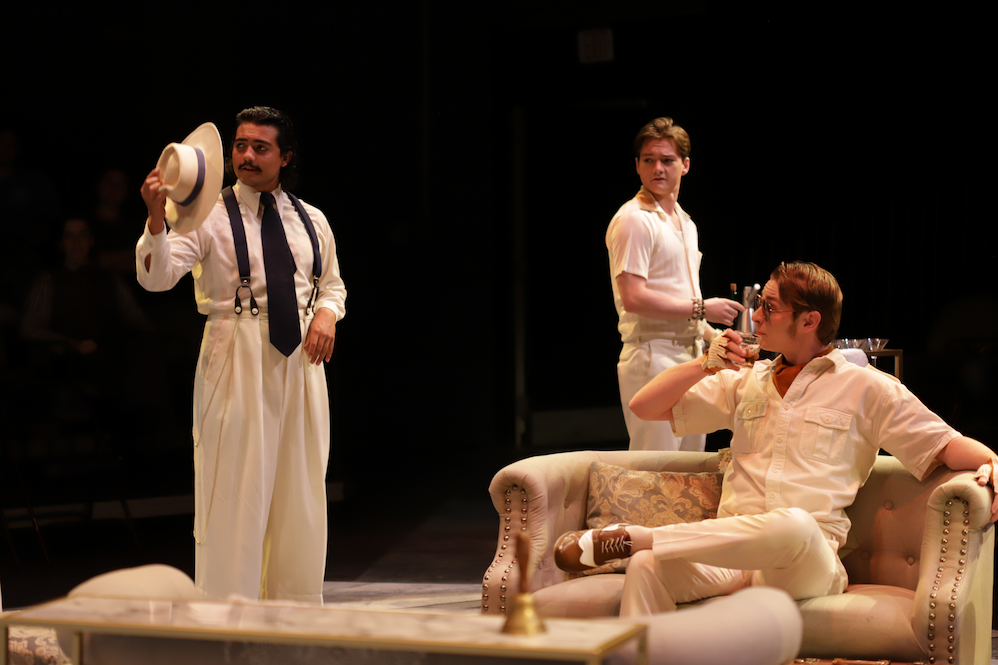
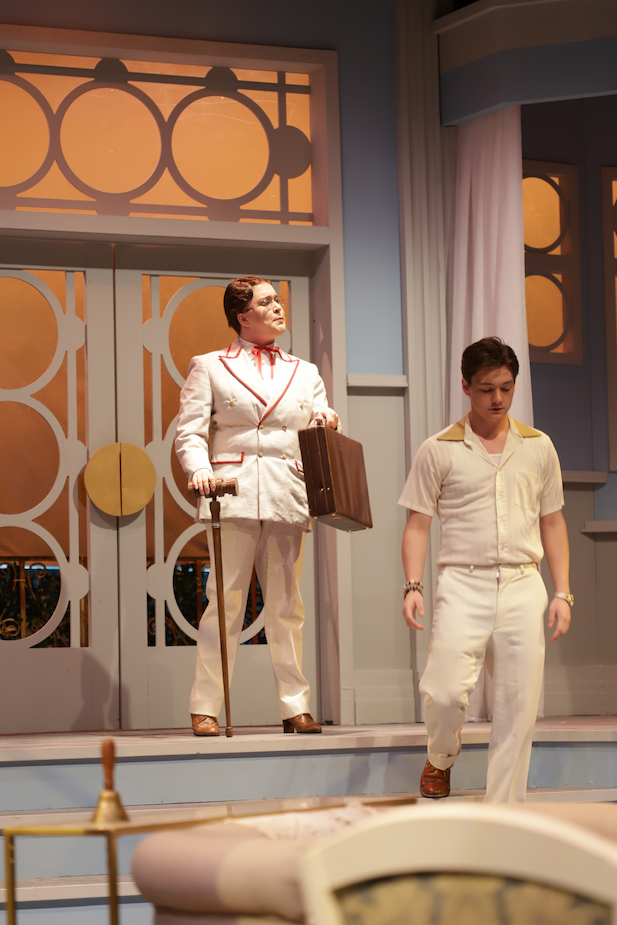
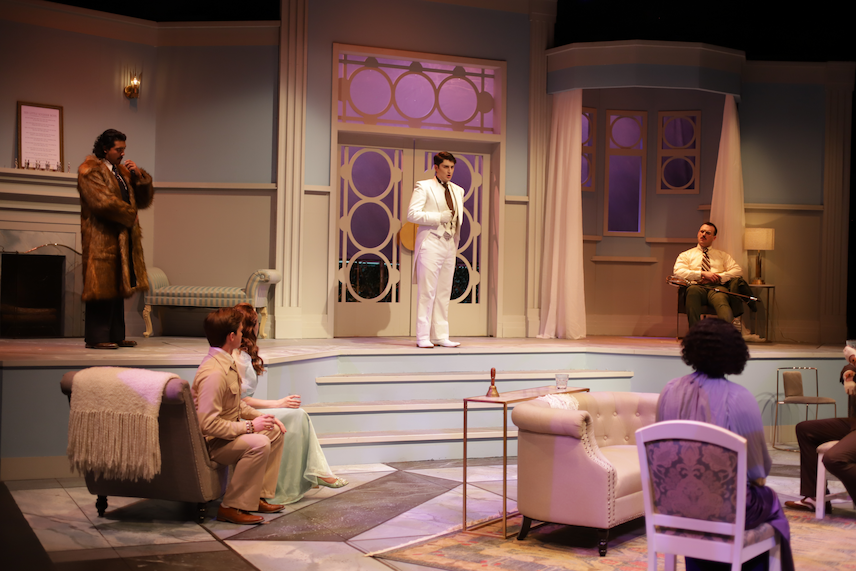
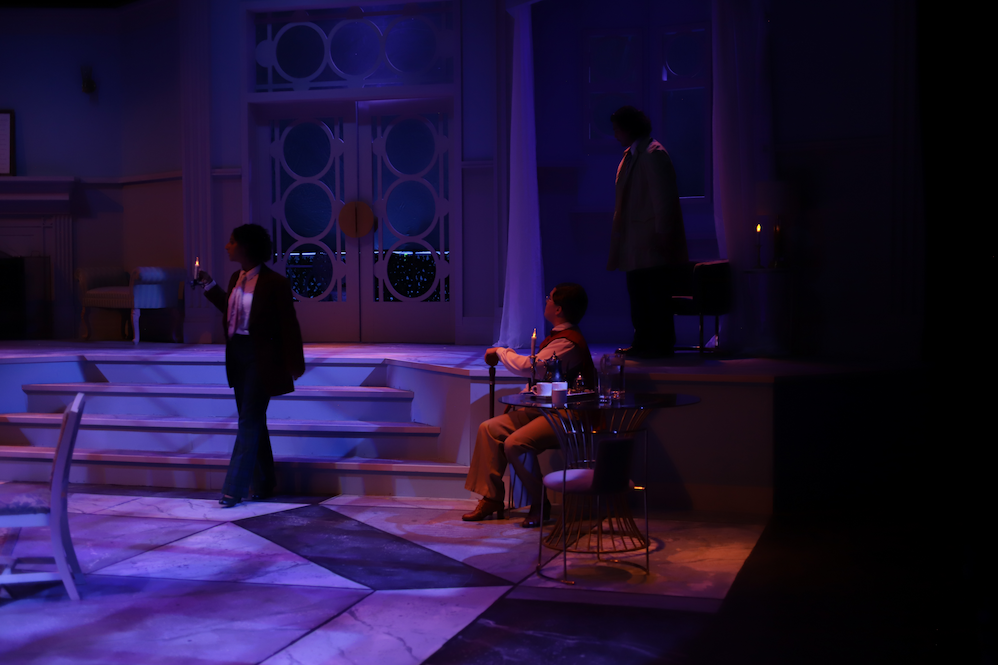
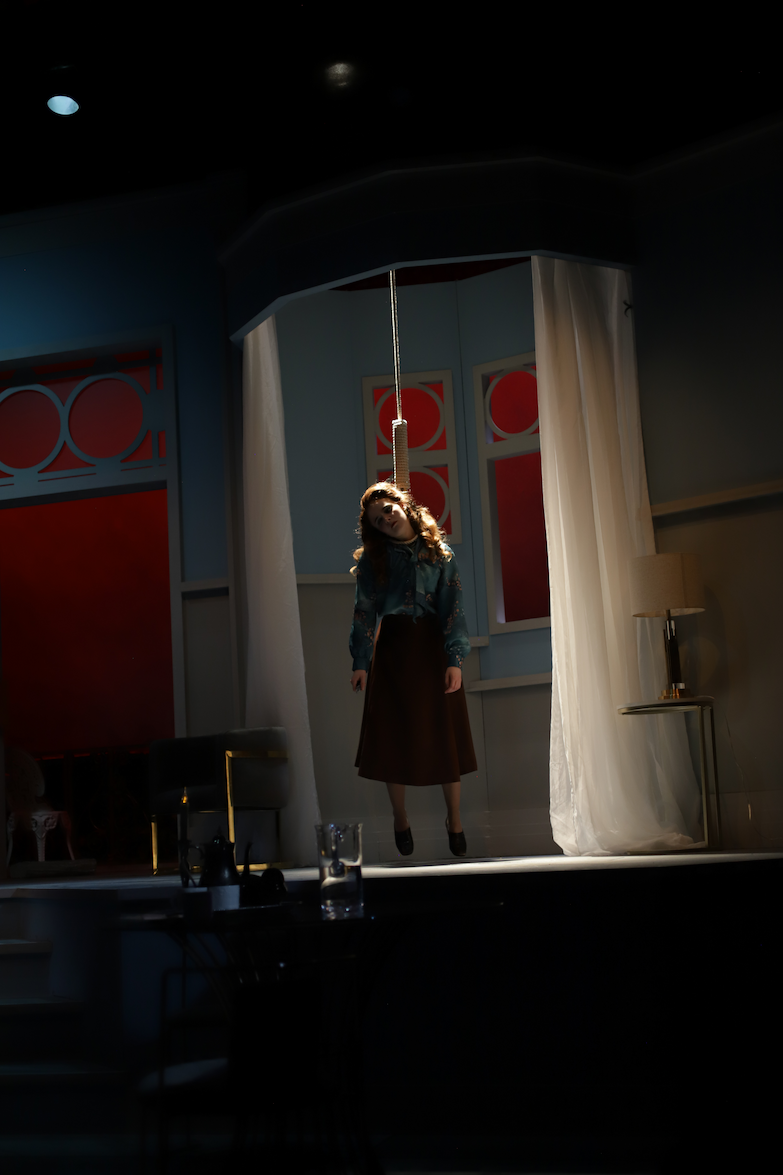
Disclaimer: The above image is fake, no one was harmed thanks to our Technical Director
Matthew McKinney.
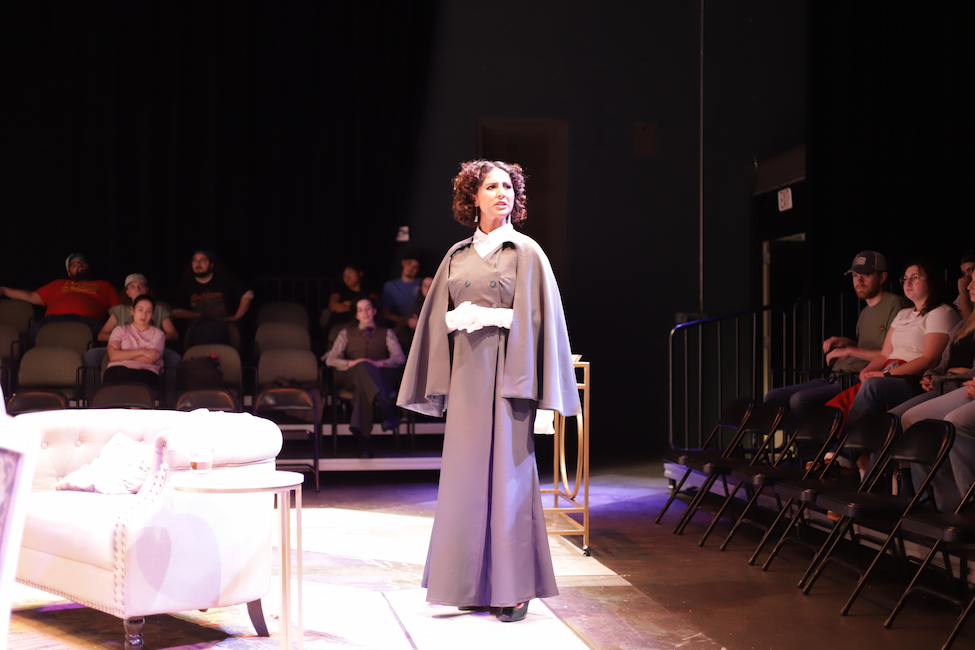

UNT’s production of And Then There Were None by Agatha Christie played five sold out shows from October 2nd-5th in the Studio Theatre. As the first main stage production of the fall semester, the diligence of our shop staff, faculty, and designers was instrumental in the success of the production. The show was a blend of technical elements, from developing the multi-leveled set to creating up to five costume looks per character, the designers were hard at work at creating the murderous mystery of the Soldier Island resort.
The costume designer for And Then There Were None, Jordan Rodriquez, graduated with his Theatre Design bachelor’s at UNT in 2021 and is back to pursue an interior design degree in the College of Visual Arts and Design. Since graduating with his Theatre Design degree, he has worked on various costume design projects such as Kinky Boots at Uptown Players in Dallas, Trip to Bountiful at the Cumberland Playhouse in Tennessee, as well as a new immersive theatre piece called Theatre of the Mind in Colorado. His achievements have bounced all over the country, and we are delighted to have him designing for us once again.
Jordan begins his design process by reading the script and researching the historical context. After completing primary research, he meets with the director to get a read on the feeling they want each character to evoke. In costume design, a word like flirty or conservative is very evocative and can create a very clear silhouette and mood for each character and getting those descriptors from the director keeps the production team on the same page about what they want to achieve. From there, the design process goes through preliminary renderings, to final drawings, into the construction stage with the costume shop staff.
Jordan designed 30+ costume looks for the ten actors in the production. Most of the performers had several custom pieces, including several dresses that the shop patterned from scratch and sewed themselves, to altered pieces from the costume stock.
Each costume was thoughtfully chosen to represent the character’s crimes and (spoiler alert) their deaths. For example, Vera Claythorne’s signature color was seafoam green, a representation of the drowning of the child she was governess to, and many of her costumes had high collars to foreshadowing her hanging at the end of the play. These small details are some of Jordan’s favorite design elements; even though some are as small as a necktie, each is indicative of a character trait that reveals itself through the way they dress. These easter eggs may not always be recognized by the audience, but when the audience does notice the details, it becomes an extra treat for the viewer.
One of the largest challenges to overcome in the production (not just for costumes) was Vera’s harness at the end of the play. Hanging someone onstage in a safe manner takes a village, and for the costume design team, it was a unique challenge to mask the harness and rigging which created the effect of the hanging. The creative and technical team of Jordan, Professor Matthew McKinney, and Director Lisa Devine took on the challenge of creating the illusion of the hanging with costume, lights, rigging, and blocking. The challenge was great, but with a combination of costume layering, wig styling, and fabric masking for the carabiner from which the actor hung, the team was able to successfully and safely hang the last little “soldier boy” of And Then There Were None.
Another integral part of the success of the production was the set design created by Ethan Kaye, a transfer student from Collin College. And Then There Were None was his first show as a designer at UNT. Previously, he designed Shakespeare’s A Winter’s Tale at Collin College in a tennis court style with audience seated on two sides.
Ethan’s design process starts similarly to Jordan—by first reading the script and researching the time period. After the initial read and research, conversations with the director aid in developing the design concepts for the set. For this production, the design team went with a trendy (for the time period) Art Deco style that uses brightness to lure the audience into a false sense of comfort despite the dark tone of the play.
Ethan thoroughly enjoyed researching and exploring the eccentric style of Art Deco, which plays heavily with line and shape in the structures. Ethan displays circles throughout his design with an eye-catching and significant element being the doors at the center of the platform. The doors are the entrance for all the characters, and the circles on the doors are representative of the circle of life, and in this case, the beginning of the end for the characters.
He enjoyed playing with the geometric shapes within his design. His favorite design element was the hand painted floor with a huge vintage tile pattern. Due to the play taking place in only one room, he went through four drafts in his design process before deciding on the design we saw on stage.
Ethan will be an assistant designer under Professor Donna Marquet for our upcoming production of Merrily We Roll Along in the spring as his final project at UNT. After graduation, he plans to work in educational theatre as a Technical Director in a high school. He plans to continue his design work while teaching and hopes to someday work on a touring or Broadway production.
Of course, these two incredible designers are just two pieces of the machine that
it takes to put on a theatre production. Alongside them were student designers such
as Makeup Designer Sophia Anderson, Sound Designers Noah Clark and Corsin Sikora,
Props Master/Designer Roman Marr, and Rigging/Harness Specialist Sydnay Lewellen—not
to mention the many lab student hands that went towards building the set and costumes
through the scenic and costume shops. Collaborating with so many artists to bring
Soldier Island and Director Lisa Devine’s vision to fruition was no small feat, and
thanks to the tireless work of our students and faculty, we were able to perform five successful
and sold out shows for our audiences here at UNT.
Written by Carver Olson
Photos by Rebecca Ramos
Redefining Movement: Shifts in the Dance Minor Curriculum
An exciting shift in curriculum was made to the dance minor! Between the inclusion
of a plethora of new courses and the introduction of four certificates to earn in
tandem with your degree, Dance@UNT has your best interest in mind. So, if you are
a seasoned dancer interested in continuing your dance education throughout your residency
at UNT or an active student interested in beginning your dance education, do not hesitate
to take the amazing opportunity presented.
Professors Whitney Geldon and Reyna Mondragon, full-time dance faculty in the Department of Dance and Theatre, have expressed their enthusiasm for the curriculum transition. Throughout their experiences as instructors at UNT, they have always considered what is in the students’ best interest, especially during and through the pandemic, which was a transitionary period in itself. Over the past five years, their priorities are “to better facilitate the interest in dance across the university [..] because there are so many individuals interested in dance,” which allowed them to open classes to any UNT student, and any student can declare a dance minor.
The new courses offered for the curriculum will take effect in Fall 2026. The catalogue is diverse and presents a well-rounded education and experience for those interested in one or all aspects of dance. Some courses include Arts Entrepreneurship, Choreographic Methods and Design, Strength and Conditioning for Performance, Dance and Drill, and Commercial Dance. These courses offer cross-disciplinary training that prepares dancers for professional environments. With these courses, foundational to advanced technique classes in various styles (i.e. ballet, contemporary, jazz, tap, hip-hop, etc.) will be offered in congruency. “We want to make sure that all techniques are valued at the same level because they are so important,” says Professor Mondragon. As for the certificates, dancers have the opportunity to be certified in choreography and performance, dance studio teaching, dance wellness, and dance team performance. Whether you are a current student or alumni, you still have the opportunity to further your knowledge in dance education through a certificate. Each course and certificate is curated to develop the skills it takes to build dance knowledge. The well-rounded curriculum that Dance@UNT presents assists in building knowledge that is universally applicable.
The diverse curriculum at Dance@UNT is there to support the diverse cohort of students that are engaged with the program. Professor Mondragon states, “[Our program] is to speak to anybody and everybody who [is] interested in trying something new, in being challenged, but also considering what can be done with dance in the real world.” Dance@UNT focuses on student development, community, and inclusion. “Anybody can identify themselves in a part of the program [and] part of the minor here. Whether you want to get a certificate or you want to learn about dance or you want to find your joy within dance again. It [is] unique to that.” Anyone can dance and are especially welcome at UNT.
Especially for post-graduates, the minor directly supports a career in dance. The curriculum supports “creative thinkers” and “passionate people who want to invest in themselves,” says Professor Geldon. “We want to support not only curating that but supporting students’ experiences to gain those skills—whether it be the discipline, that creativity or teamwork, [or] strong communication skills [...] to not only prepare themselves but be present in themselves.” The skills dancers gain from pursuing the dance minor at UNT are beneficial to the variety of fields in dance and beyond the dance community in other careers.
When I was applying to dance programs as a senior in high school, I knew I was immediately drawn to UNT’s diverse and well-rounded program. Now, as a senior dance student at UNT, I have built community and relationships with the dancers and professors through the diverse courses. I have taken courses in styles that I am familiar with and have enjoyed exploring other styles that I am unfamiliar with. My knowledge has expanded through the theory courses, and my passion continuously grows for dance because of the dance program at UNT. The professors have curated a supportive and encouraging environment, and I have many connections to take with me post-graduation as I explore my career in dance.
Ultimately, the shift in the dance minor’s curriculum at UNT is an exciting approach
to dance education. As Professor Mondragon claims, “If you want to be taken out of
your comfort zone, this is the place for you.” Adding a dance minor and/or a certificate
in conjunction with your studies at UNT is beneficial in understanding how dance supports
other subjects; dance is not strictly physical—it is an athletic art that allows one
to critically think. The courses at Dance@UNT will challenge your thinking and stimulate
your mind to contribute to your success in a career in dance or beyond.
Written by Ava Townsley

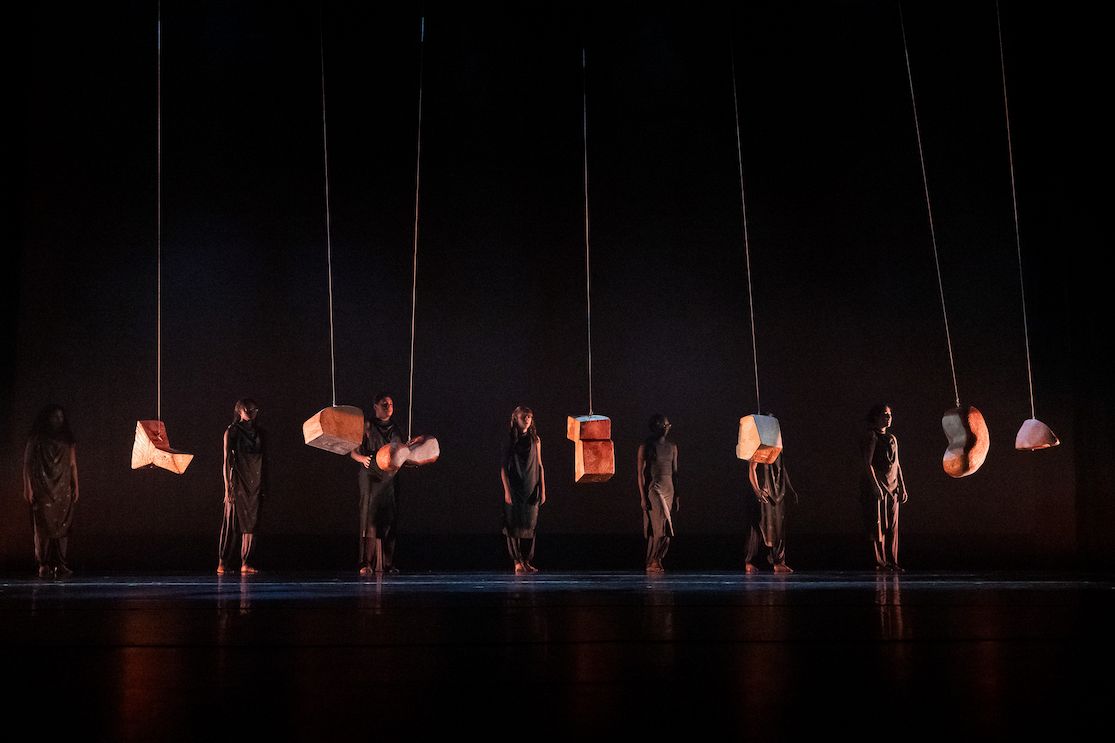



Shakespeare at UNT: Connecting with Today’s Performers
For many performers, approaching Shakespeare can be jarring, like there’s a language barrier between us and the bard despite Shakespeare being the primary writer of modern English, as well as being credited with over 1700 words we use today. The challenge of connecting the words of nearly 500 years ago to our modern lived experiences requires openness to new techniques. Sarah Rutan, acting professor and Shakespeare mega-fan, is a master of interpreting the Stratford-Upon-Avon born playwright.
Over the summer, Sarah taught an intimate, two-week intensive course on Shakespeare technique. Among the students in attendance, there was a diversity of acting experience, path of study and familiarity with Shakespeare’s work. The intensive started with a crash course on Shakespeare’s life, his works, and terminology essential to Shakespeare technique. With five students in the workshop, the two weeks of the course were ample time to really dig in deep into the material. Sarah compiled a list of 10 great Shakespeare characters, and the performers chose 3-4 monologues of a character.
For example, senior year student Charlie Lange worked on the character of Queen Margaret from the Henry VI trilogy and Richard III, creating a devised one-person performance of Queen Margaret. Each student got to dive into their character at different points of the play, developing the character from the beginning to the end of their story. Some other characters included in workshop were Puck from A Midsummer Night’s Dream, Hamlet from Hamlet, Lady Macbeth from Macbeth, and Coriolanus from Coriolanus.
Of the techniques explored in the workshop, Sarah found that tablework with the primary, secondary, and tertiary breakdowns of her Breakdown Packet helped understand the language and how to use it. Sarah also uses the same Breakdown Packet in her Shakespeare Acting class as the first step in each project of the semester. The Breakdown Packet has three parts—the primary, secondary, and tertiary breakdown. The primary breakdown begins with identifying the ultimate operatives or the last word of each verse line. The secondary breakdown takes the ultimate operatives and redefines them, replacing the words with synonyms to help the actor understand the text. Finally, the tertiary breakdown is similar to a standard actor sheet, including marking beats, tactics, and punctuation.
Another successful technique was approaching Shakespeare by reading it aloud to work out any kinks in understanding it straight off the page. A common saying among Shakespeare performers is that Shakespeare’s work is meant to be heard, not to be read. When rehearsing Shakespeare, getting it on its feet is essential to the actor so that they can embody the character and amplify the words of the text.
Shakespeare is timeless due to his clever writing and his storytelling of the human experience. His work can feel musical with rhythms and beats that connect his words to the listener’s ear. For Sarah, teaching Shakespeare and connecting students with the work has gotten easier due to the popularity of rap music and changes in colloquial speech due to social media. She says, “People are so much more open to this type of language than they were even 20 years ago. Language and rhythm being used to sort of play with people, like the way Kendrick Lamar uses language, the way Eminem uses language, the way Taylor Swift uses language. It's more automatopoetic. It's alliterative, it's figurative.” Sarah enjoys making new connections to Shakespeare in modern times with today’s students. In Shakespeare courses, she’s keeping us engaged with anything from Minecraft to Marvel to Nicki Minaj.
Sarah has a deep history with Shakespeare and loves his work for his language and his attention to the human condition. She especially enjoys the complex, flawed, and powerful female characters in his plays. The diversity of characters in Shakespeare’s work gives modern performers so much to play with. In addition, modern casting culture within Shakespeare means very few roles are off the table for actors. With Shakespeare concepts getting bolder and more interesting, Shakespeare can be just about anything, performed by anyone.
Shakespeare is just like realism—just in a poetic form. The stories are universal, and Shakespeare’s plays are often rewritten into some of our favorite modern films, such as She’s the Man, Gnomeo and Juliet, and Anybody but You. Once the actor gets over the hump of language, there’s so much room for exploration of the human condition.
Sarah plans to continue the summer Shakespeare workshop, possibly with focuses on
Shakespeare’s musicality or Shakespeare’s clowns and comedies. Sarah’s biggest tip
for Shakespeare is to stay grounded and fully embody the character from the tips of
your toes to the hairs on your head. If you’re interested in performing Shakespeare,
consider taking Sarah’s THEA 4140: Acting Shakespeare class or auditioning for our
upcoming production of The Tempest!
Written by Carver Olson
Summer Fun at the Momentum Dance Intensive!
This past summer, the University of North Texas (UNT) Department of Dance and Theatre hosted their first annual Momentum Dance Intensive! Over the course of two weeks, high school and collegiate students from the Dallas/Fort Worth metroplex joined Dance@UNT to train and grow in movement and community.
Annali Potter, senior dance student at UNT, played a significant role in the production of the intensive. She assisted with the general classes and supported Professor Reyna Mondragon’s performance work and the ensemble piece. She thought that “the intensive was both physically challenging and mentally stimulating.” She expressed her great experience in building relationships and dancing with the other participants. She especially enjoyed the interaction with the high school students, introducing them to the community of collegiate dance and collaborating with them in performance. She shared her personal experiences and knowledge with the other participants, since she was also “more familiar with [Professors Whitney Geldon and Reyna Mondragon’s] styles, so [she] was grateful to have the opportunity to support the dancers.” Annali shared a similar experience to most of the students’ backgrounds in dance, being a studio-trained, competitive dancer, which enabled them to build strong relationships. She appreciated the challenge of each other through dialogue and movement.
Professor Jocelyn Schimpf, dance adjunct at UNT, also participated in the intensive, serving as a guest instructor. She taught strength and conditioning, which focused on cardio and strength training, and modern/contemporary for one day of the intensive. As an instructor, she witnessed different experienced movers in the course, so “it was neat to see how they engaged and [tracked] full-body movement.” The classes consisted of floor-work, center phrases, across-the-floor combinations, brainteasers, inversions, and phrasing. She described her class as “dynamic” with a “challenging balance.” Jocelyn's field-of-study and niche expertise is in dance science, so her conditioning was anatomically focused. “As a teacher, when you come in and do not know the movers, you have to be adaptable in how you teach—how you adjust your cues verbally and as a mover and [how to] be able to respond to how the students are engaging with you. I could tell these movers were eager to be there—they were really excited to just learn material regardless of what it was.” Engagement is a priority for Jocelyn, and the students successfully persevered through the challenges that she presented. From a pedagogical perspective, she often asks herself, “How can I make a connection? What am I doing as a teacher to make an impact? How are we having fun?” It is safe to say that the cohort was enjoying and engaging with the movement thanks to the community that Jocelyn brought to the intensive.
After experiencing the intensive, Annali thought that the “range of classes offered supported not only a variety of styles but also covered a spectrum of college-level dance experiences.” She also enjoyed the performance aspect of each day. “The dancers were able to experience the audition process, working in small groups, working in large groups, and [the] choreographic process of both Professors Mondragon and Geldon.” They also had the opportunity to experience the technical aspect of performing, experiencing the behind-the-scenes of a live performance, including spacing and lighting. “Which beyond a studio recital, many of [the students] had not had a close-up experience of how a show is put together.” Annali hopes that Dance@UNT can expand the staff and styles taught so the dancers get to utilize their versatility and experience some industry-level classes. Ultimately, for Annali, the Momentum Dance Intensive “provides a great balance of pushing physical limits and increasing awareness of various dance, choreographic, and [improvisational] practices.” Her favorite thing about Dance@UNT is the community that is built, which she finds continues “to grow to include anyone who joins us for dance events like the intensive!”
Similarly, Jocelyn wishes for the intensive to expand and expose students to more experiences and styles and training for career preparation and “the whole of the training body,” like elements of nutrition, sleep, and overall health for a body in constant motion. In a career sense, intensives can introduce prospective collegiate dancers to the different career routes and avenues of dance, like dance administration, teaching—especially at different levels—performing, and choreographing. There might be a focus on an intensive or a track for each dancer, including wellness activities. Jocelyn had the opportunity to experience intensives as well in her undergraduate studies. She attended the Los Angeles Contemporary Dance Company (LACDC) intensive as an undergraduate student. It was her first time to be independent, and she was “immersed in the culture.” There were tracks at the intensive, and Jocelyn chose the “contemporary-ballet” track in which she took classes like partnering and breath and repertoire. The way in which they built community was to have lunch together. Jocelyn says, “Hearing the experiences of other dancers was very eye-opening. If you go to an intensive, make the connections with the people that are there.” These are resources that help dancers grow not only professionally but as students. From student to teacher, Jocelyn approached the Momentum Dance Intensive with “a welcome and supportive environment [...] to make myself approachable.”
Jocelyn advises prospective students for the future intensives to not be weary and “just say yes.” These are classes for a reason to help students be prepared for their future. “We’re all trying to learn from each other, how we can share together. If you’re hungry for dance, we’re a loving community, safe supportive space, and that is one of the biggest things that UNT has to offer. We can challenge you and push you out of your comfort zone, but you don’t want to shy away from opportunities because you’re hesitant.”
The Momentum Dance Intensive hosted by Dance@UNT brings community and training that
is a unique experience and opportunity for prospective students for the collegiate
world of dance. It’s for dancers that want extra training and are eager to continue
their growth in their movement and career.
Written by Ava Townsley





UNT Theatre Takes Flight To London





The University of North Texas has many opportunities to study abroad, one of which is UNT Theatre’s Faculty Led London trip in the Maymester. London, and Europe as a whole, has a very different approach to theatre as an art form, and the culture of artistry is different in ways you might not expect from an American viewpoint of the theatre. Fifteen of our students experienced these differences and many general culture shocks this past summer.
From May 12th-May 30th, we saw 11 theatrical experiences as a group, ranging from plays in black box theatres, to historical auditoriums, to interactive performance art. Among the shows we saw were The Master Builder, a new play featuring Ewan McGregor, A Western concept Romeo & Juliet at the Globe, An Oak Tree, a new work by Tim Crouch, Dear England at the Olivier in the National Theatre, the play adaptation of My Neighbour Totoro, Titus Andronicus at the RSC in Stratford, 1536, a new play at the Almeida, Mrs. Warren’s Profession starring Imelda Staunton, an interactive experience called War of the Worlds, Here We Are by Stephen Sondheim at the National Theatre, as well as a visit to the Harry Potter Studios. The students also were given free time to see other shows in the West End and other theatres in London. Some of the shows seen by students on their own time were Stranger Things, Retrograde, Harry Potter and the Cursed Child, Cabaret at the Kit Kat Club, The Brightening Air, Hadestown, and many more.
A favorite among attendees was the play Dear England by James Graham, which we saw at the Olivier at The National Theatre. The biographical play follows Gareth Southgate, a disgraced former football player (aka soccer player for us Americans) in his new role and successes as the English football team coach. The play’s themes of sportsmanship, redefining masculinity, and cultural accountability were so poignant and powerfully represented that it moved us even though we had little knowledge of English football or English culture. The play’s themes made us feel so apart of the culture we were experiencing that we felt almost patriotic. The show was beautifully directed by Rupert Goold and was one of the first shows we saw. Dear England set a high standard and a new appreciation for English theatre—and by extension, culture—among the UNT students on the trip.
Though theatre was a major focus of the trip, we got to experience other facets of English culture. We went to museums, the Tower Bridge, St. Paul’s Cathedral, Borough Market, Big Ben, Stratford-Upon-Avon, Hampton Court, and many more historical places and landmarks. We also had a good amount of free time to explore London, and some students even took a trip to Brighton to spend a day by the seaside.
A major takeaway of the trip is the difference in theatre culture in the UK compared to American theatre values. Much of the theatre in London is subsidized, meaning that theatre art receives governmental funding to help keep the arts afloat. This is vastly different than American theatre culture, which is largely based in competition, private funding, and capitalistic structure. Theatre as an artform is extremely valuable in British culture, and with the help of public and private funding, such as the Arts Council of England, arts are celebrated and supported so that they can flourish. Theatre artists can truly play and try new ideas that have a chance to fail, knowing they will be supported financially.
Furthermore, many theatre buildings themselves are treated as community spaces. We saw firsthand at the National Theatre how the community utilizes the space, with many people filling the tables of the lobby to do homework, chat with friends, read books, and have lunch. The theatre is not only a performance space but an atmosphere of rest and work for the community to reside in. Theatre professionals as a whole are treated with less mystique than they are in the States, with theatre being seen as a regular job in Britain, much like service work.
We learned these lessons on theatre culture from various mentors in workshops. We met with Marina Caldarone, the author of the Actions: the Actor’s Thesaurus, a book on actioning or verbing a script for the actor. We learned her technique directly from her and got to pick her brain on some industry secrets and opinions on the shows we would see.
We had an intense fight workshop with Marcello Marascalchi, an actor, fight director, and stuntman for theatre and film across the world. In our workshop with him, we blended real fight techniques with scene work. He taught us fight safety, industry standards, and how to clean up our own fight work. Our final workshop was with speech and voice consultant, Tess Dignan. Tess had worked with the Globe as well as the Old Vic as a dialect and vocal coach. She taught us new techniques to become grounded in our bodies, as well as new exercises to find our vocal coloring.
Many of the students on the trip had never been to another country before. Some had never even left Texas. With scholarships, grants, and other financial aid, a group of our students were able to take advantage of opportunities that were not available to them previously. If the study abroad theatre trip to London excites you, there are scholarships available to you, such as the Gilman scholarship and the IEFS Award to help cover the costs of the trip. Get in contact with a study abroad advisor and start planning your trip early. The biggest tip the Summer 2025 class has is to explore—take all the opportunities you have, see shows outside of the ones on the calendar, spend your free weekends wisely, and consider exploring more of Europe after the end of the semester.
Within our own North Texan community, the world of theatre can feel very small. It’s
easy to get stuck in the bubble of familiarity and not branch out into new horizons.
Our trip to London revealed a new perspective, letting us explore and experience a
flourishing community of artists that see theatre in a different way. The mentorship
of Professor Marjorie Hayes and Emma Blundell of IES led to valuable experiences and
new skills that we, as upper classmen, intend to transfer into our own mentorship.
Written by Carver Olson
From Student to Staff: Eric Tinkler Takes Over the Scene Shop
Congratulations to Department of Dance and Theatre alumni Eric Tinkler for his promotion from student to staff! Eric is the new scene shop foreman, where he supervises and collaborates with the student employees in their efforts to build the sets for the theatre productions and maintain the labor of the shop and Radio, TV, Film, and Performing Arts building. As a close member of the Department of Dance and Theatre’s family, Eric manages the scene shop with pride.
Eric studied theatre at UNT prior to obtaining the position and was employed as a student under the previous shop supervisor until Eric was offered the job at alumni status; it required a bachelor’s degree in a relevant field, experience in the skillset, and a passion for the art—and that is exactly what Eric possessed.
His passion for scene work began in his years as a tween, wood- and metalworking in his garage. He describes himself as a “hands-on creative,” with a niche set of skills that often launches into a career of trade work. However, Eric found his love for theatre in high school and thought let’s see how far I can take it. His knowledge, experience, and zeal in this field of work is quite beneficial to his behind-the-scenes career in theatre, and he truly values the importance of effort and dedication that leads to success.
He is also interested in rigger work, which entails rope work, line sets, suspension, or anything that is hung in the air. Eric provided some career options and advice for students interested in the field. It requires networking and working at odd hours of the day. A nine to five? Try from two AM to seven AM. This crew prepares for more crew and cast before a show is set. Eric explains that “this field is less theatre and more entertainment as a whole.” From Las Vegas, to Chicago, to New York, live entertainment requires professional riggers to make the magic happen. Have you ever seen America’s Got Talent or Dancing with the Stars? Those shows require the work of riggers to appeal to audiences. Eric also provides a career option in megachurches, where they are known for their specialization in rigging. He also gives us an excited promotion for UNT’s upcoming theatre production And Then There Were None, where “there is going to be a stage gag that everyone is going to like.”
With this transition from student to staff, Eric has applied the same values from when he was a student that translates to the professional realm of theatre. Eric’s biggest piece of advice is to “show up and you have to show up every time. You need to not only have the skills but you need to communicate well that you have the skills… [and] opportunities will arise for you, as long as you can show somebody that you can do it. The hardest part in theatre is that you have to know somebody.” Integrity and communication are important values for Eric. He “[thinks] that one of the best parts of this department is that everyone knows somebody.” Eric credits Donna Marquet (Associate Department Chair, Principal Lecturer, and Theatre Advisor), Matthew McKinney (Technical Theatre Lecturer), and Laura Berrios (Stage Management Lecturer) for the connections in Dallas and across the country. Their extensive knowledge of the community engages the students and prepares them for success. Eric beamed, “These mentors and these people that really want to help you as a student can connect you further post-undergrad, and I think that is such a valuable part of this department.”
Eric has taken his experience within the department and from his mentors and now teaches his student employees similar values. In addition, he advised, “There are always solutions to problems—you just have to find them. Whether that’s researching it yourself, talking to advisors or peers or other coworkers or anything like that, there’s always a solution to a problem. You just don’t have all the right references for it. That’s a lot of what theatre is: taking a solution you had ten years ago for a very niche problem and modifying it slightly to get this other solution to a very niche problem and that kind of experience builds on itself… Building and learning from the past mistakes from other people is such a vital part of this.” As Eric interacts with student employees through daily encounters, he teaches them these values—his and others’ mistakes. That is what builds professionalism and prepares them for a career. This piece of advice is most definitely applicable to all aspects of life, and Eric has been such a great role model for students transitioning from learners to professional leaders. Every long night is the preamble for another great opportunity.
As a dancer, I knew that I had immense respect for the crew during productions and
performances, but after a great dialogue with Eric, I knew that my respect grew ten
times more than it already was. Every single person dressed in all black at a production
is such an integral part of a show, so the next time you watch a performance, look
up, notice the details. The set did not build itself.
Written by Ava Townsley
 Eric Tinkler 2024-2025 (Senior)
Eric Tinkler 2024-2025 (Senior)
A New Leaf: Introducing Our New Costuming Staff
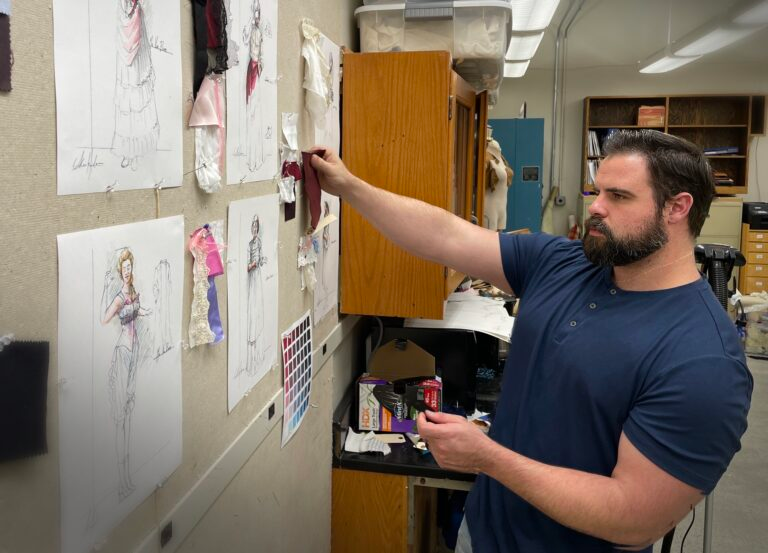
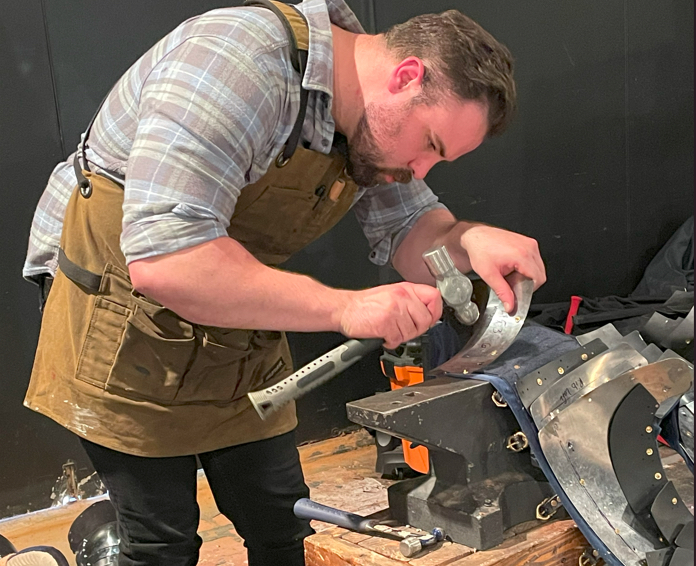

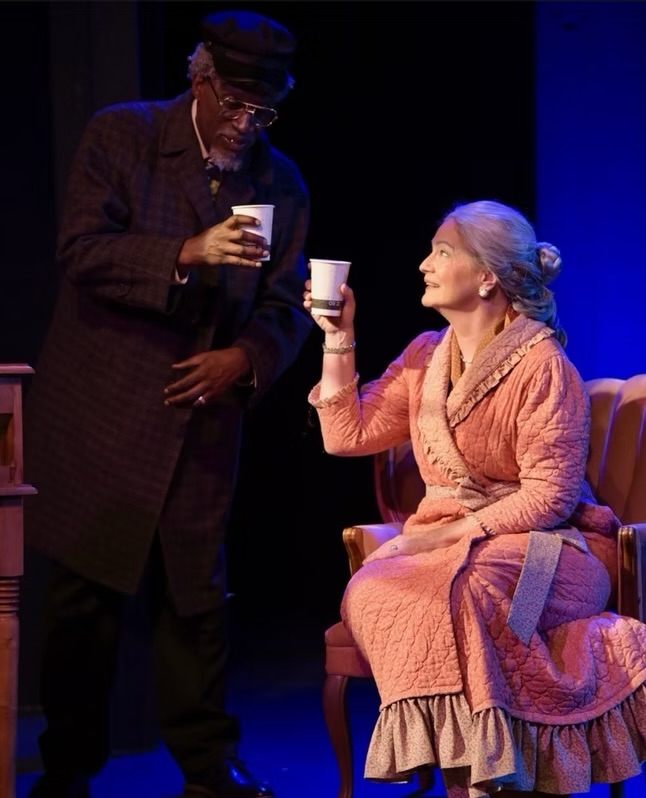
UNT Dance and Theatre has had quite a few staff changes implemented this year. From familiar faces moving into new roles to new faces entirely in certain positions, we have welcomed two lovely new professionals to the Mean Green Family, specifically in the costumes department.
Professor Alex Heder, our new costuming lecturer, is an exciting addition to the department with a vast catalogue of skills and specialties to pass on to our students. He received his BFA from Utah State University, King College of the Arts and got his MFA at the University of Tennessee Knoxville. He reminisced with me about his first teaching experiences and his eagerness to work with students. During his time in graduate school, he worked in regional theatre and taught as a part of his graduate studies, including mentoring design students with the Knoxville Children’s Theatre. When he wasn’t mentoring, he was giving seminars on specialized costume crafts and flying back home to Utah to teach about the theatre business and his experiences as a working artist.
Alex calls himself a “theatrical late bloomer.” He started out in university pursuing a different degree, trying different things, and then was pulled into theatre design, originally as a set designer due to previous construction experience. He was drawn into costume design due to his proficiency in thinking in terms of people and fabric. He loves to work on projects with unique design challenges, such as creating anthropomorphic creatures, puppets, and even armor.
An exciting thing about Alex is his knack for unique costuming skills, such as leather work, cobblery hat and mask creation, and even metal smithing. His favorite pieces to create are, without a doubt, armor. A self-proclaimed medieval buff, Alex has a passion for blacksmithery. With an actual forge of his own, he has created armor out of real metal that he’s learned to heat treat so that it can withstand blows from a real sword or axe.
Apart from his impressive resume of skills and abilities, Alex has a philosophy of understanding and uplifting people in both his own art and teaching. As a professor and artist, Alex strives to understand and honor people for their unique perspectives and challenges. As a design artist, he strives for projects that represent the human experience; as a teacher, he creates a workspace that grows with its students and meets them where they are.
Sarah Rosenkranz, our new costume shop manager, is the first shop manager to work on a show in our department since the costume shop move. Last semester, the shop staff moved the stock of costumes from the RTFP building basement to the Welch Street complex, right next to the Texas Fashion Collection.
Sarah received her BFA from University of Texas at Arlington and started out as a nursing major before getting tugged in by the theatre siren song, much like Alex. She received her MFA from Texas State, citing her mentors as the ones who kept her going.
Before UNT, Sarah worked with Maples Repertory Theatre, a summer stock theatre in Missouri, for the past two summers. As a recent graduate, Sarah cherishes Maple Repertory for its open arms as her first theatre job out of school, as well as its unique location and great community.
As a young professional, Sarah is eager to grow and develop her mentorship abilities in her first university level position. She is grateful for the welcoming community and the help of her new colleagues in acclimating her to UNT.
A goal of Sarah’s is to encourage students to take the leap and get themselves out there as artists. Each design category is a mechanism with many parts and responsibilities, and the best way to understand them—and eventually find your niche—is to get to work and try it out. She wants to be a teacher and mentor that creates a space to play, imagine, and practice skills that can lead to discovering a new love in the world of costuming.
Both Sarah and Alex are hard at work as shop manager and design mentor respectively for our upcoming production of And Then There Were None by Agatha Christie. Come support them and their costume shop staff this October! We are excited to experience their work and see the lasting impact their skills and mentorship philosophies will have on our department.
As changes happen throughout the department, Alex and Sarah are both invigorating
additions to the program. Infectiously passionate, both are consummate professionals
with progressive design philosophies and approaches to mentorship. Both are truly
thrilled to work with our students and pass on their knowledge and hope to make deep
roots in our department. Change can be very scary— especially as students and university
staff— but the changes that Alex and Sarah bring are welcomed. The costume department
is turning a new leaf under their care. We hope they make a home here at the Dance
and Theatre department for semesters to come.
Written by Carber Olson
Student Spotlight: Dance and Theatre’s Student Reporters
The UNT Department of Dance and Theatre welcomed two new student reporters this semester to spotlight the creative work of students and faculty. As the spring semester comes to a close, we reflect on the stories and experiences captured in our articles. From delving into the artistic process of student directed plays to outlining the ways in which theater skills transfer beyond the stage, our student reporters illuminated the exciting and unique work of the department and what makes it so special. For the final article of the semester, I want to shine the spotlight on the reporters that have worked hard to uplift UNT Dance and Theatre in more ways than one. Carver Olson and Wendy Schwartz stepped into this newly created role and built the reporter team from the ground up. Both theatre majors, they offered an insider’s perspective into the inner workings of Dance and Theatre. Though more importantly, they conveyed and represented the passion and hard work of the department through their own sense of curiosity and love of the craft.
Though their pathways into theatre differ, Carver and Wendy both value theatre for its holistic training that lends itself to adaptability. Taking on the various roles of directing, acting, and stage management, Carver and Wendy are multifaceted artists. Most recently, both were involved in the department’s production of Cabaret with Carver in the acting role of Herr Schultz and Wendy as the stage manager. Their roles, along with the incredible cast and crew, contributed to the immense success of the show. Coincidentally, Cabaret is one of their favorite productions in which they’ve taken part. But what they really enjoy about our department is the opportunity to explore the different avenues that exist within theatre. Though stage managing Cabaret is one of Wendy’s proudest moments, she is also impacted by the acting classes she took from Professor Bob Hess. She appreciated the rigor of the classes and feels that she deepened her understanding and respect for actors, something she will take with her as she continues in her technical theatre roles. Carver also expressed pride in being in Cabaret since it’s one of his favorite musicals, but he is also influenced by an experience he had during his first year performing in Elephant’s Graveyard. This was the first production in which he experienced consent-based directing, which was further explored in Professor Nathan Autrey’s courses. Consent-based directing was a perspective that was transformative for Carver, especially when dealing with emotionally taxing roles.
In listening to their experiences, I could see how each role within theatre connects and impacts another, furthering their versatility and adaptability to creative challenges that naturally arise. In fact, the interconnectedness of roles and community were brought up by Wendy and Carver often; it was a sense of community that brought them to theatre, and the feeling of community that invites them to stay. Wendy says, “it’s so interesting to see people go into a show not knowing anyone and then coming out of it [as] close friends.” The community support of faculty and students drive Carver to create new work and maintain a love of learning, curiosity, and desire to experience something new. He also speaks about the communication skills of artists, which contribute to a strong community. “We’re able to communicate properly, and we have a common goal. I just feel like that’s what makes it so special.” Similarly, Wendy appreciates the mentality of “the show must go on” because everyone must work—and want to work—together to make the show successful. She says, “I like working with passionate people who love and respect the craft as much as I do.”
As the editor for the reporters, the passion is evident. There is an enthusiasm and dedication present in both Wendy and Carver, which is representative of the department as a whole. Though it’s the end of the semester, Carver and Wendy will continue their craft into the summer. Wendy recently graduated on May 10 and was offered a concessions manager position at a theatre in Austin. She hopes to return to DFW after the job concludes to continue her career in stage management. Carver will be designing for a community theater and will also direct Gidion’s Knot in the fall. This is his first directing opportunity at UNT. Both students have contributed to the vibrant and fierce community that is UNT Dance and Theatre. With roots in such a strong community, their artistry will only continue to grow.
Written by Annalise Boydston
Photos by Rebecca Ramos
Photos by Wendy Schwartz
Check out Carver and Wendy’s stories here: https://danceandtheatre.unt.edu/spotlight.html
Congratulations to all UNT Dance and Theatre graduates!
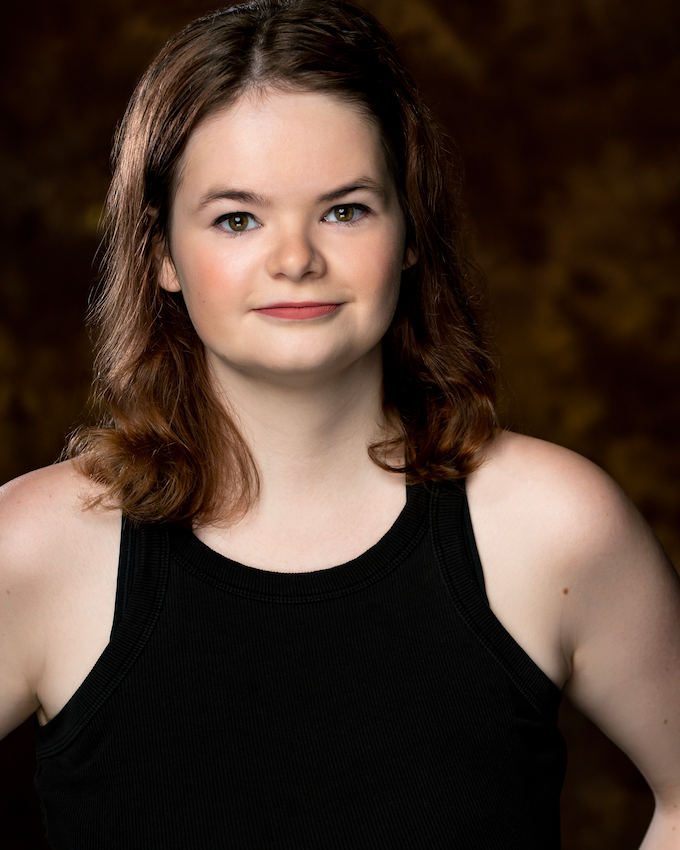

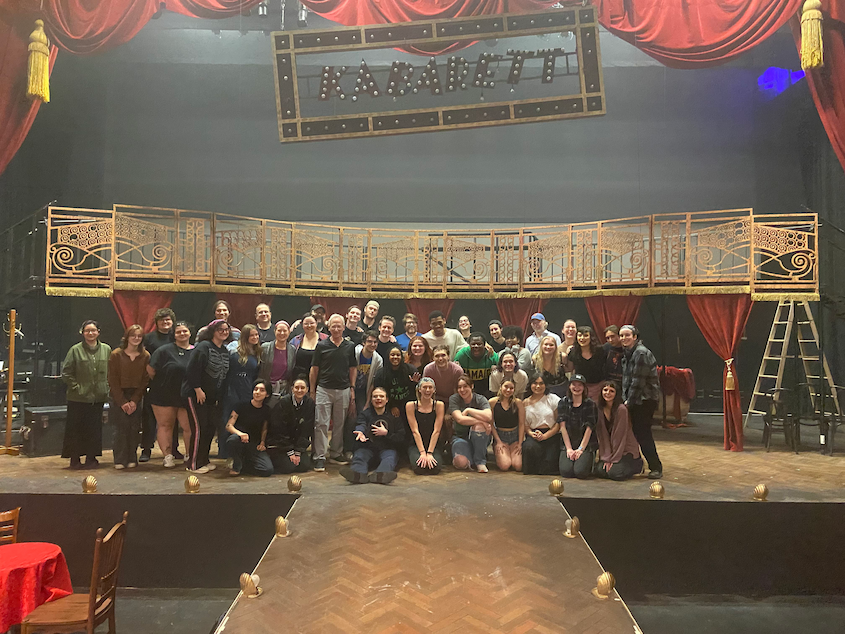
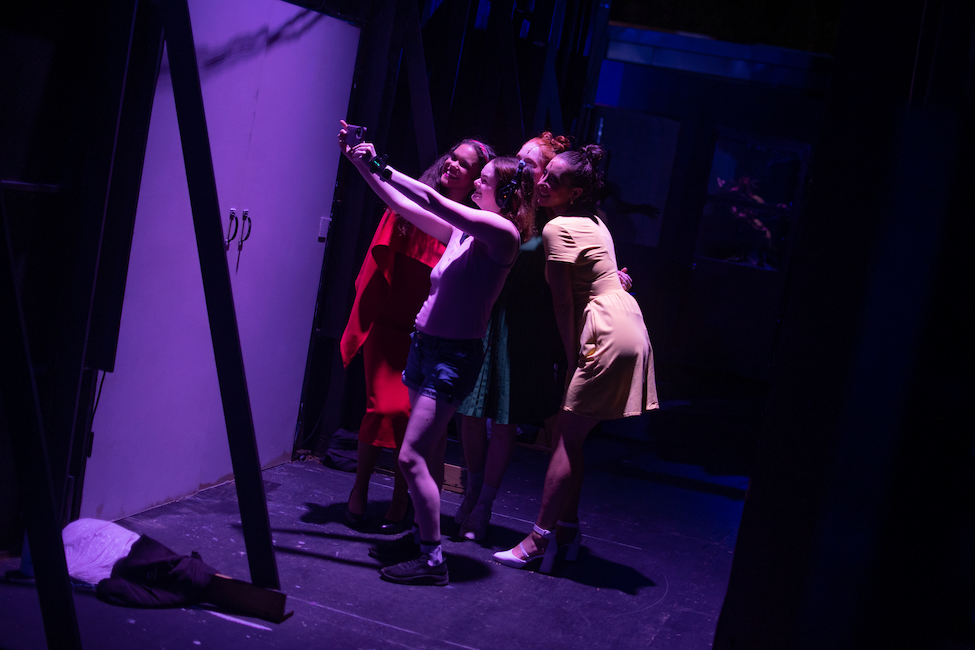
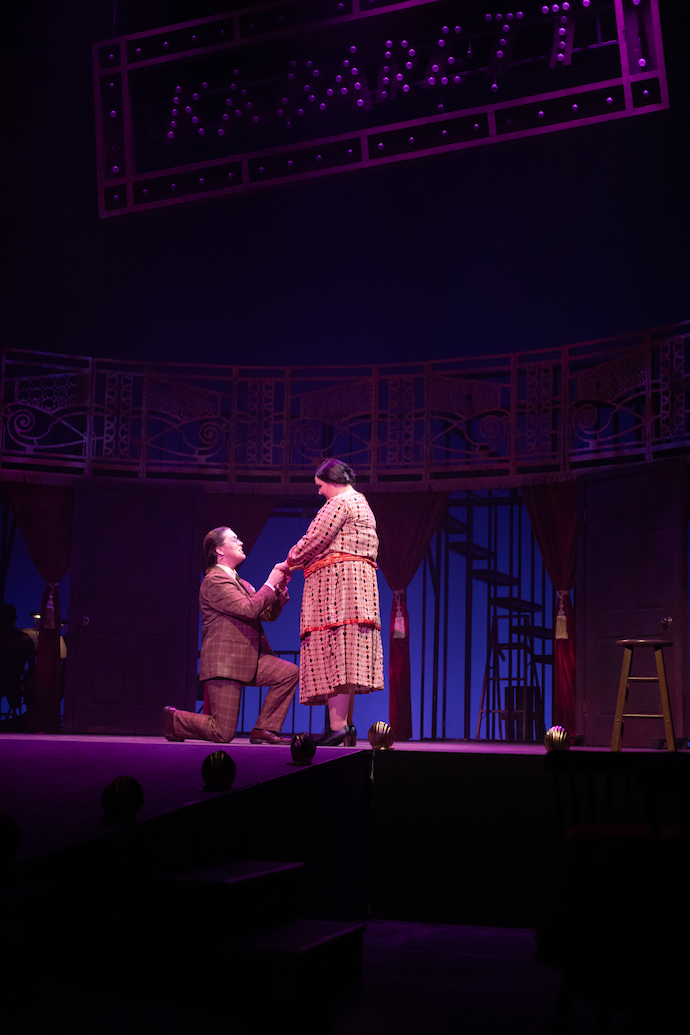
Welcome Home: Celebrating Nathan Autrey as Our New Directing Lecturer

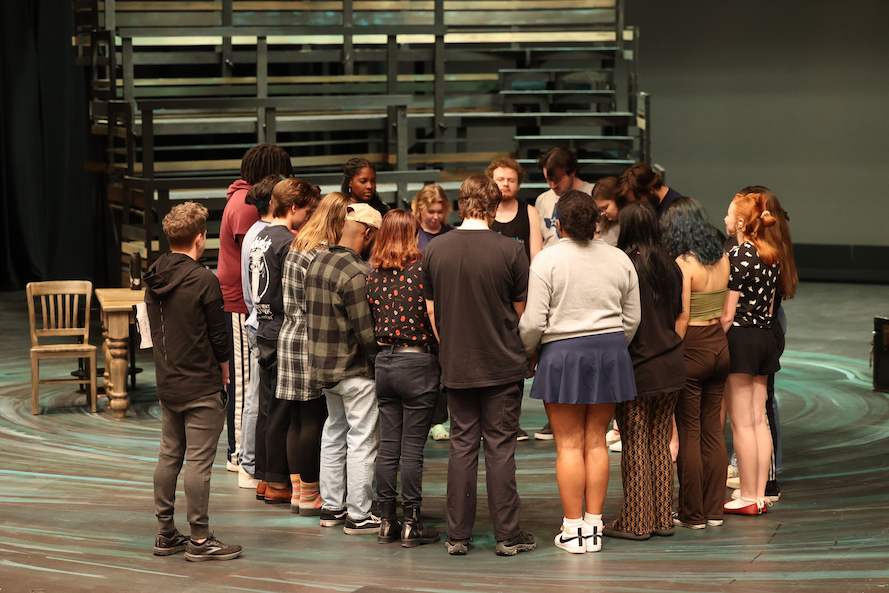
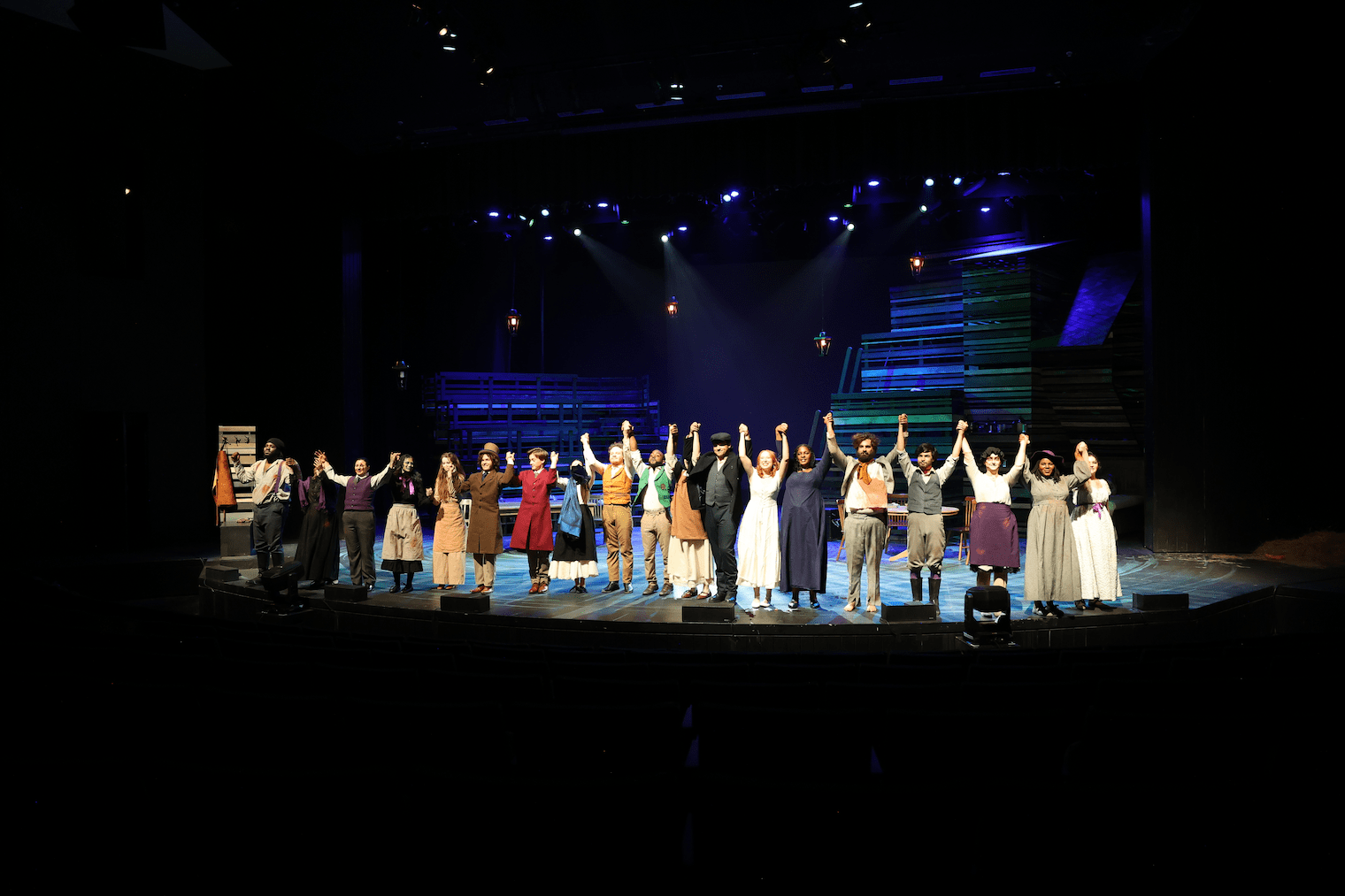 Anatomies cast- directed by Nathan Autrey Fall 2024
Anatomies cast- directed by Nathan Autrey Fall 2024Since 2021, Nathan Autrey has been serving the University of North Texas as an adjunct, director, and mentor. Nathan has been a huge part of our department, teaching several prerequisite courses for the Acting Concentration along with mentoring First Stage and Lab Series productions. Nathan has worked hard to educate, advocate for, and connect with the students in our department. We are so proud of his commitment to advancing the artistry of our students.
Nathan attended UNT in 2004 when the program offered a BFA in Acting. The program has changed extensively since he graduated, switching to a BA degree program. BFA programs are valued for their intensive focus on acting techniques and structured degree plans with the intent of producing technically superior performers fit to work in the industry. However, a potential downside to BFA programs lies in their regimented nature as there is very little room for branching out or learning skills outside the acting concentration. BA programs are more customizable, letting students choose their degree plan and giving them the choice to emphasize in a specialization or choose to study theatre in a broader sense. BA students have unique marketability because they have more avenues and more skills to demonstrate. Many students at UNT are given the opportunity to design, direct, and act, which is something that might be discouraged or impossible in a BFA program.
During Nathan’s time as a BFA Acting Major at UNT, he broke the mold and tried his hand at directing in his undergraduate education. “I really had to advocate for myself to take directing... The expectation was that I was just an actor.” Nathan encourages the philosophy that every theatre artist is working towards a broader understanding of their craft; he feels that he learned more and improved as a performer when he branched out to other fields of theatre such as directing.
Nathan moved on to get his MFA in Directing from the Actors Studio School of Drama at Pace University and is certified as an intimacy coordinator and fight choreographer. After graduate school, he worked in New York City with several Off-Broadway theatres as well as the Actors Studio. He is a member of the Stage Directors and Choreographers Union and the Society for American Fight Directors. This is on top of his already versatile list of skills, including artistic direction and producing.
Along with his Mean Green graduate status and his diverse professional experiences, Nathan has a consent-based directing philosophy that is a testament to his experiences as a professional in a changing profession. He believes that it takes the right person to strengthen a group of people so that they can feel comfortable and empowered to create. His goal in a production is not a perfect product but an environment where each actor can authentically communicate with the audience and each other. He believes a good director is someone who can put aside their ego and recognize when someone else has ideas in the room that can make a production better. These ideas also go into his teaching style. Nathan strives to create environments where artists, whether they’re a student or a professional actor, have a voice with which they can advocate for themselves.
Nathan is as excited as we are that he’s taking over the Directing Lecturer position. Nathan was a student of Marjorie’s during his time at UNT, and though they have very different directing styles, Nathan calls it a full-circle moment for himself. He says he had his realization that he was a director because of Marjorie Hayes, and he learned his fundamentals and beginning aesthetics in her classroom. He’s ecstatic about teaching in the same classroom where he found his passion. “I’m going to be in that room, the same room where I was so many years ago in that same spot, and I hope I can recognize in others, ‘hey, you’re a director.’” He feels empowered to take the program and hone it to train young directors in current industry standards and is excited to build on the foundation that Marjorie has created.
Going forward, Nathan urges students to take agency of their work and focus their passion on their craft. He believes that every theatre major should get involved—whether it's by auditioning or working behind the scenes—so that our relationships help our community flourish. If we, as students, use our voices to advocate for our needs, we will create a culture in which we take pride. “It’s yours too. And the future of it, the mark of it, is contingent on you—the student body—wanting everyone to be strong.”
Congratulations, Nathan! We are over the moon to welcome you home to UNT. We can’t wait for you to continue influencing our campus culture and spreading your passion for artistry and excellence in the Dance and Theatre department.
Written by Carver Olson
Faculty Promotion: Spotlighting Sarah Rutan, Full-Time Acting Professor
Congratulations to Sarah Rutan on her promotion to a full-time lecturer position! Having worked at UNT since 2017, Sarah has taught just about all the “base level” acting classes there are, including Voice, Movement, Acting Styles & Periods, and Shakespeare. We are very proud of Sarah and look to highlight her previous work as a performer and teacher.
For Sarah, theatre has always been a part of her life. Growing up in Idaho, she first discovered her passion for performance through Idaho Theatre for Youth. During a weekend afternoon, the students would become immersed in a story that their parents could then experience when the students were picked up. “I didn’t think much about it, even though I really loved storytelling and make believe and the whole thing. I was always very keen to do that—to play dress-up, to do all those things.”
Though Sarah enjoyed theatre, it was not the path she expected to take as she thought she would become a ballerina instead. Taking dance in school, it wasn’t until she tore both of her hamstrings in her freshman year of high school that she would then discover her love of theatre. “I ended up on crutches. I would get out of class early, go and get my lunch, and then I would crutch myself over to this little space I found where people would leave me alone.” Unknowingly, Sarah had discovered the theatre green room. Though she feared she would be kicked out by the theater teacher who often passed through, she was instead offered a role as Lady Montague and the Apothecary in Romeo and Juliet. “I did the play, and by that summer I was going to a theatre camp. By the fall, I was playing Anne Frank in The Diary of Anne Frank, and the rest is sort of history.”
Though dance was no longer at the forefront of Sarah’s career, she believes that having dance skills made her more marketable in her early career. When working on Romeo and Juliet at an Oregon Shakespeare Festival, Sarah was given a dance captain role because of her background in dance despite only being in the ensemble. During one of her first costume fittings, the designer asked if she had any experience in dance given the way she moved in her dress. She replied that she was once a ballerina and had also taught ballroom dance in college. In rehearsal the following day, Sarah was approached by the director and asked if she would create some choreography to which she agreed. This led Sarah to become Dance Captain for almost every other show she has been in. She says, “My movement background has really done something that’s helped me as an actor, in more ways than I could’ve thought.”
Alongside performance, teaching has also been a big part of Sarah’s life. With the rest of her family working as teachers and principals in her small hometown, it was only fit that Sarah would go down a similar path. After working in Los Angeles teaching at a Shakespeare festival, Sarah was asked by another teacher if she would consider applying to work at UCLA to teach Shakespeare. Unfortunately, Sarah couldn’t apply because she didn’t have her master’s degree. Encouraged to pursue a master’s, Sarah applied to the University Resident Theatre Association (URTA) and received an offer from SMU for a full ride with teaching opportunities. After graduating with an MFA in 2017, she found herself in a show with UNT adjunct Bob Hess who recommended her to apply as an adjunct for UNT. She agreed, and the rest is history.
While both are technically faculty, adjuncts and full-time professors are on different contracts. Adjuncts are on semester-by-semester contracts while full-time faculty have longer contracts that generally offer more stability. They also get to be a part of the faculty meetings. Sarah explains, “I’m already having meetings about what classes can help facilitate students through a pipeline. What are the skillsets we need to make sure they learn in fundamentals to be successful as they move through [the program]? How can their first day here create one of the greatest theatrical educational experiences possible?”
With her now full-time status, Sarah hopes she can pitch some new upper-level classes as well as build on current classes. Though it would be further down the road, one class she would love to offer is a dance class for actors. “I think there needs to be a partner dance class. I think we need to teach people to move in tandem, whether it’s old school waltz or tango or just contact improv.” She says that dance classes can offer a space to explore the give and take of weight as well as discussions of consent that are necessary to move together with someone else. Sarah feels that her work as a dancer has really helped impact her work as an actor and thinks that other performance students could benefit from something similar.
Though Sarah has taught many different types of performance classes, her teaching method can be boiled down into three “pillars”: empathy, curiosity, and technique. “If you can get those three things, then the world is your oyster. But all of that requires an actor to show up and be willing to have done their homework and be willing to see what else happens.” Sarah strives for her students to make discoveries in class and to not get bogged down in whether a certain choice was right or wrong. Every actor has their own method and ideas to bring to the table, which she discovered in her years of Shakespeare work. “If there was a right way and a wrong way to do it, and if there was a certain way it had to be done, why are we still performing the plays 450 years later? The new people are the new thing. It’s not that I want to see Hamlet, it’s that I want to see your Hamlet.” Bringing yourself and any fears, insecurities, and curiosity is all Sarah wants from her students. She asks them to have the curiosity and empathy for the characters and the story and use their technique to build the structure of the work.
Along with her students, Sarah finds herself continuously learning new things through her work as a performer. In a profession that calls for all sorts of skills, she never backs down from learning something new. “I got to do a film where I played a woman who was a cake maker, so guess who learned how to decorate a cake?” In another role, she was asked if she knew how to dive into a pool. Despite not knowing, she said she could; she consequently spent two months before the start of filming teaching herself how to dive. The challenge of learning new skills is a vital aspect that keeps Sarah inspired and passionate about her work. “To me, death is me figuring out my job and then having to do the same thing for the rest of my life.”
Sarah is thrilled to continue her work at UNT under a new full-time contract and to work with both returning and incoming students who take her classes. Through her experience, Sarah advises her students to bring themselves. “Who you are, how you are, what you are… We just ask if you have passion for this to bring it with you. Try not to be your own ‘no’, be your own ‘yes.’ You chose this for a reason, so let us help you find where you want to go with that.” We are thrilled for Sarah and can’t wait to see what new ideas she brings in the coming years!
Written by Wendy Schwartz
Being the Candle in the Dark: A Spotlight on Our Student Ambassadors
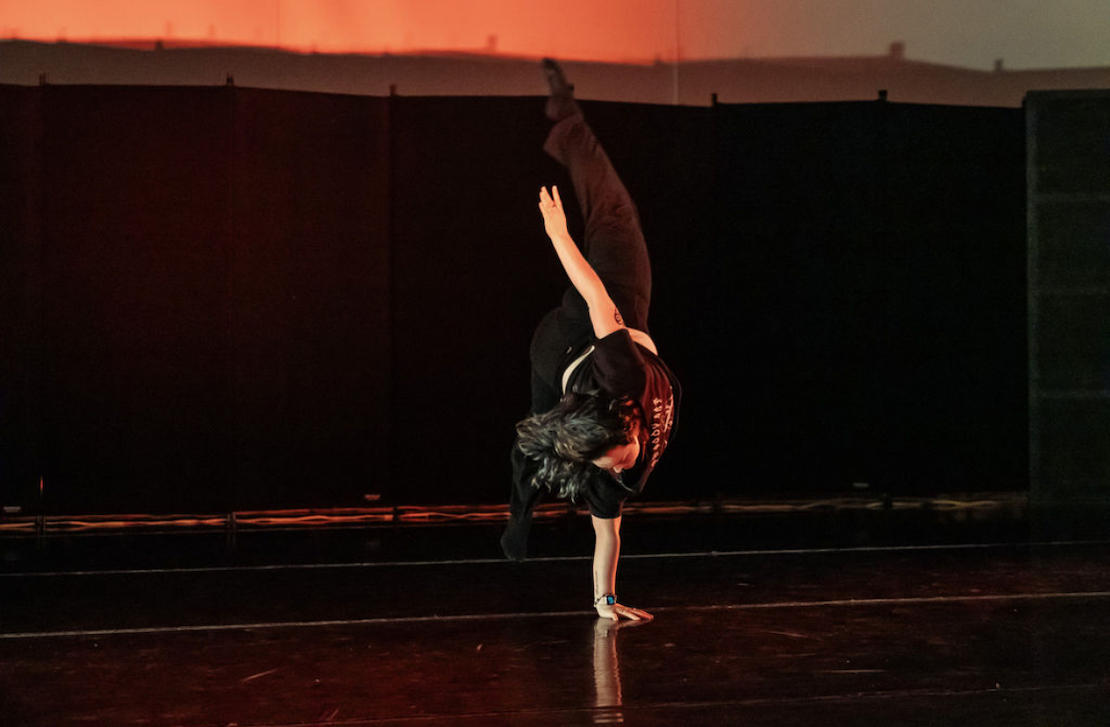
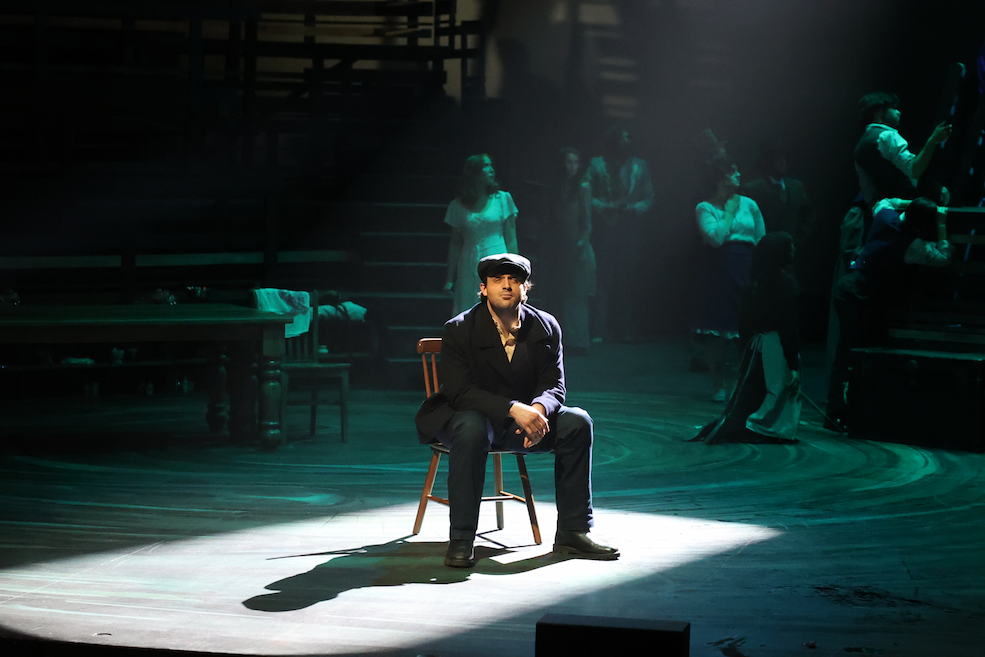
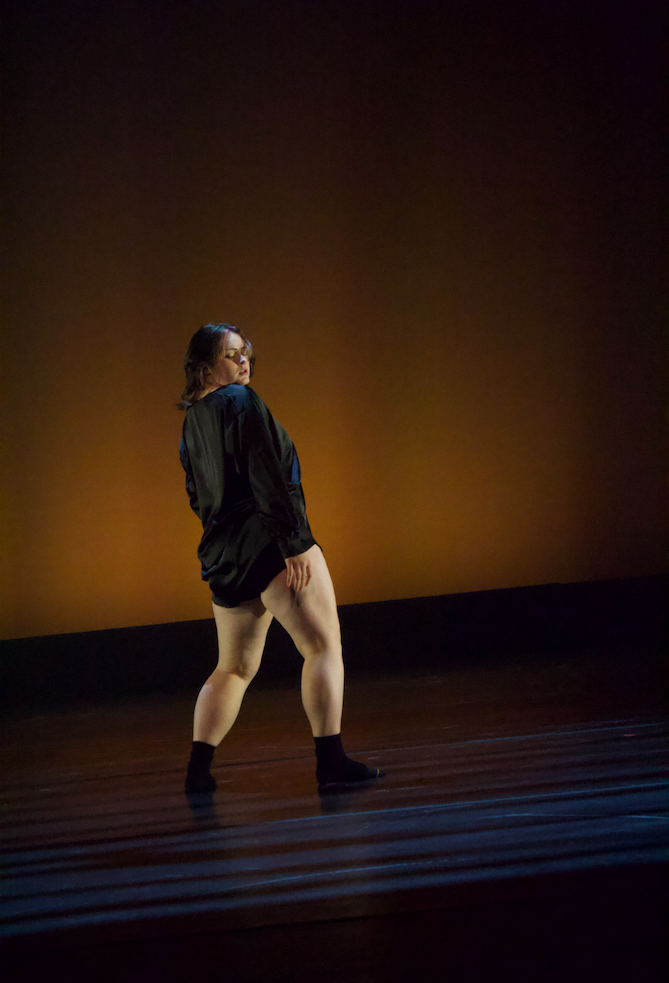
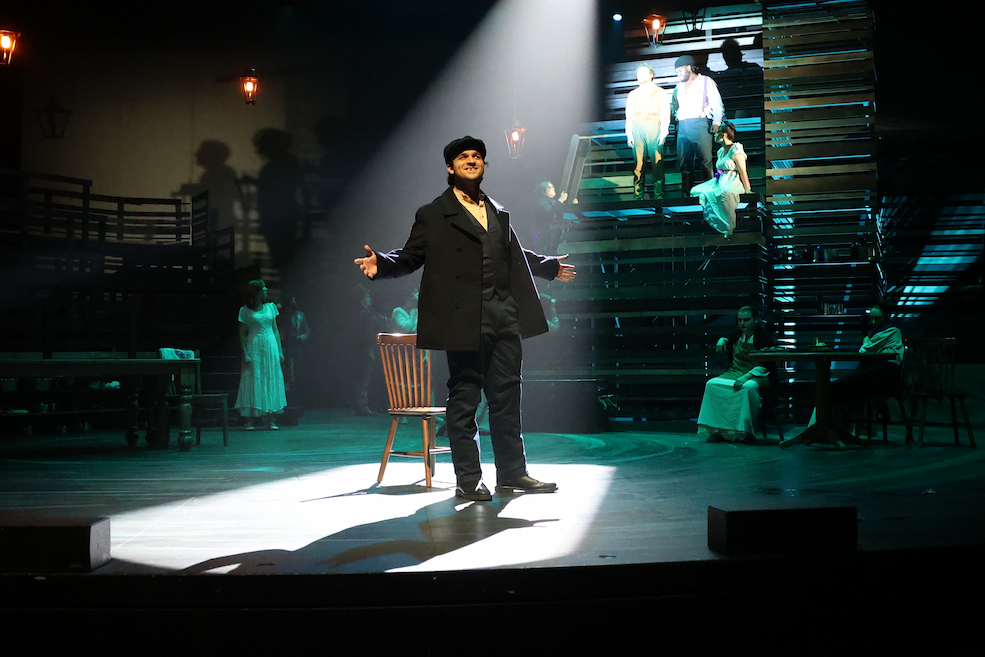
For incoming freshmen, college might be scary and new, especially for those traveling long distances or coming from out of state. Luckily, our Dance and Theatre department has great Student Ambassadors to be a friendly face and a guiding light for the newcomers. Brianna Lesley and Trevar Howell are among the Student Ambassadors for the Dance and Theatre departments, respectively, and are passionate about welcoming and guiding the new freshmen into the department.
Brianna Lesley, Student Ambassador for the Dance Department, is a senior graduating this May and has assisted with many events within the department, including the coordination of Texas Dance Improvisation Festival and compilation of potential adjudicators for the American College Dance Association, which UNT will be hosting next spring. Trevar Howell, Student Ambassador for Theatre, is a junior and has been in some of the mainstage shows in the department, including William Hare in Anatomies and George Donner in The Donner Party. Both have been involved with UNT’s Fall and Spring Preview, an open house for the university that welcomes prospective freshmen and transfers. In addition, the ambassadors table other recruitment events for their departments. “Overall, [our] main mission is to connect with prospective students and to be that candle in the dark,” says Brianna.
The selection process for Student Ambassador can differ between what each department needs. Where Brianna applied for the position and was interviewed by the dance faculty advisors, Trevar was recommended and offered the position by the theatre advisor. While the selection process for each of the Ambassadors was different, Bri and Trevar have very similar passions for their work as both are driven to be a welcoming, guiding hand for the newcomers. “I get a lot of satisfaction [in making people happy] and doing the things that I can to make people feel welcome and happy,” says Trevar. “I feel like if I can let it bleed out into the rest of campus, it will really help us all.”
With communication being an important aspect of the work, both ambassadors find this to be a helpful skill that they apply to their own careers and life, especially considering that both are working in fine arts. For Bri, they find the communication aspect to be helpful in advocating for the dance department as a whole. “When we do these previews, we get a lot of people who are like, ‘I’m a business major’ or ‘I’m in STEM, why would I ever dance?’” Bri expresses. In responding to these comments, Brianna finds that being an ambassador can help advocate for the department. “We so often have to validate why we are in a space…so having the communication of why I deserve to be in this space and why our programs need to continue to be funded- I’ll definitely take that into my career and future,” they add.
These eager and spirited ambassadors strive to help the incoming freshmen make connections and learn more about the departments while also being an approachable and enthusiastic new friend. Having been a freshman in college at some point, both have their own nuggets of wisdom to share with the incoming class. Brianna’s advice is to breathe and find a way to ground yourself in the moment. “When I was a freshman, I definitely felt like a fish out of water. I had no idea what I was doing, and that is so normal too. It’s okay to not know what the hell is going on,” says Bri. By taking pictures of nature and living in the moment, Brianna finds these moments of groundedness. Similarly, with living in the moment, Trevar highly suggests getting out and involved on and off campus. As “basic and boring” as it is, there are many things to do around campus and new people to meet. “Don’t hollow up in your dorm like I did for my first semester. Realize that campus is bigger than your dorm… When you feel like the walls start closing in, go watch the sunset on top of the Highland Street Parking Garage. Go do something!” Trevar expresses.
The strong passion for the department and the willingness to be that driving connection for the incoming students is just what this university looks for in a Student Ambassador. For those with interest in the position, they should be open-minded and willing to take on the work. “It’s not as intimidating as it sounds, and it also is not going to be as overwhelming or as much work as it may sound like. If you’re really passionate about your program, and you really care about seeing it grow and continue, then that is all you need to be an ambassador,” comments Brianna.
Written by Wendy Schwartz
Theatre Skills Outside of the Theatre Field: Graduate Coaching and Careers
Getting your theatre degree seems like a risk. Arts degrees are heavily devalued because they’re deemed unhirable and secondary fields of education. In contrast to the negative opinions of theatre degrees, many corporations and businesses find people trained in theatre to be extremely desirable because of our transferable skills in communication, task management, leadership, and public speaking. Theatre graduates often veer into diverse careers paths because of the adaptability of theatre training.
I spoke with UNT Theatre professor, Marjorie Hayes, about applications of theatre skills outside of the theatre world. She has prepped students for graduate programs, including using theatre training in audition preparation to help students ace their interviews. Most recently, Marjorie coached UNT alumna Grecia Monroy on verbal communication skills, who went on to receive a $40,000 Rotary Global Grant to get her master’s at the London School of Economics and Political Science. She will be hosted in London by the Rotary Club of Radlett.
Marjorie coached Grecia as a part of her work on the Rhodes-Marshall Scholarship committee. The Rhode-Marshall Scholarship is a national honor, and the Rotary Global Grant is an international award. Using the theatre skills that Marjorie taught, Grecia was able to receive extraordinary opportunities for her graduate education. But why does theatre training assist in gaining career and educational opportunities?
When corporate and educational leadership examine candidates, they first look for proper communication. As theatre professionals, we are taught audition etiquette such as making eye contact with the person you’re speaking to, presenting yourself professionally and confidently, and communicating ideas succinctly. These skills apply directly to interviews and presentations in any field of work, but many in fields like engineering, information technology, and more are not taught to proficiently communicate. This makes students who can articulate and connect on an interpersonal level stand out in applications.
Fear of public speaking is very real— but it is possible to overcome. Harnessing the fight or flight instinct is the key to success. To this, Marjorie says, “You have to learn the skill of how to focus your adrenaline. Whether you're applying for a major job in a banking organization or you're doing an audition, you still have to not run away when you need to stand and deliver.” An interview is a conversation, and a presentation is a chance to share information. Interviewers and panel members want you to be right for the opportunity, and they want to like you! They are hoping for your success and going in with a fear of rejection instead of hope for the future is a disservice to the work you’ve done. A mentality shift can be one of the most important keys to success.
Marjorie finds that mindfulness can be one of the strongest ways to improve your confidence. She believes strongly in meditation’s ability to center your mind and body as a part of preparation for interviews or auditions. Trusting in the skills you’ve curated and being able to connect with the people in the room who want you to succeed is the most powerful thing you can do to advocate for your future.
Theatre skills are transferable, diverse, and valuable in many work fields. The core teachings of a theatre degree, such as creativity, communication, time management, and leadership are applicable in any field. The next time someone tells you your theatre degree might not mean anything in your future, remember the value you hold as a creative and communicator in a world that needs new ideas and openness to other perspectives.
Written by Carver Olson
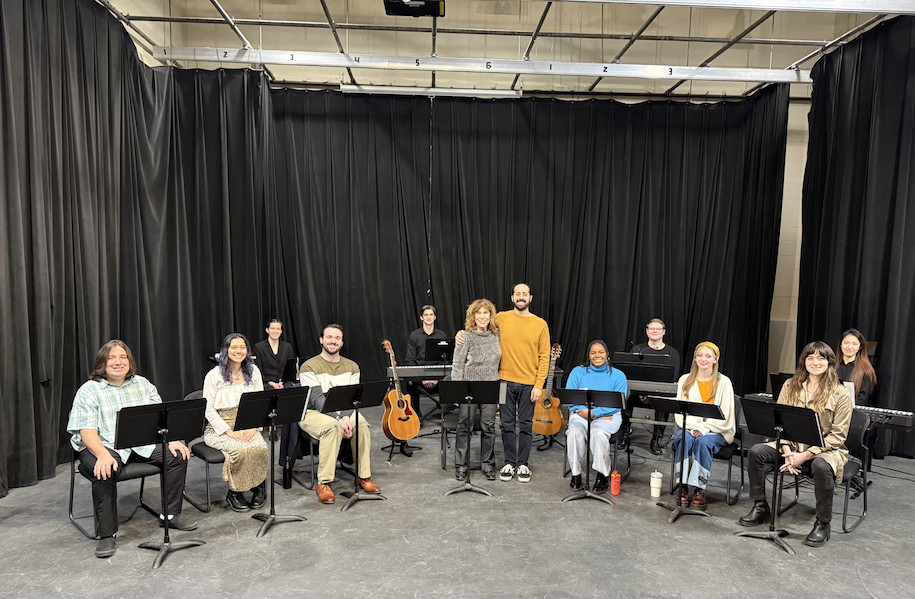

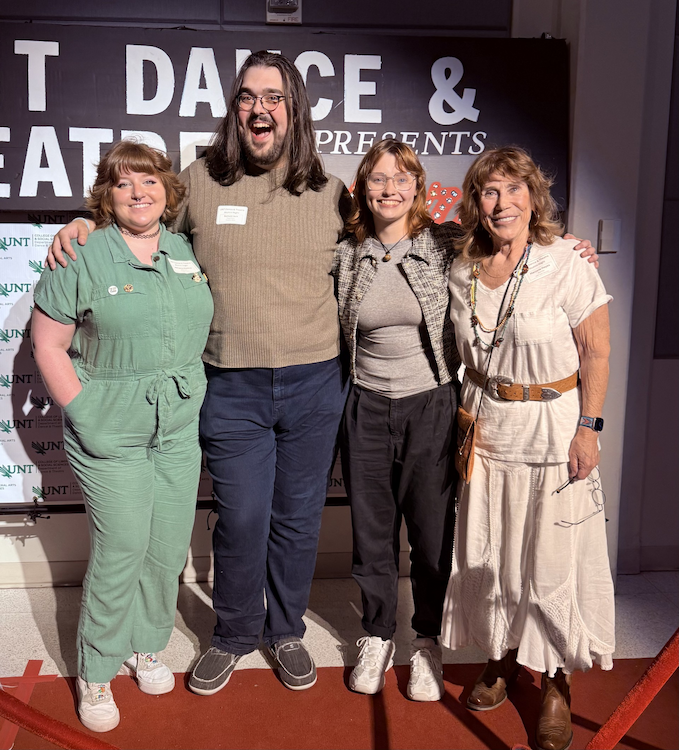
Into the Thick of It: Spotlighting Lisa Devine's Work
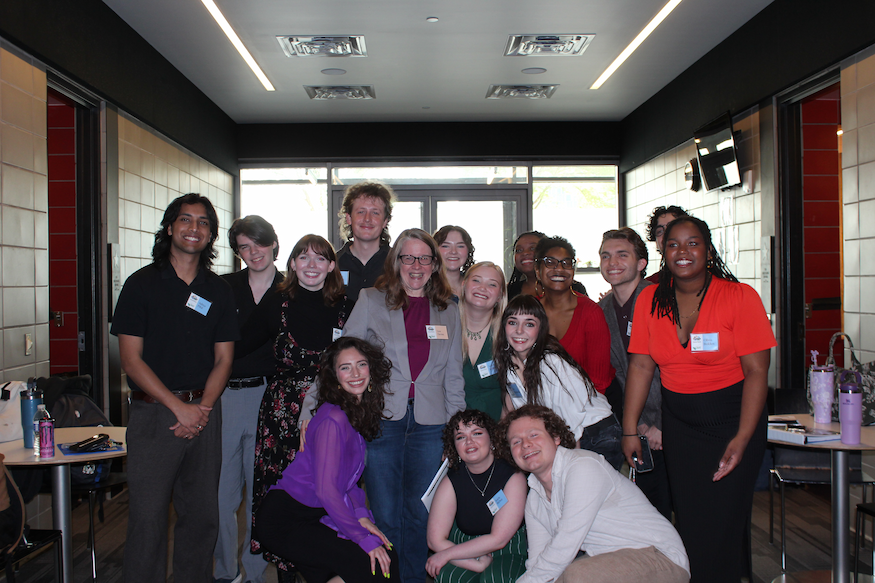
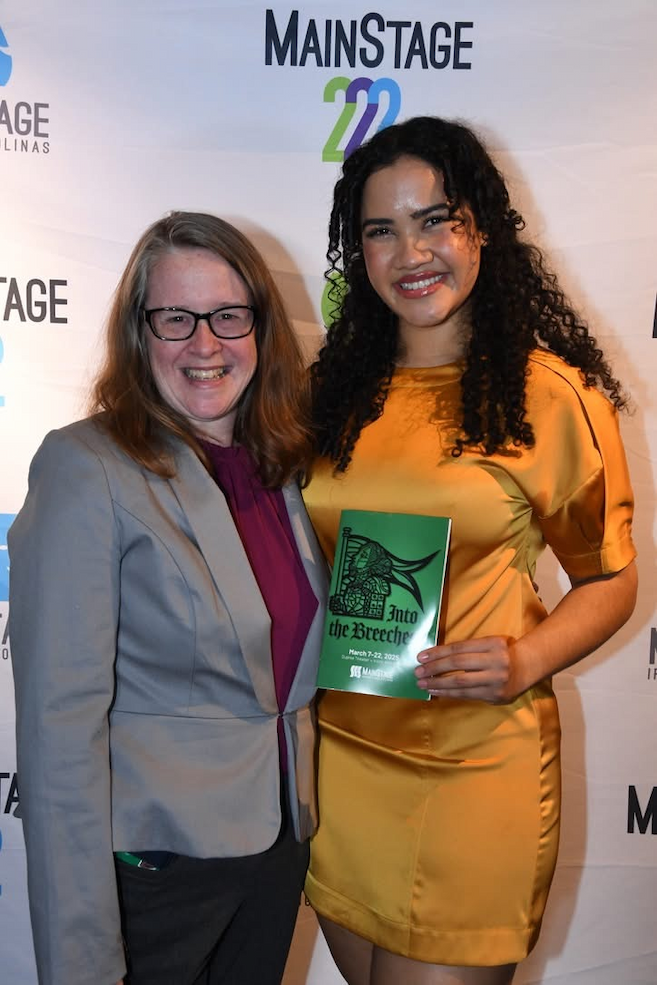
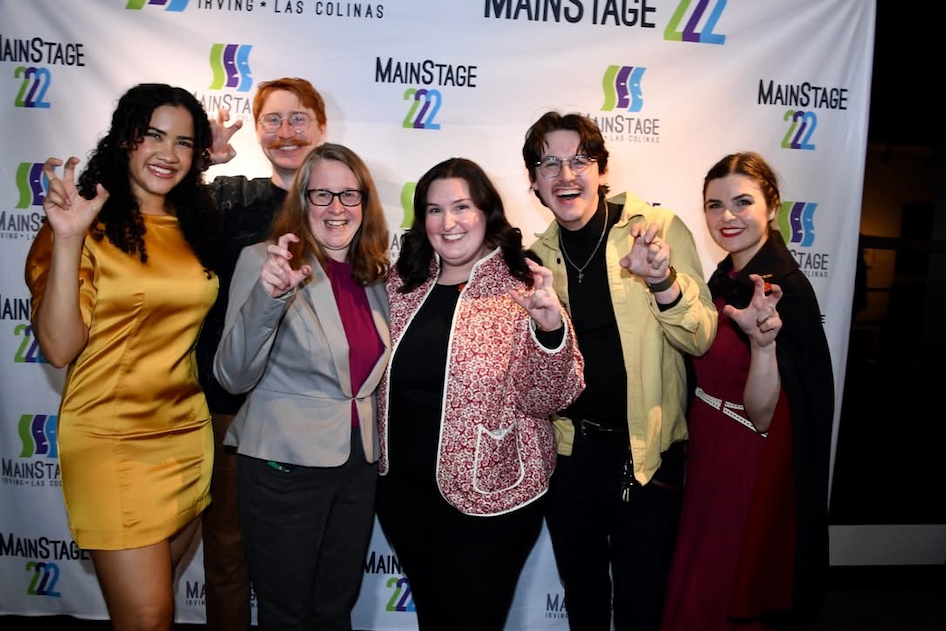
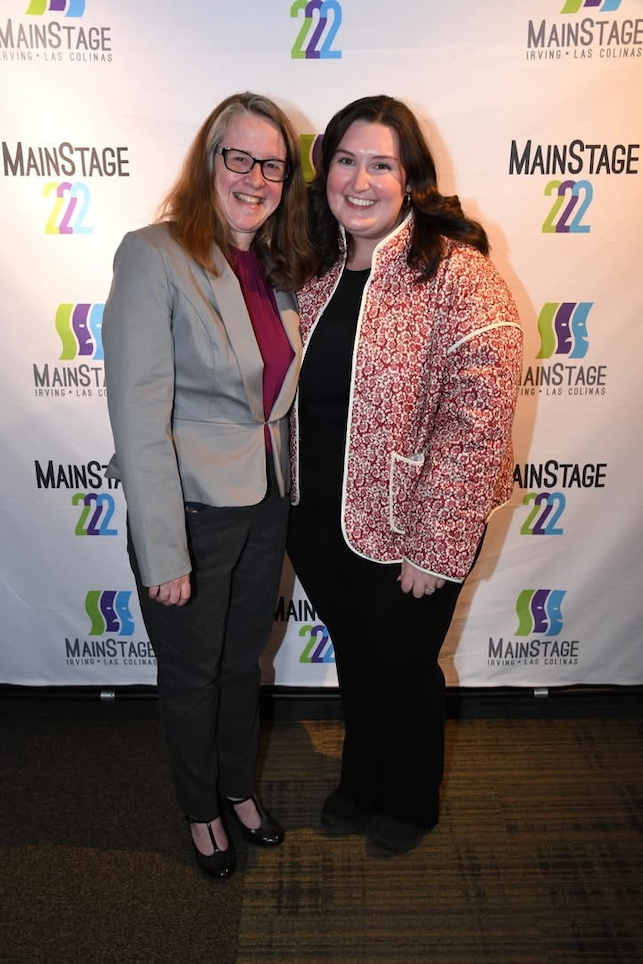
The UNT Dance and Theatre Department hosts a variety of talented artists, and it’s not just the students. Our wonderful faculty and adjunct professors hold many years of experience from all parts of the industry, both in and outside of the DFW area. Most recently, Main Stage Irving ran their production of Into the Breeches, written by George Brant and directed by the university’s own adjunct professor, Lisa Devine.
Lisa has taught at UNT for the past five years, teaching many of the dramatic literature classes, such as Social Change, Theatre and the Holocaust, and History of Broadway, as well as classes like Play Analysis, Playwriting, and Directing. In addition to teaching, Lisa directed The Book of Will by Lauren Gunderson at UNT in Spring 2023 and will return as director for the upcoming production of Agatha Christie’s And Then There Were None.
From the start, Lisa always knew that she wanted to be a director. She started her path in high school where she directed her first play. From there, she went to Sam Houston State University where she got the rare chance of directing a show as an undergraduate. She says, “I knew as a freshman that I was working towards one of their coveted directing slots because you got to direct with the faculty as your designers. It was as much a part of the production as any other.” Her experience led her to pursue graduate school for directing at the University of Oklahoma. From there, she went on to direct shows all over the country and eventually found her way to UNT.
With her love of telling stories and willingness to ask the tough questions, her drive for directing comes from the longing of telling the stories others might not be able to. “I was always drawn to mostly darker stories because growing up I had a really idyllic family, and I would hear about [people who were] being abused at home and knew that there were things happening in people’s houses that weren’t happening in mine,” Lisa says. “To be able to give those people a voice who can’t speak out on their own behalf, for fear or for other reasons—I felt like I was a conduit to that as a director.”
Set during World War Two, Into the Breeches is about a theatre company left in the hands of the owner’s wife, Maggie Dalton, after all the men have been shipped off to war. It is from there that she and a group of women decide to put on the first full-female production of Shakespeare’s Henry V. With MainStage Irving, directors are selected and are given the company’s production season, which they rank to determine who gets which show. Despite being a show right up Lisa’s alley, it was the only show of the season Lisa didn’t know. However, after a quick look at the script she knew that this show would be her number one pick. “World War Two, women leaders, strong women, good writing, has Shakespeare in it, and is about the theatre… Into the Breeches was my number one,” she chimed. Lisa also considered that other directors would not be as drawn to the show compared to other prominent shows in the season, like Death Trap. This gave her the perfect opportunity to be able to tell another story other people normally wouldn’t.
Given her love of telling and sharing stories, Lisa strives for her work to be accurate to the playwright's original intentions, leading her to be a text-based director. “I am an unapologetically text-based director,” she says. Through analyzing and breaking down the script, Lisa searches for how the playwright views the world and forms the story being told. “I see myself as a conduit between the playwright and the actor, in which I’m going to communicate what the playwright’s intention is.” Lisa comments, “It’s not my pulpit, it’s not my way of telling the story. I’m there to make sure that the playwright’s story is told.” This process will begin months before rehearsals, so by the time they start working in the space, the actors can begin their script work. Lisa blocks out her show quickly—usually within the first week or two—so her actors can become more focused on memorizing and understanding what the text means. “If I had not done the [script] work previously, that would be a very difficult part of the rehearsal process. [It’s] something that many directors don’t do because they don’t have time, which is why I block really fast.”
The story of Into the Breeches revolves heavily around theatre, leading Lisa to have many personal connections to the show. “There were so many theatrical experiences in it that I think were so universal from one production to the next… It’s so well written, clearly [by] somebody who’s been a part of the theatre for a very long time, who knows the small details that maybe a general audience member couldn’t pick up, but I certainly enjoyed.” Her personal ties to the show were evident as she signed her director’s note as both her and the director in the show, “from Lisa and Maggie.”
For Lisa, this show was a very giving production, feeding her with the creative and rejuvenating energy she needs for her next show. Lisa hopes that her actors and crew also feel the same way and carry with them the environment they’ve created during their run. “I hope that they took away my gratitude because they really gave to the production. They were so joyful together—really joyful—like hugging in the parking lot together joyful, which was really sweet.” For her audience, Lisa hopes that the show lingers with them and that they remember its messages. “We may tear [the show] down when we strike and sweep away all the dust. It’s gone, and we’re ready for the next one, but it still lives in the hearts.”
With over 30 years of directing experience, Lisa wishes to remind those future directors to stay flexible, remember that actors are artists, and to not get bogged down in the power of it all. “People see [directing] as a seed of power, and it’s really not. It’s a seed of service. I am the power in the room, but I am there to provide. I just become a colleague. A knowledgeable colleague but a colleague nonetheless.”
Written by Wendy Schwartz
Photos by Kris Ikejiri
Igniting Passion for Young Artists: Alumna Kristianna Hogan Freeman
For the Performing Arts, there is no one more important to communities of artists than our educators. Our educators are life-changing professionals and mentors who empower us to make meaningful changes through our work.
UNT has been a garden for these educators to blossom. One of the Alumni making great waves in the dance community of DFW is Kristianna Hogan Freeman, class of 2015.
Kristianna is a multifaceted dance choreographer, performer, teacher and administrator. She has extensive training in numerous dance styles, with anything from ballet to Afro-jazz to color guard. She started her career in dance in 1995 at Cindy’s School of Dance in Allen, Texas, where her goals of dance began to flourish.
She made waves during her time at UNT as a performer and student leader, performing at ACDA, the National Dance Education Organization Conference, Winter Guard International World Championships, and the 254 Dance Festival with Satellite Dance Company. She also served as the Vice-President of the dance honor society Chi Tau Epsilon, starting UNT’s Inaugural HIV/AIDS Benefit Dance Concert as an undergraduate.
Her achievements only continued post-grad, starting her expansive career as a dance director and educator. In tandem with working on her Master of Arts at TWU, she worked at Nimitz High School in Irving ISD as dance director, sponsoring many dance groups within the school’s community. “I sponsored beginner through advanced level dance classes, drill team, ballet folklorico, and I founded and directed the only competitive co-ed hip hop team in Irving ISD history— the Kings Dance Crew.”
Following her master’s degree in dance education, which had a research focus in competitive dance, she moved on to working at McKinney North High School as the Head Director of Dance, as well as teaching a summer course in 2023 in hip-hop technique and performance quality to graduate students at TWU.
Currently, Kristianna is uplifting and empowering the students of Forney ISD as their dance director of the Advanced Academic & Fine Arts Academy at Smith Intermediate and the FISD Dance Day Coordinator. She works with students across FISD and has won national championships with the Forney High School Highsteppers at the National Dance Association.
Her achievements are vast, and I was eager to know what drives her as a dance professional. Through performance, dance has shaped her life as a means of communication within a community of artists. “I have had so many experiences where dance was the vehicle through which lives were changed, and communities were brought together for incredibly special moments.” As an educator, she values dance for its transformative impact on students. It is an art form that teaches physical and emotional resilience, empathy, collaboration, and compassion.
Kristianna has been an incredible advocate for her students her entire career. She works with a diverse group of students of many ages and styles of dance. From choreographing middle school theatre productions to preparing students for national conferences to working with graduate dance students, she does it all. During her time at Irving ISD, she raised over $50,000 dollars writing grants for students to travel and compete at dance competitions like the Monsters Dance Competition. She is excited to continue in her position at Forney ISD where she will help students reach their personal and educational dance goals.
We love watching our UNT alumni soar and make an impact on our community. Kristianna says she chose UNT because of the strong dance and education programs, the incredible faculty and the community of dancers in Denton, including the programs and people at TWU. We are so proud of her numerous accomplishments, and we can’t wait to see what happens next for her!
Written by Carver Olson
Photos provided by Kristianna Hogan Freeman
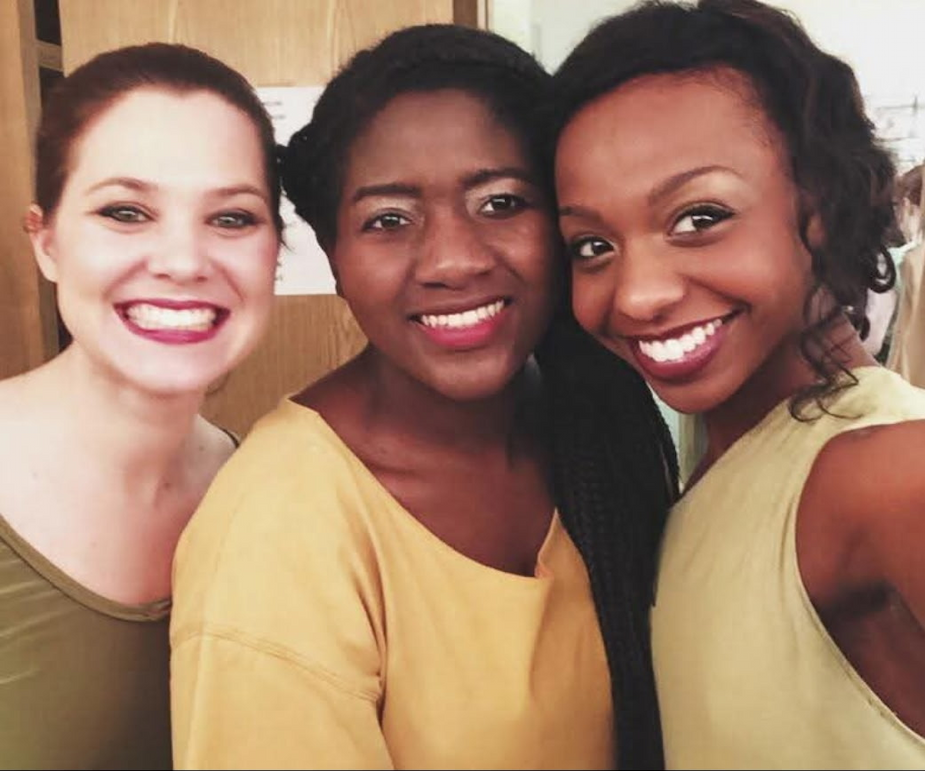
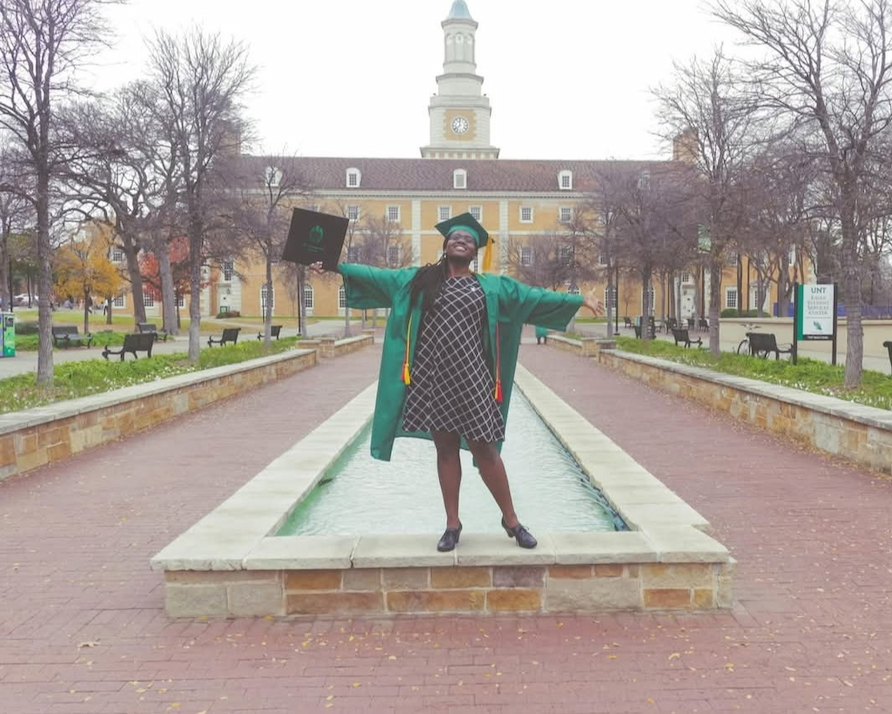
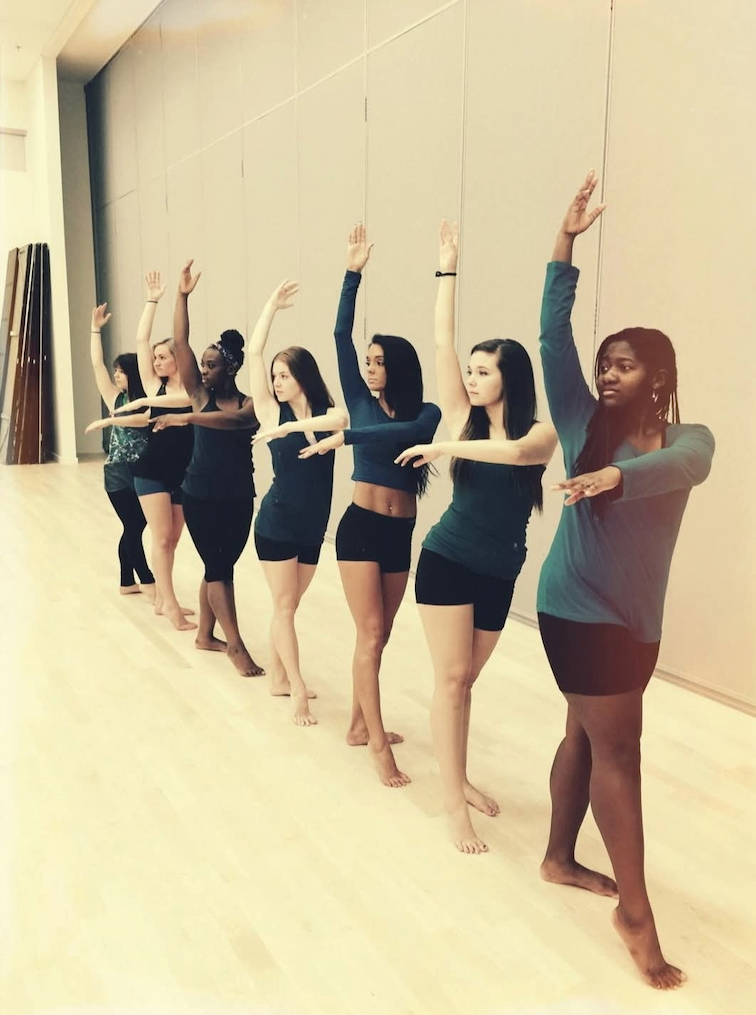
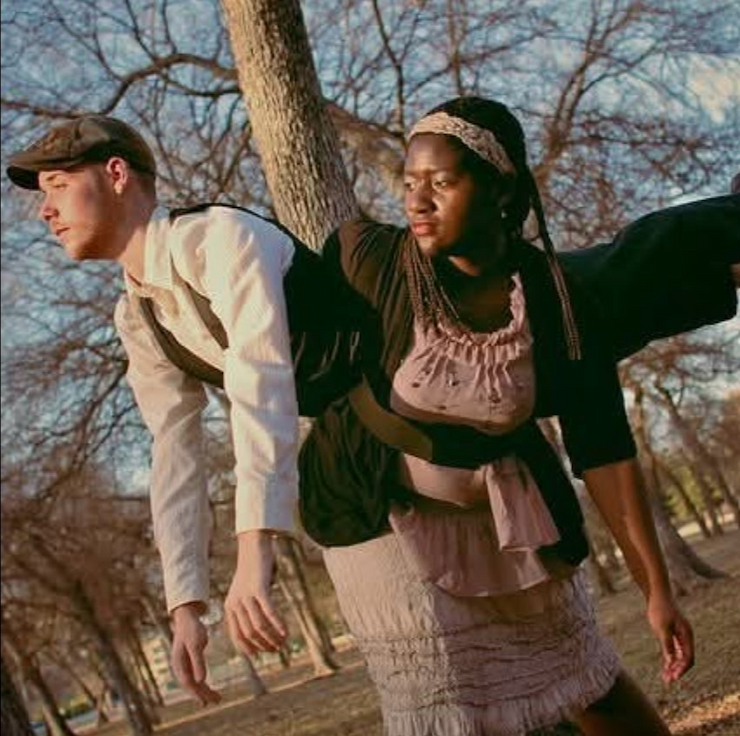
Exploring Technical Theatre Outside of UNT: A USITT Follow-Up
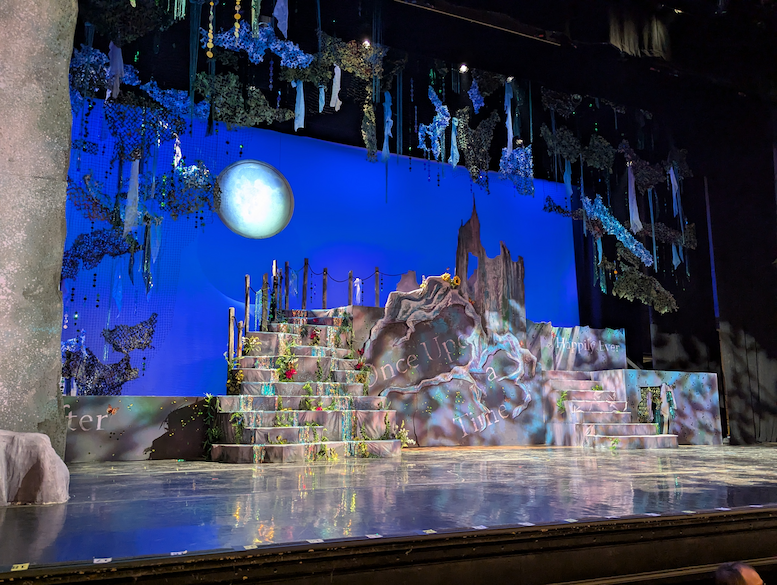
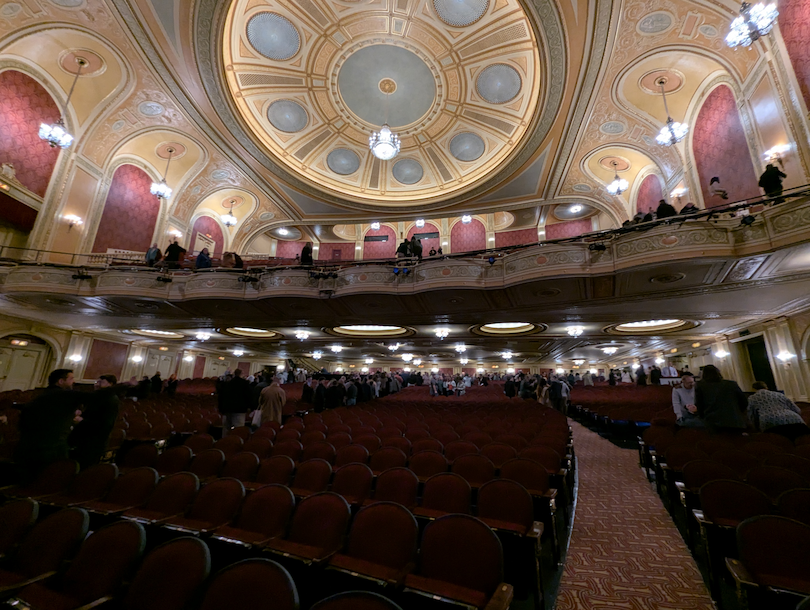
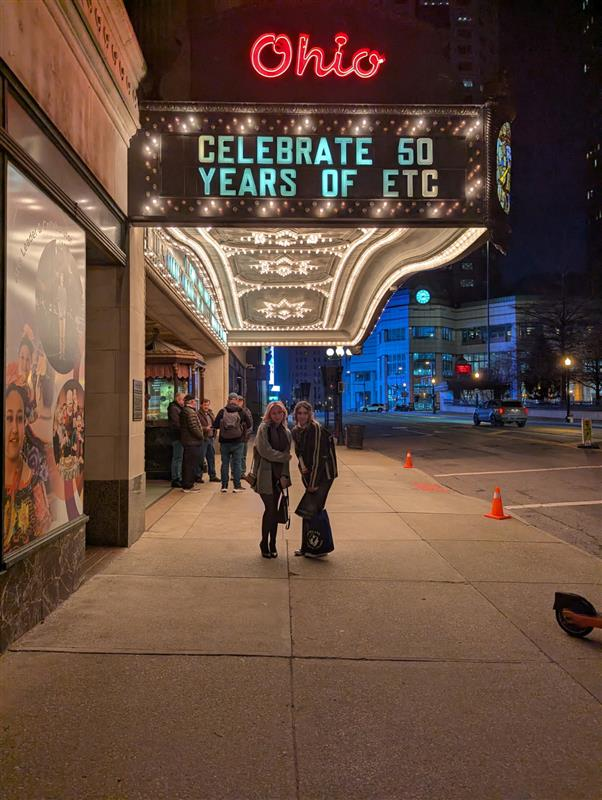
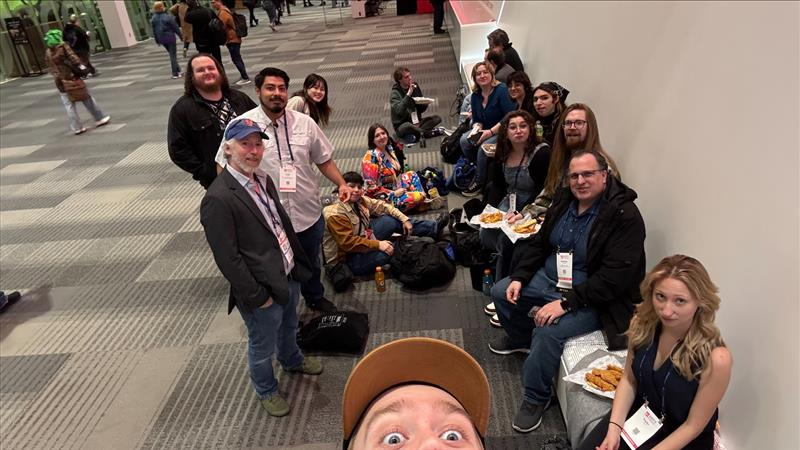
Running from March 5th-8th, the United States Institute for Theatre Technology (USITT) held its annual conference in Columbus, Ohio, which many of our technical theatre students had the opportunity to attend. At the conference, students attended sessions and hands-on workshops, met with theatre companies and graduate schools from across the country, got first looks at new technology, and collected a lot of cool swag.
USITT is the dream of every tech theatre kid as the conference hosts a wide variety of sessions and showcases of new technologies, covering almost every aspect of the technical theatre world. Have a specific niche? There’s most likely a session on it. From workshops on building puppets and the physics of rigging to sessions on how people respond to crises, you are bound to find something that interests you. If you are interested in working in corporate theater, our very own theatre professor, Matthew McKinney, hosted a lecture titled “Depth of Cut: Drafting Techniques for Mass CNC Production.” Alex Eliason, junior and costume designer for Machinal, states their favorite session related to costuming BIPOC, trans, and plus size artists. “How do we costume people that are not the same as we are… How do I make them the most comfortable?”
Aside from the educational sessions and panels, one of the biggest reasons students like going to USITT is for networking and job opportunities. The conference brings in many graduate schools and major theatrical companies from all around to pitch themselves to upcoming graduates looking to get into the theatre world. “Theatre is an industry about connections. If you’re not connected, you’re not working. And if you’re not working, you’re not in theatre,” says Eric Tinkler, senior and Technical Director of Cabaret. From colleges like Purdue, Texas State, Yale, and Carnegie Mellon, to companies such as Disney, ACME, ETC, BMI Supply, IATSE, and so many others, attendees are bound to find great connections and potential job opportunities. “There’s always someone on the Expo floor that needs something very specific you can fill,” Eliason continues.
For future attendees, it is highly suggested that you bring your resume and business cards, so you can showcase your own work and talent. Even if you’re not completely confident in your resume, there are resume and portfolio workshops you can attend for advice and resources. Eliason describes a conversation with a technical director in Cincinnati who provided insight into what he looks for in a job candidate and offered advice on what to add to Eliason’s resume.
For those looking to attend USITT next year, some key advice past attendees suggest is to stay connected and to not be afraid to reach out and talk to people. While it may seem intimidating to talk to the grad schools in attendance, it’s important to remember that they are also there for you. “They all just want to see the next generation move on with the best resources they can have,” Tharp comments. “You go to talk to them, and they go to talk to you. They’re here for younger artists, younger designers and tech artists, because we’re their future."
And then there’s the swag. “The fun thing about the Expo floor is that they all have goodies,” comments Rose Tharp, graduating senior and Scene Shop staff. “There was an opening ceremony that welcomed all the cool sponsors that were on the Expo floor. ETC [Electronic Theatre Controls] showed up, a couple other places showed up, and they all tossed out souvenirs.”
Next year’s conference will be held in Long Beach, CA, from March 18th-21st, 2026. While it can be costly having to pay for registration, flights, hotel, and other amenities, many of the students who have previously attended find it highly worth the cost. “You can expect to spend a little more, but I would consider it well worth it. I feel like it’s a very important career step if you want to pursue technical theatre in any capacity,” states Tinkler. Especially if you are graduating, USITT is a great place to find connections and meet with people and companies across all areas of theater.
Written by Wendy Schwartz
Empowering Dancers in Higher Education: ACDA
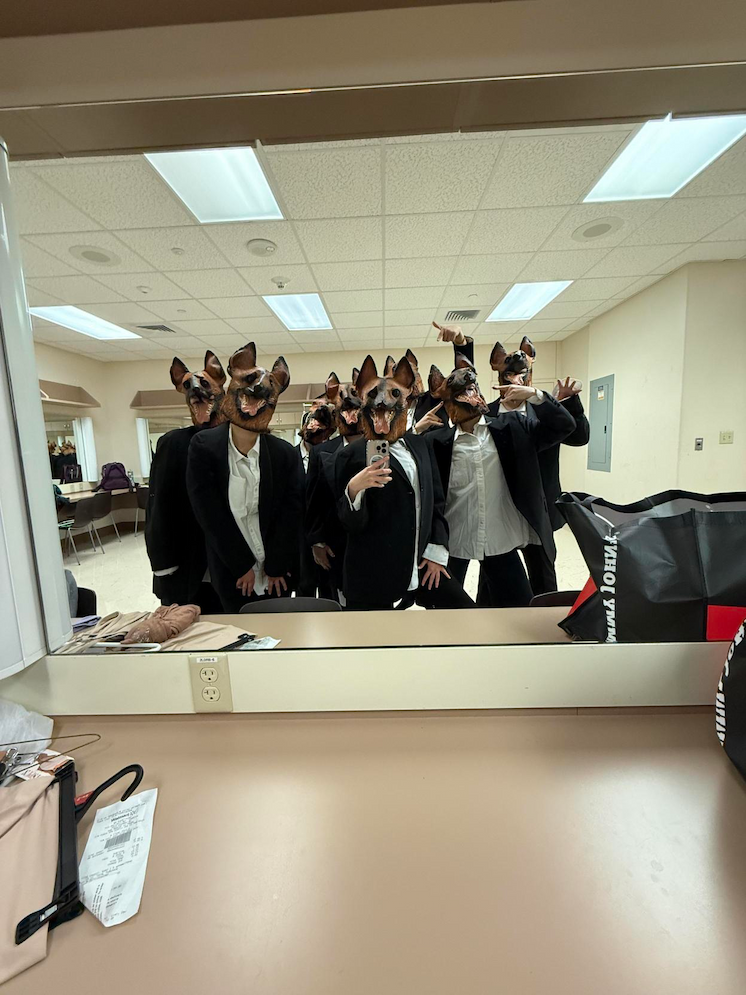
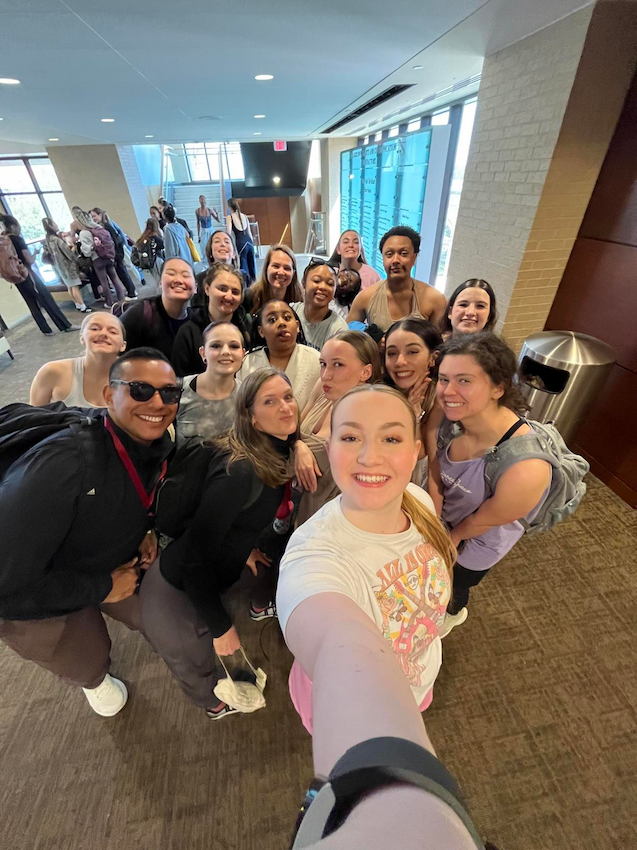
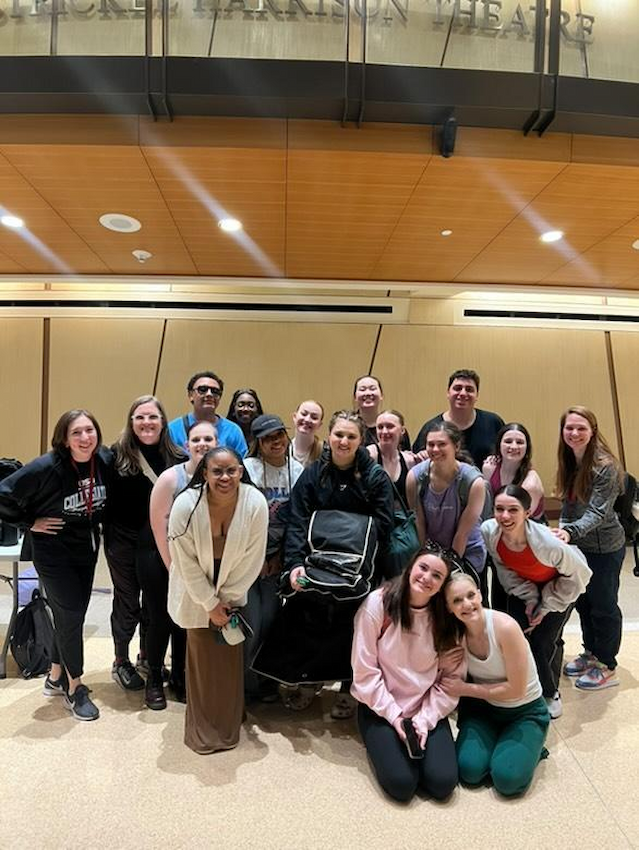
UNT Dance students and faculty joined more than 400 students and 15 dance programs at the American College Dance Association (ACDA) South-Central conference held at Texas State University in San Marcos from March 12-15. Presenting choreographic works chosen by both students and faculty for the conference, our students represented UNT Dance on a regional platform!
Dance works from the New Choreographers Concert (Fall 2024) and the Spring Dance Concert (Spring 2025) are chosen by both students and faculty to be presented at ACDA for adjudication. The turnaround from the Spring Dance concert to ACDA is quick, and rehearsals are used to refine the work of the performers, build endurance, and develop physicality. Among the students in attendance was Annali Potter, who also serves as the Outreach Coordinator for the Department of Dance at UNT. Potter expressed pride in getting selected for ACDA, eager to show off the work that UNT brings to the table. Performing in Black Label Movement’s Morituri te Salutant, Annali says, “I was grateful that the hard work we put into the piece was recognized and that it was getting the chance to represent the athleticism and performance that UNT Dance can bring.” In addition to Black Label Movement’s piece (a guest artist for Spring Dance Concert), two student works were presented: Imperceptus by Camille Williams and Aftermath by Ethan Gonzalez.
Along with the opportunity to present and perform at a regional conference, ACDA also facilitates learning for collegiate dance students across the country through workshops, panels of professionals, classes, and opportunities for networking for the students in attendance. From classes in commercial jazz to ballet, ACDA strives to encourage students to expand their technique repertoire. “Personally, the experience ignited my passion for dance and inspired me to keep looking for opportunities to grow and hone my craft,” Potter says. “They introduced me to new ways of thinking and moving that I can implement into my own practice.” The goal of ACDA is to enlighten those students in the beginning of their dance careers to approach styles unfamiliar to them with curiosity and openness so that they can diversify their future work.
On the faculty side of the ACDA experience is Dance Adjunct Jocelyn Schimpf, who is a UNT alum, choreographer of SDC three times over, and a working dance professional. Schimpf expressed joy in getting to watch the ACDA group commune with other dance departments and create connections with other future dance leaders. “I'm excited for them to bring what they learned during the conference back into classes, performances, and choreography and see how these experiences accelerate their creativity and development even further.”
We are so proud of our dancers who went to ACDA and their drive to show off their athleticism, tenacity, and Mean Green spirit. We can’t wait to see how their experiences and new knowledge from ACDA will influence their future projects, careers, and artistry.
We are also excited to announce that UNT Department of Dance and Theatre will be hosting
the next South-Central ACDA conference in March 2026!
Written by Carver Olson
Right This Way, Your Table's Waiting: A Feature on UNT's Cabaret Choreography
UNT’s upcoming theatre production features their spring musical, Cabaret, written by Joe Masteroff, with music and lyrics by Kander and Ebb. Choreographing the show is UNT Dance faculty member Reyna Mondragon. She currently teaches many of the dance classes, including technique and capstone classes, and has been an advisor for the New Choreographer’s Concert and the Spring Dance Concert for the past few years. Reyna previously choreographed for UNT’s American Idiot in Spring 2023.
Drawn in by her love of musical theatre, Reyna was thrilled to throw her name into the ring as choreographer. Being a part of the production committee that helps pick the shows each year, she was able to help plant the seed for Cabaret. “I was like, hey, if we do this, I will definitely be the choreographer. You don’t have to worry about it,” she commented. She was excited that Cabaret was ultimately chosen for the season.
In her process of creating the choreography for musicals, she goes straight to the original source. Taking inspiration from past productions and the 1972 movie, Reyna was able to research the style of dance as well as the overall context of the story and its characters. “Research is so important, and I always tell people that. That’s what works for me. It may not work for everybody… but I find it really important to the creative process of musicals specifically.” Once she’s done her research, she’ll go on to create the moves and gestures and eventually bring it to the dancers. But what she creates initially is not always the final product. She states, “The dancers start creating their own version of whatever I’m teaching them, and I accept that. I’m not the choreographer that [thinks] ‘this is the way, and this is the only way.’ I’m very much a hands-on and collaborative type of choreographer.” Making sure the dancers are comfortable and seeing that everything is working well is an important step for Reyna and necessary for the final product.
While she may not be your “traditional” musical choreographer, Reyna embraces a more complex approach and loves to “add a type of challenge to all types of technical dancers.” She continues, “I love to give students challenges because I feel they’re more engaged that way.” Using a lot of jazz-styled dance, as well as some Fosse sprinkled in there, Reyna creates light and sensual movement, which revels in the 1930’s Cabaret world. “In American Idiot, the movement style was very direct, very sharp, versus Cabaret is lighter at times and bound in certain ways. It has its sexiness and sensuality, which I love. It’s always fun to teach a different style.”
As part of the set design of Cabaret, the show offers a unique experience where audience members have the chance to purchase a seat at one of the tables on stage and enjoy an immersive experience. Reyna embraces the challenge of interacting with the audience. She says, “…I am asking a lot of the audience members. Interacting with a person on stage is bringing attention to yourself, and then there’s also the worry of doing it right or wrong.” Despite those worries, the experience will be one that is enjoyable, memorable, and well worth the money.
Assisting Reyna with the choreography is Grace Bynum, current UNT senior and dance major. The two tackle the creative thrills of choreographing a musical. With her background in theatre and years of dance experience, including choreographing a piece in the most recent New Choreographer’s Concert, Grace was thrilled to have the opportunity to work alongside Reyna and get back to her theatrical roots. Regarding her role, Grace said, “We get together and she asks for my input, if something needs to shift, or if I have another idea for something she’s stuck on. In rehearsals, I’m like her second eye, so she can work with them, and I can step back and see if it’s working.” Reyna also enlists the help of Infinity O’Connor, UNT senior and dance major. As a lover of musical theatre, Infinity auditioned for Cabaret and was cast as Fritzie, a Kit Kat Klub girl, and was then later appointed as dance captain for the show. They enjoy taking on the responsibility of helping fellow dancers understand the choreography or answering questions if they feel lost.
UNT’s Cabaret opens next week, running April 10th through the 13th. Tickets are on sale now!
Written by Wendy Schwarts
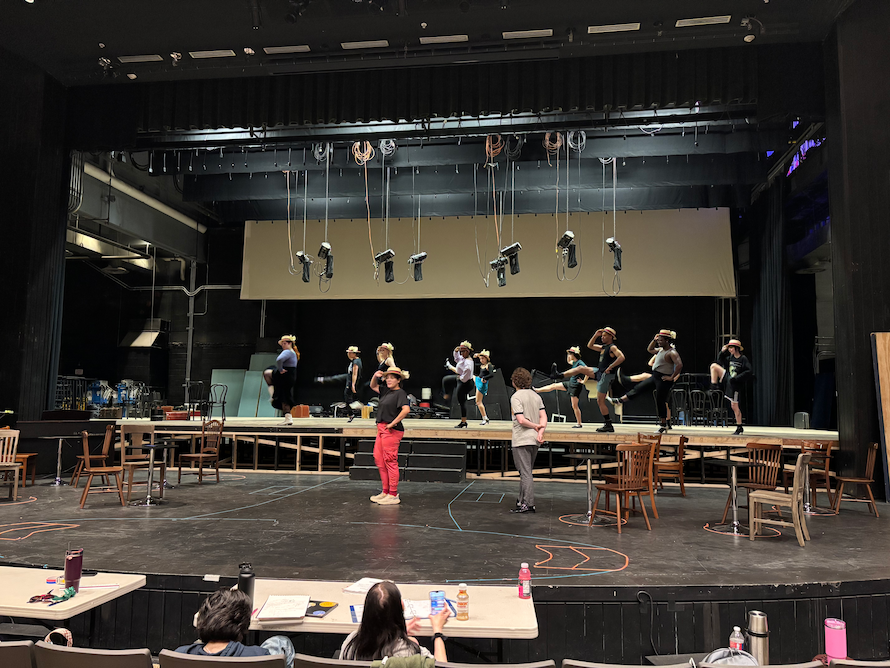
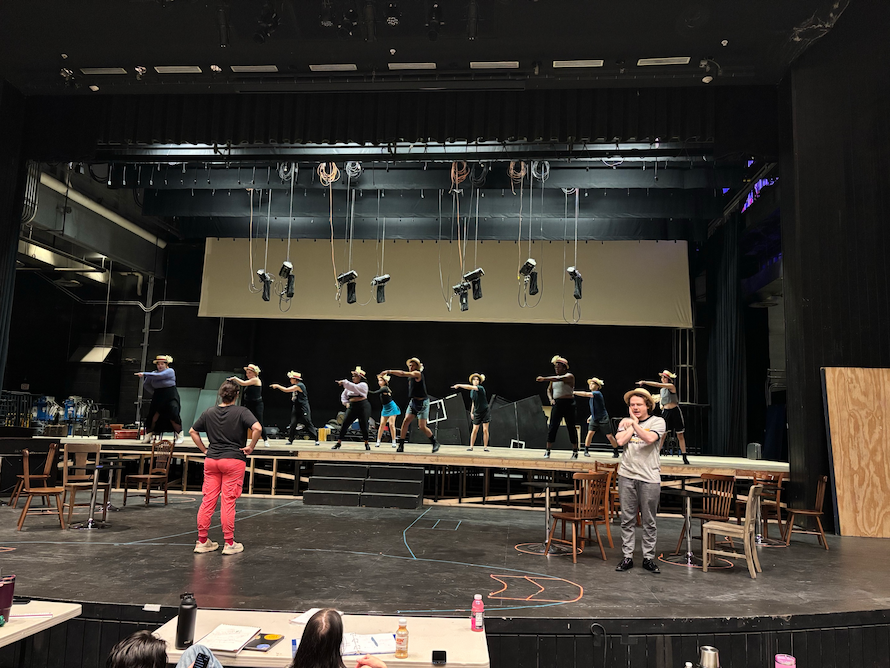
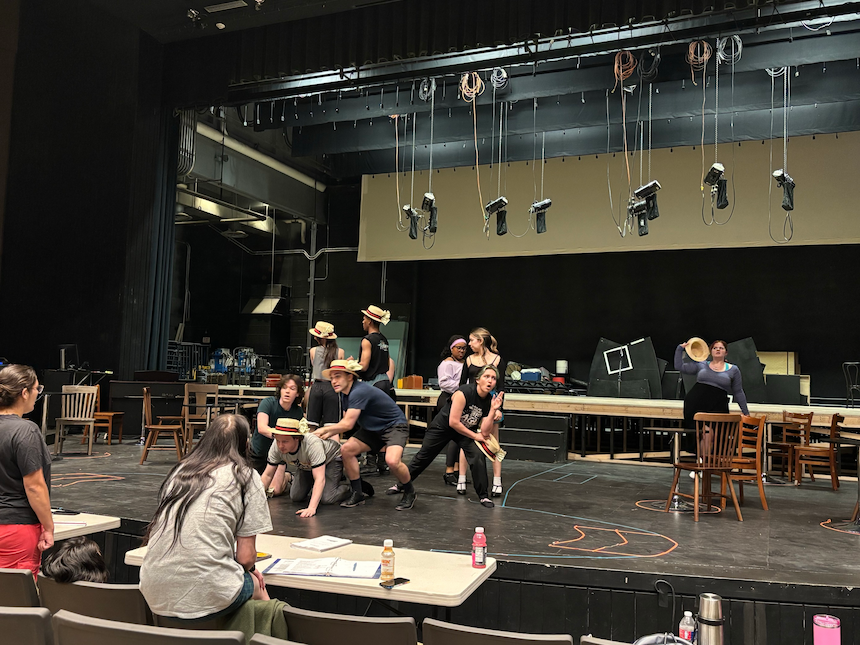
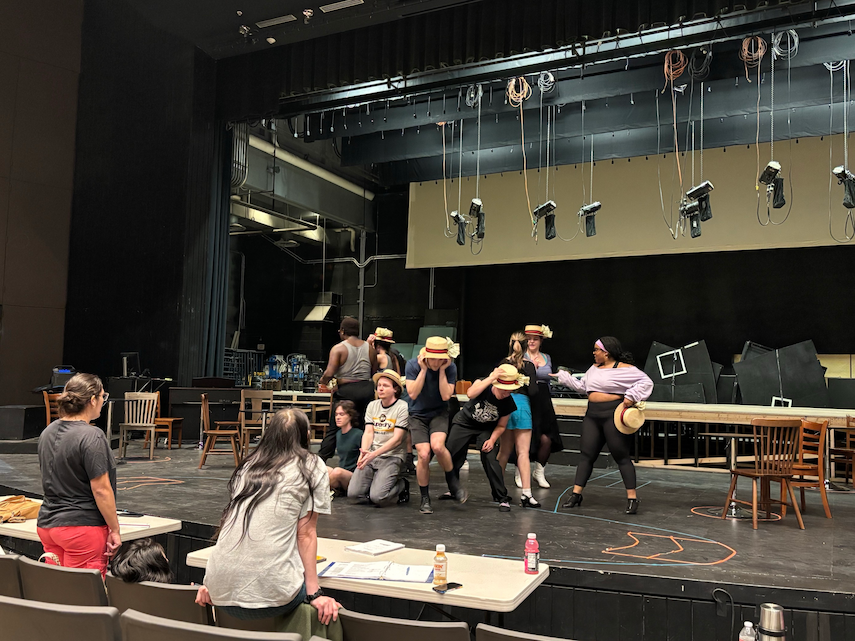
Community Connections: Cabaret Alumni Event
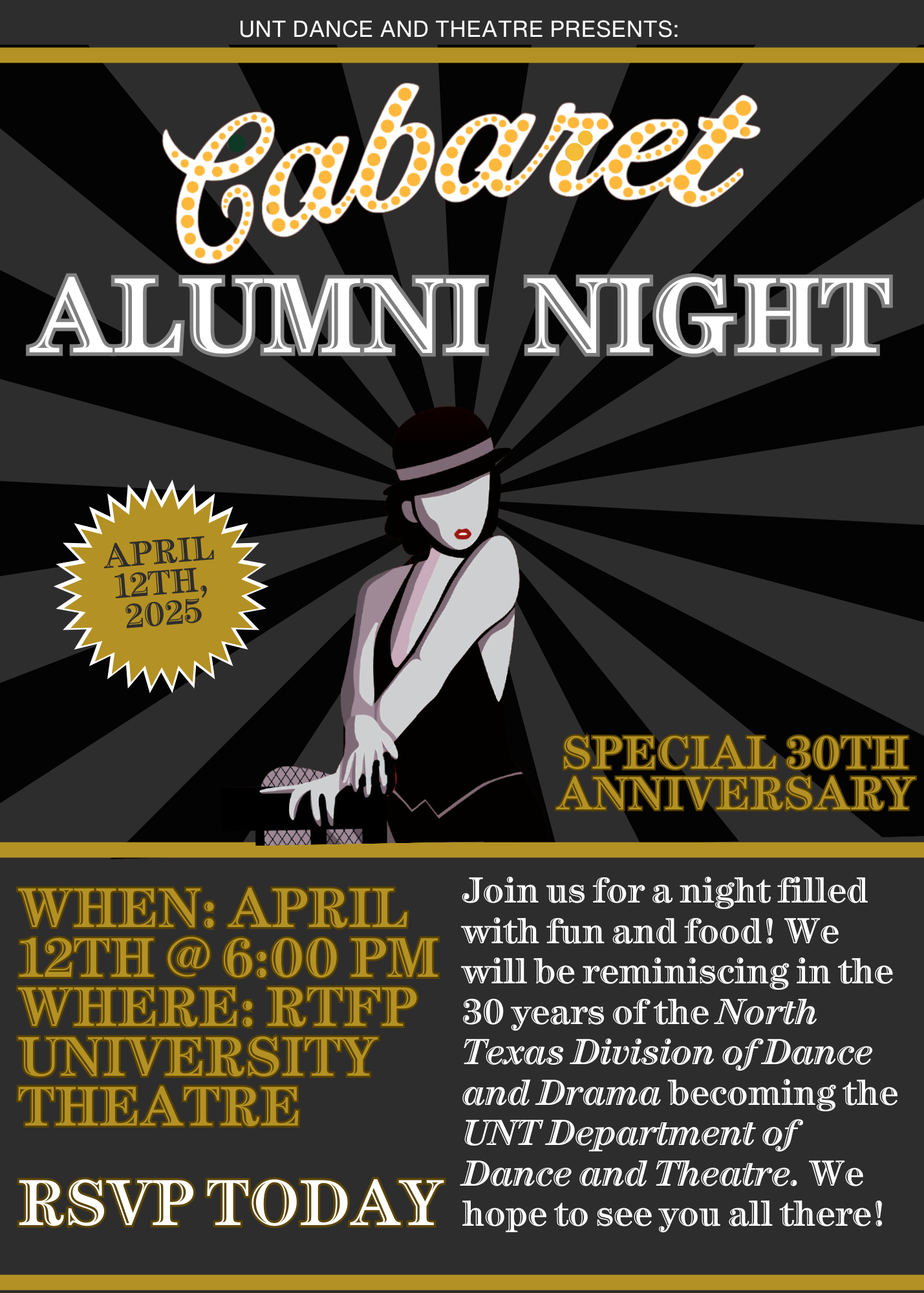
The legacy of UNT Dance and Theatre is a great source of pride for our department. Our alumni are consistently creating opportunities, making themselves seen and their voices heard. In celebration of 30 years as the Department of Dance and Theatre, the department will be holding an Alumni Event in conjunction with the performance of Cabaret to celebrate those incredible graduates from our department!
With many departmental changes coming along, connecting with alumni has been a point of interest for the future of UNT Dance and Theatre. I spoke to Professor Marjorie Hayes about the purpose of the alumni event. “We’re kind of in a new age of invigorating the theatre school… there’s a great joy in giving back to the school you graduated from.” As a department, we hope to foster relationships between graduates of all years that can blossom into professional relationships beyond the university level. This can include mentorship of recent graduates by graduates who have established a career for themselves, post-graduate research, job opportunities, endowment/scholarship donations and more.
“We want to find a way for people who are a few years ahead in their career to help those that come behind... It’s a win-win situation for our new graduates to meet graduates who are further along.” As a professor, Marjorie promotes connection with past graduates and works with alumni on professional projects past the university level.
Many alumni have come back to teach workshops as guest artists, direct shows, and even join the faculty and staff at UNT. In fact, UNT Dance alum Reyna Mondragon is the choreographer for Cabaret. We are so grateful to have alumni who continue to give back to their alma mater!
With a department that has existed in some form since the 1930s, originally created as the Department of Speech Arts, to the Division of Drama and Dance to our current moniker as of 1995, there are many alumni to celebrate. The upcoming Alumni Event aims to show appreciation for the wide array of accomplishments of those who have graduated and give an opportunity for alumni to visit and see the work the department is doing now.
Thank you to Professor Marjorie Hayes, Annalise Boydston (Administrative Coordinator), Alyssa Knapschaefer (Box Office Manager), and Rachel How (Administrative Specialist), for all their hard work in facilitating the Alumni Event. Please be sure to check out the Alumni Newsletter to read more about events in the department, spotlights on alumni and info season dates for Dance and Theatre presentations.
The Alumni Event kicks off on Saturday, April 12th, with a contemporary dance master class by UNT alum Amiti Perry in the Dance and Theatre Building from 3:00-4:30pm. A reception and anniversary gala will follow at 6:00pm in the Radio, TV, Film and Performing Arts building lobby before the 7:30pm performance of Cabaret. The reception will be catered, and UNT Dance and Theatre Alumni will receive free tickets to the show with their reservation. Put in your RSVP at danceandtheatre.unt.edu/alumni, and come see fellow alumni and reminisce with us!
Written by Carver Olson
Deeply Rooted in Our Department: Spotlighting Adam Chamberlin
UNT’s Dance and Theatre faculty are a reservoir of talent— juggling professional projects, university duties, and annual conferences all while facilitating a diverse community of artists within the department.
Along with being our Lighting and Sound professor at UNT, Adam Chamberlin is also an extremely active theatre professional. He is a board member for the Leadership of Lighting Commission for USITT, currently serving as the Awards Coordinator and Poster Session Co-Coordinator. His responsibilities include contacting the winners of the Distinguished Achievement as well as finding adjudicators for the student awards. He works on both sides, finding people to judge work for USITT, as well as soliciting for people to bring projects to be adjudicated.
He has designed at many theatres across DFW, including Stage West, Shakespeare Dallas, Watertower (and many others). He is also a founding member of three separate theatre companies. He does a ton. When I asked him what his was looking forward to in the coming months, he said “definitely sleep.”
Most recently, he has returned to Amphibian Stage as the lighting designer for their recent production of Rooted, a 2022 play by Deborah Zoe Laufer. Rooted explores two sisters living in a treehouse who accidentally start a plant-based cult. The quirky comedy explores themes of sisterhood, fame, and the roots we plant in our communities. The production was praised in Onstage NTX for the lighting and technical effects within the show that created surrealism and unpredictability within the strange world of the play.
Adam is an Amphibian veteran; he's worked there since 2013 and will be opening another show, Rift, or White Lies, on April 16th. Amphibian Stage is a unique and intimate space that transforms for every show. It has its challenges, but Adam tells me that he loves Amphibian for the creative license the company provides. “I love working there because they do those shows that have deep meanings that are new works... It’s where I’ve kind of found my niche.” Amphibian calls itself “Fort Worth’s Home for Exhilarating Performing Arts,” which is true not only for its audience but the creatives that get to handle new material and empower their artistic process.
After his 16 years at UNT, Adam was promoted to the professor track over the summer. In his research, he is excited to be a part of an industry that is shifting and changing with innovations in technology as well as diversifying and opening to new voices.
Keep a look out for Rift, or White Lies by Gabriel Jason Dean at Amphibian Stage for another chance to see Adam’s work in action this April. It’s a brand-new play in which the creatives at Amphibian are working directly with the playwright to bring his work to fruition. The play is a semi-autobiographical story of two brothers divided by personal world view, white nationalism and the state of society who must grapple with their shared trauma. The two actors in the show switch off roles throughout the run.
We are so proud of Adam’s achievements and can’t wait to continue to support his research, his future projects, and his artistry as a theatre professional. Thank you for planting your roots in our department!
Written by Carver Olson
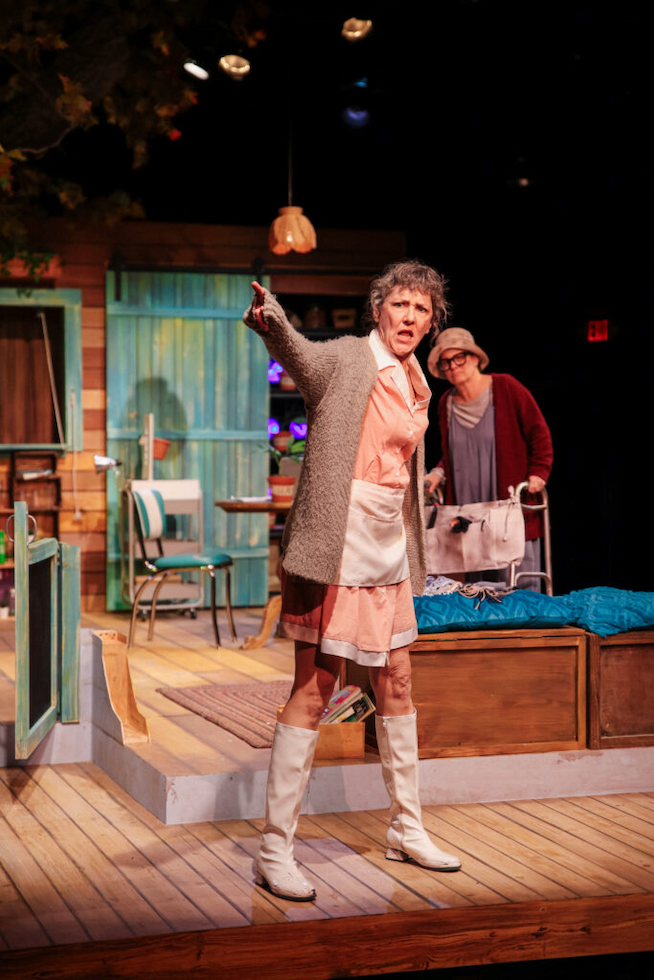

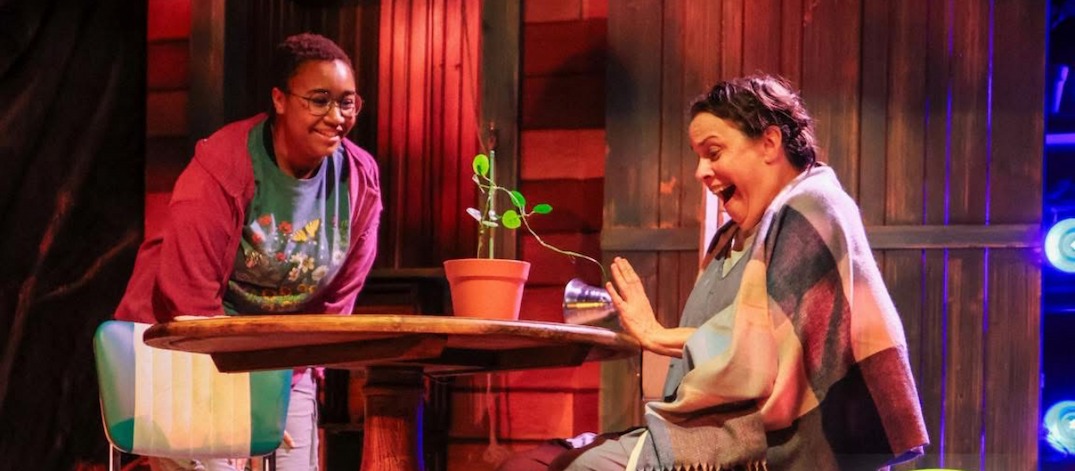
UNT Alumni Spotlight: Playwright Franky Gonzalez Shares His Story
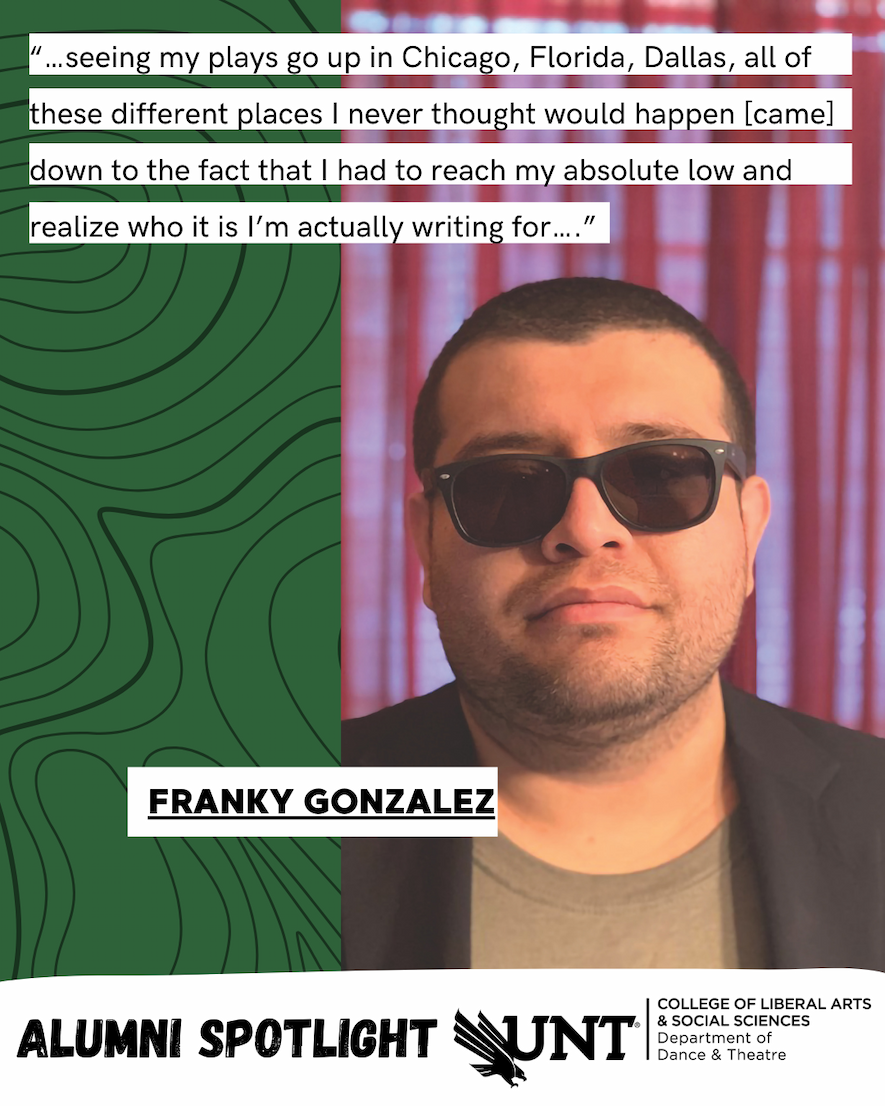
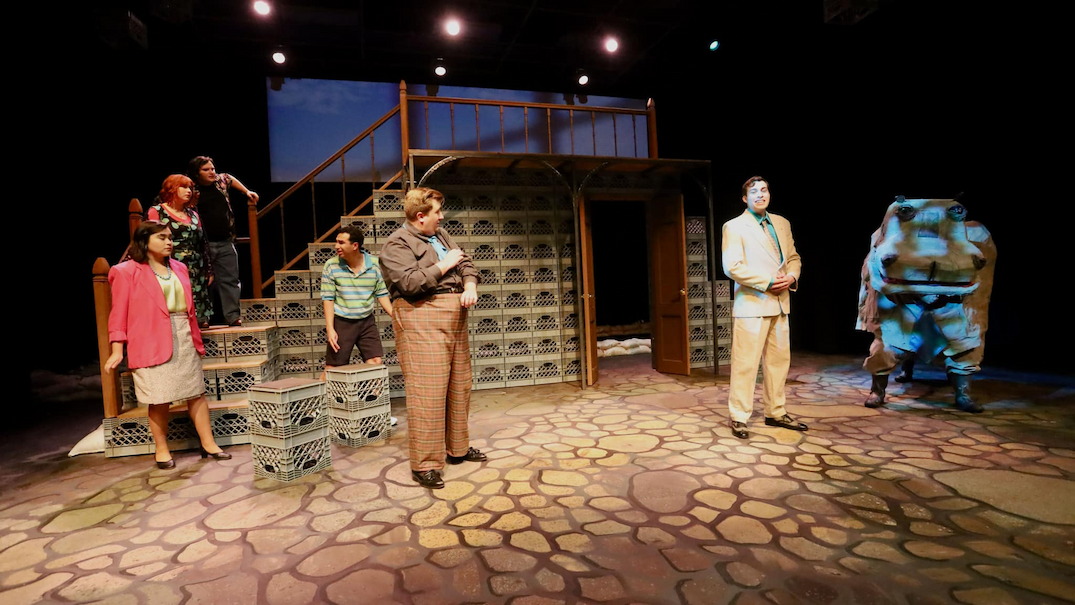
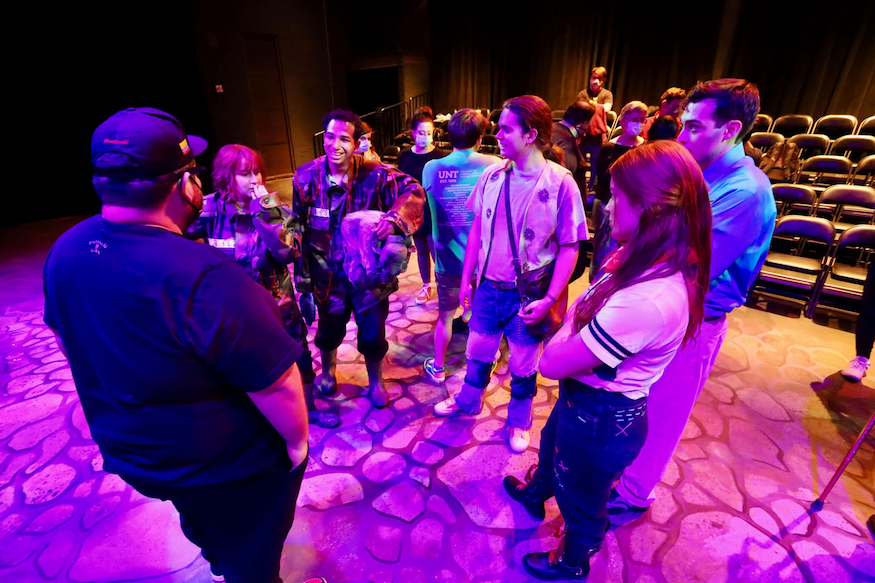

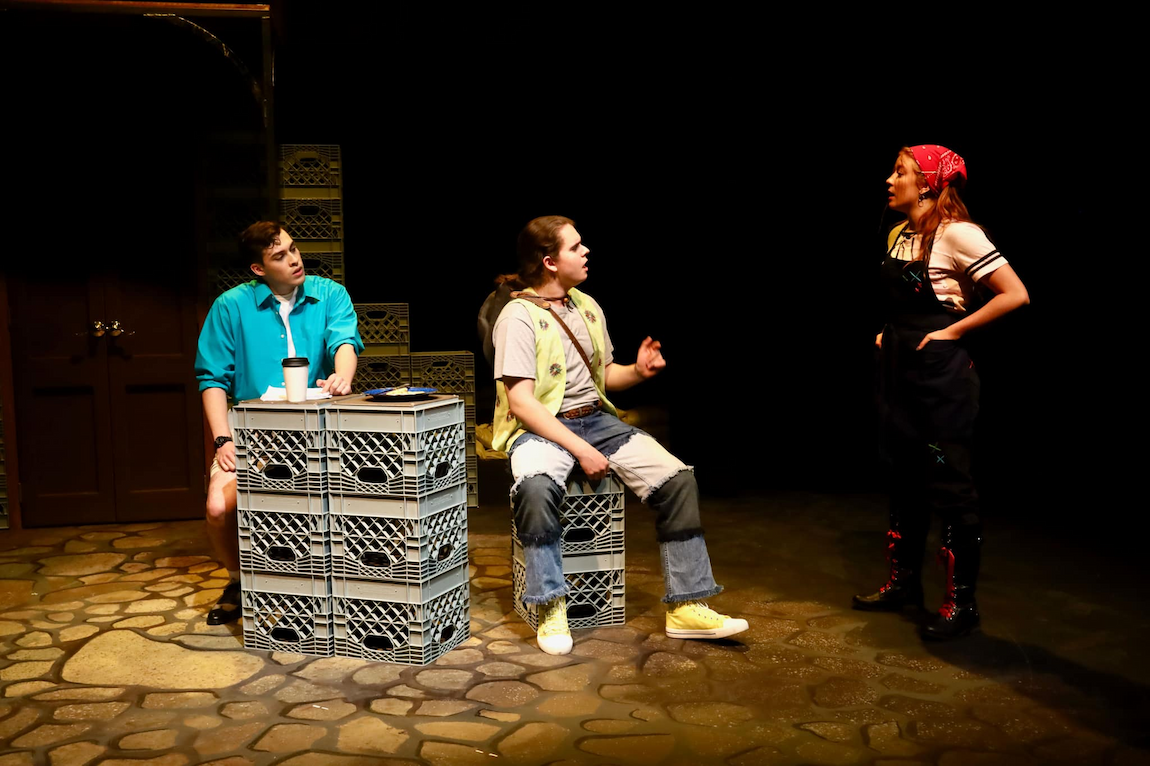
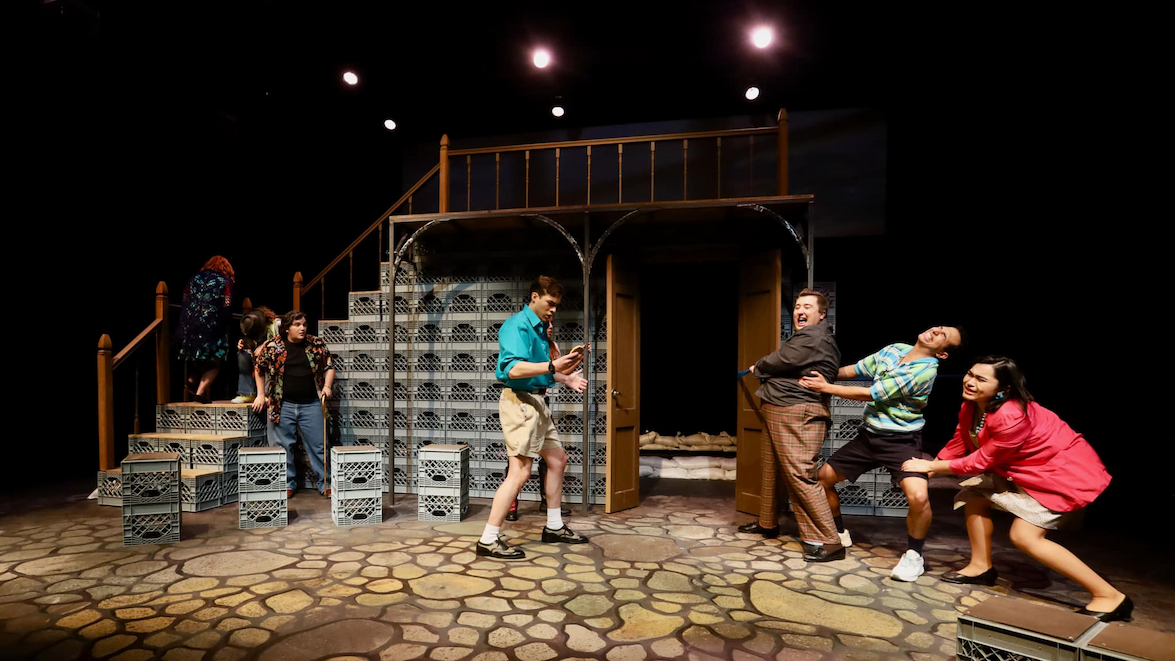
UNT alum, Franky Gonzalez, is a well-acclaimed playwright that splits his time between DFW and Los Angeles. He works for companies such as the Bishop Arts Theatre Center in Dallas and the Playwrights Center in Minneapolis. He is also involved with projects with Netflix, Sony, and Amazon Prime. Gonzalez also wrote shows like Escobar’s Hippo, which was recently performed at UNT in Spring 2022. I had the chance to sit down with Gonzalez and dive into his playwriting journey.
From a very young age, writing was something Gonzalez wanted to do. An aspiring writer at the age of four, Gonzalez was inspired by hip-hop music, originally wanting to become a rapper until realizing that he wasn’t very good as a poet. That didn’t stop him from pursuing different forms of literature. In high school, his mother forced him to take a theater class. It was in this class that he found his love of plays. Gonzalez says, “The theatre teacher… hand[ed] me three plays: Six Characters in Search of an Author by Luigi Pirandello, Blood Wedding by Federico Garcia Lorca, and Waiting for Godot by Samuel Beckett. I read those three in a night, and I knew that I found the thing I wanted to do for the rest of my life.”
Franky Gonzalez, originally from Queens, New York, came to Texas with his mom and brother in 2007. Before Texas, he and his family briefly lived in Florida until the housing market crashed. He recalls:
“...The financial crisis hit down in Florida about a year-and-a-half before the rest of the country. Around 2007, [my mother] said it’s becoming a lot like New York. So, she blindfolded herself, pulled out a map of the U.S., got a pen, and said, ‘we’ll go with God!’ She stabbed it, and she landed on Texas. And I’ve been there ever since.”
After moving around the North Texas area, Gonzalez and his family landed in Denton where he attended Denton High School. Eventually, Gonzalez applied to our very own University of North Texas, to which he says, “I particularly enjoyed the professors that were there at the time. It just made sense to me.”
Gonzalez graduated from UNT in 2013 and looks fondly over his time here. From the campus amenities to the professors and classes taught at the time, Gonzalez enjoyed his time as a student. In particular, he appreciated the flexibility of special problems courses that allowed him to choose and explore his own focus of study with direction and guidance of faculty. Gonzalez was taught by current professors, Bob Hess and Sally Vahle, who both helped encourage his playwriting path. “[UNT] was a lovely experience, and it was a great place to be able to guide and direct my own study, while also receiving that kind of classical education of Acting Styles and Design.”
Unfortunately, post-graduation did not turn out the way Gonzalez had thought. He went straight into corporate customer service jobs and struggled to get his plays widespread attention. He tried self-producing his works, but the shows flopped, and he was left with little money. He recalls a moment with his wife and son, who was born shortly after graduation. They were counting pennies to buy formula when his wife asked, “Is this theatre stuff worth it?” She left for the store to buy formula and asked Gonzalez to consider what it is that they’re really doing. Gonzalez looked at his son and remembered saying:
“I’m a failure. I’m nobody. I know you’re hearing your mom and I arguing. She wants what’s best, she does. She’s been breaking her back trying to make this thing work. I promised her that I’d become a famous writer, that she wouldn’t have to worry about anything. But, I guess I’m a liar.” Gonzalez adds, “And as I’m saying these words to my son, I realize I think I’m writing the greatest monologue I’ve ever written.”
It wasn’t until talking to his newborn son when inspiration and motivation hit. From that moment on, Gonzalez knew that the one person he would ever want to write his plays for was for his son. He began to write as if he was telling his son a story, the first work being Even Flowers Bloom in Hell, Sometimes. He stopped self-producing and started submitting his works to contests, consequently receiving invitations to places like the LARK and the Great Plains Theatre Commons. It was in these spaces that he built relationships and met agents. He said that “…seeing my plays go up in Chicago, Florida, Dallas, all of these different places I never thought would happen [came] down to the fact that I had to reach my absolute low and realize who it is I’m actually writing for….”
Gonzalez’s work mainly comes from his own personal connections and stories. One of his solo shows, Paletas de Coco or The Christmas Eve Play, shares his struggle of becoming a father over the course of four different Christmas Eves. In this play, Gonzalez shares a letter he wrote to the man he fears the most, which isn’t revealed until the end: “The revelation of it is that the man I fear the most in all the world is not my father, despite me looking for him... It is my son, whom I fear most in this world, because I fear failing him like my father failed me.”
Through his stories, Franky also explores the ideas of masculinity, particularly from a Latino perspective. Gonzalez shares, “I am a man who was raised by women, my father was not really present in my life, and I became a father not knowing what a father was. One of the things I see happen for a lot of men is they wall themselves off from honesty, from truth… They keep themselves closed off, and then it usually comes out in some sort of outburst.” In addition to exploring masculinity, Gonzalez also speaks about redemption. He hopes to lift up those who are often dismissed, like addicts, prisoners, and boxers, and shine a light on their humanity. “Just because you’ve done a crime doesn’t mean you have lost your humanity [or] your inherent goodness as a human being. Just because you’ve made mistakes doesn’t mean you are without merit.”
While faced with many years of rejections, Gonzalez used that time to network and get his foot in the door. The theatre industry is about connections and the people you know. He says, “If you want a theatre to produce you, get to know the theatre. Not just by submitting plays, ask them ‘I’d love to get a coffee sometime’ and talk about how they select their season.” Recognizing and building relationships with people you want to work with will help you in your future.
Moises Kaufman, the writer of The Laramie Project, shared some of his wisdom with Gonzalez and said, “Franky, we are all waiting for you, but nobody is looking for you. You have to find us, and you have to go on that journey.” Ultimately, Gonzalez advises that it's up to you to be the person people want to work with and to make connections with companies. “Be a part of your community, and your community will give back to you.”
Written by Wendy Schwartz
Student Spotlight: Highlighting the Hard Work of Momo Sugawara
The UNT Dance and Theatre Department houses many aspiring and fantastic artists and creators. This week, we want to highlight Momoka “Momo” Sugawara for her dedicated and hard work for this department. Momo is a Technical Theatre Major, concentrating in Scenic Design, minoring in Dance, and will be graduating this May.
Momo, originally from Japan, has traveled between Japan and Texas for her family’s work. She found her love of theatre, specifically scenic design, after taking a tech class at her high school in Texas. She says, “I was like ‘Oh my god this is so fun. This is so much less stressful, and it’s so joyful.’ Seeing my work being built, seeing my imagery, actually seeing that in the space made me like ‘Ok, I want to do this’.”
During her time at UNT, Momo has been working in the Paint and Prop Shop since 2023, where she has worked as a painter and prop artisan for many of the shows here, including Peter and the Starcatcher, The Donner Party, and Fiddler on the Roof. Momo was also Assistant Scenic Designer and Prop Master for the Fall 2024 production, Bus Stop, and was most recently the Scenic Designer for Machinal.
After meeting with Lin Roberts, director of Machinal, Momo was inspired and able to conceptualize and create her set for the show. Momo shares on her website that “meta, distancing, and abstract” were her focus for the design. She describes creating a multi-layered and square structure that gives the audience an “uncanny valley-like effect” while also having removable panels. Drawing inspiration from The Truman Show, the removable panels “[reveal] the story behind the wall. As the face is completely removed, the frame will be left, which looks like a cage that visualizes the concept of ‘Fight for Freedom’.”
Her interest in scenic design has taken her outside of UNT as she looks to travel to the many theatre conferences the U.S. offers. This past November, Momo took part in USITT Connects, a virtual recruitment event that hooks students up with potential graduate schools and summer stocks. “I talked to like 20 grad schools in two days. Talk for 20 minutes, rest for 10 minutes, talk to a different school for the next 20 minutes, rest for 10 minutes. I did that for two days in a row,” Momo comments, “I did meet some schools, and even if I’m not going there, it’s good to say hi.” Momo will be attending the USITT Conference this March in Columbus, Ohio.
Momo also attended the Southeastern Theatre Conference (SETC) last year, another theatre conference for college students. While USITT focuses on the new tech elements and gadgets, SETC has a stronger focus in design. “I went last year, and that is how I met the grad school I am going to, and that’s how I found my summer job in Interlochen, Michigan. They have a lot of opportunities for designers. They hold some auditions as well, and maybe a little of tech theatre things, but it was mostly design focused.”
After graduation, Momo will be attending the University of Nevada, Las Vegas (UNLV), her first pick for graduate school, where she will continue her work in Scenic Design. Grad schools can offer many future opportunities for students, which was something Momo looked for. “They not only do ‘traditional theatre’ but they have a lot of entertainment stuff. I thought I could experience a broader type of theatre designing.” After talking with some of the students at UNLV, she discovered that the school focuses more on learning through experience rather than focusing on a traditional classroom setting. Rather than scenic design being merely a class that students can take, UNLV focuses on providing more hands-on experience for individualized learning.
In addition to her work in theatre, Momo is also a dance minor. She recently performed in Antares Ewell’s piece, “Joyous,” in both the New Choreographers Concert and the Spring Dance Concert. Worlds collide when having to focus on both a dance concert and scenic design. “When I’m doing dance, I concentrate a lot on class time or rehearsal time, and when I’m out of that, I’m in theatre mode,” Momo chimes. “For SDC, I was working in the shop until 5:55 or 5:58, and then run to the [University Theater], and like ‘okay, I’m a dancer now’.”
Though she has been involved in dancing for many years, Momo’s passion lies in theatre and scenic design. She says, “I do enjoy dance, but when I think [about it] as a career… maybe I’ll do it as a hobby or as fitness….” Momo hopes that her master’s will help her find work in the States but will someday return to Japan to help grow their theatre industry. “I do want to go back to Japan to share my experience and help evolve the theatre in Japan, but for a couple of years, I want to keep experiencing.”
We are very proud of Momo for all her hard work in the department and give her our best wishes at UNLV! Check out her website (www.momosugawara100.com) for more of her incredible work.
Written by Wendy Schwartz
Photos by Rebecca Ramos
Photos by Cesar Valdes
Photos by Skyekat
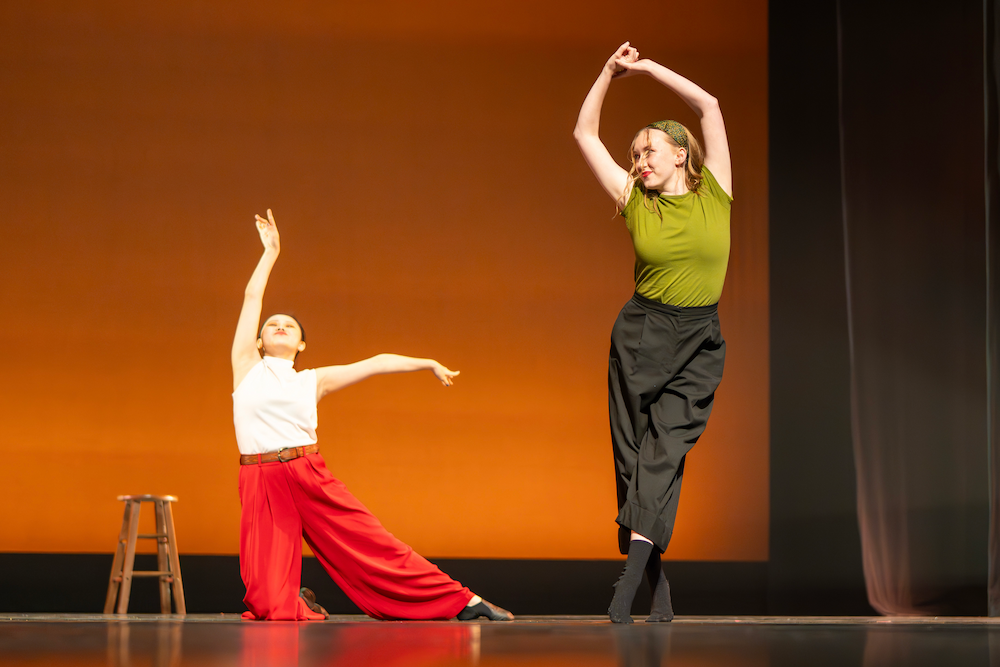

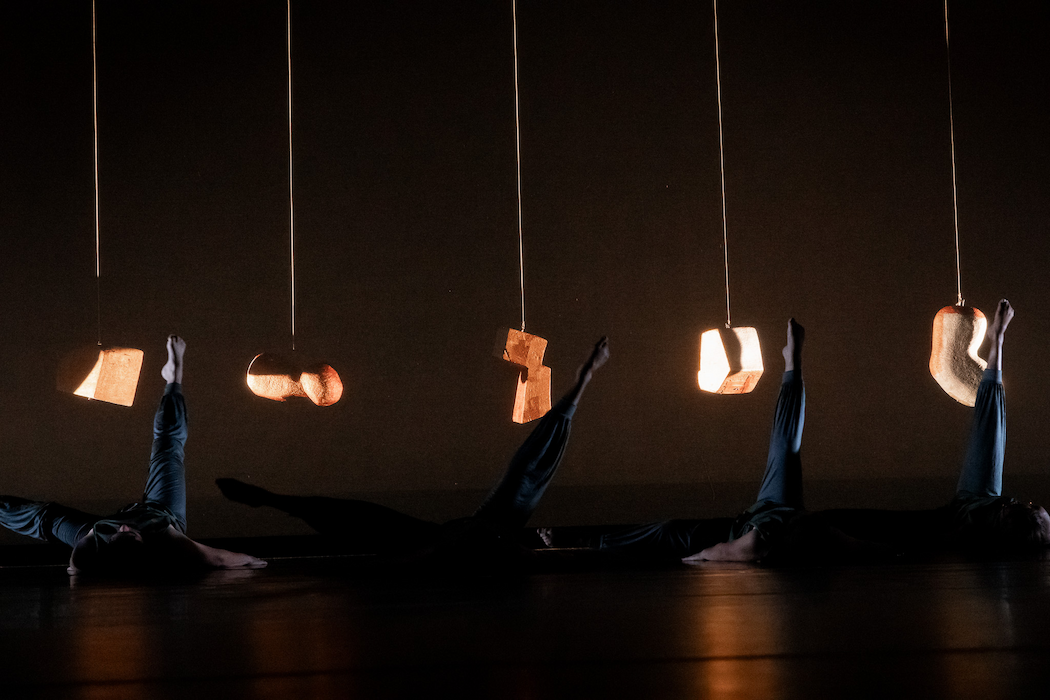
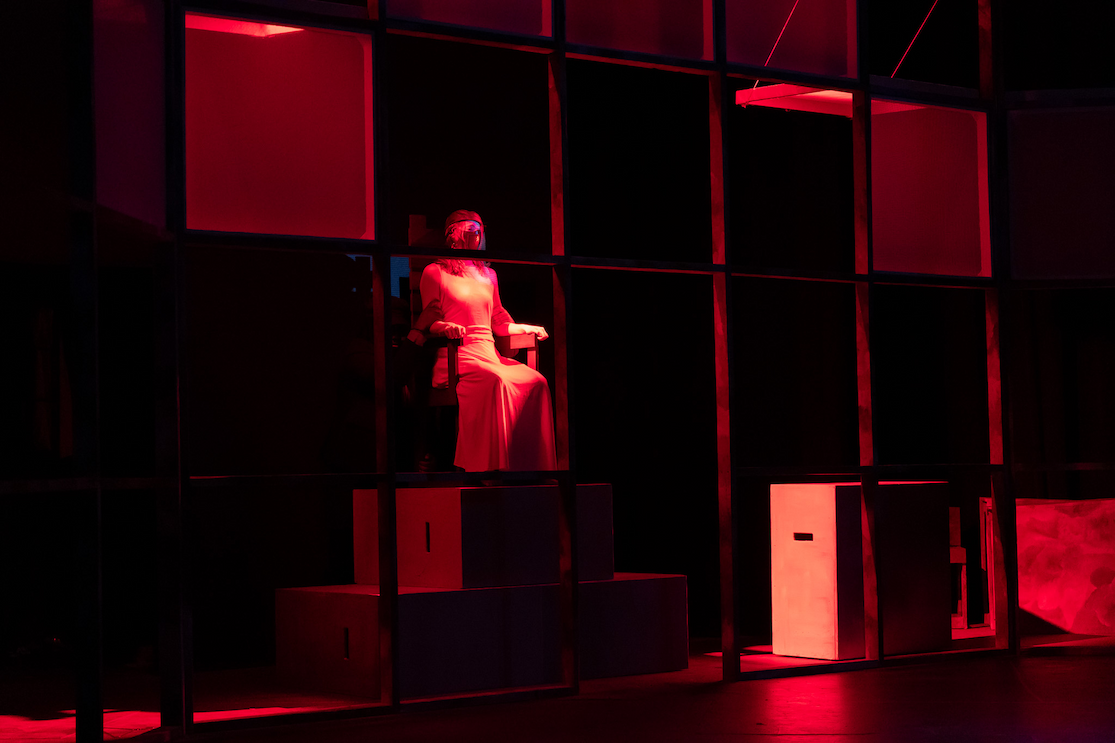

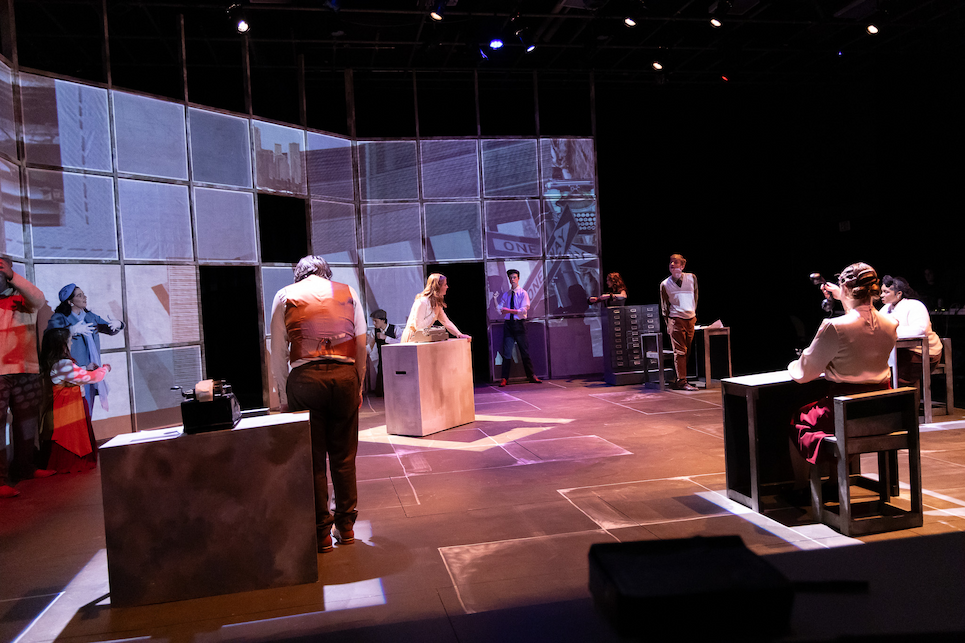
The Directors Cut: A Look at This Semester’s Student Directors
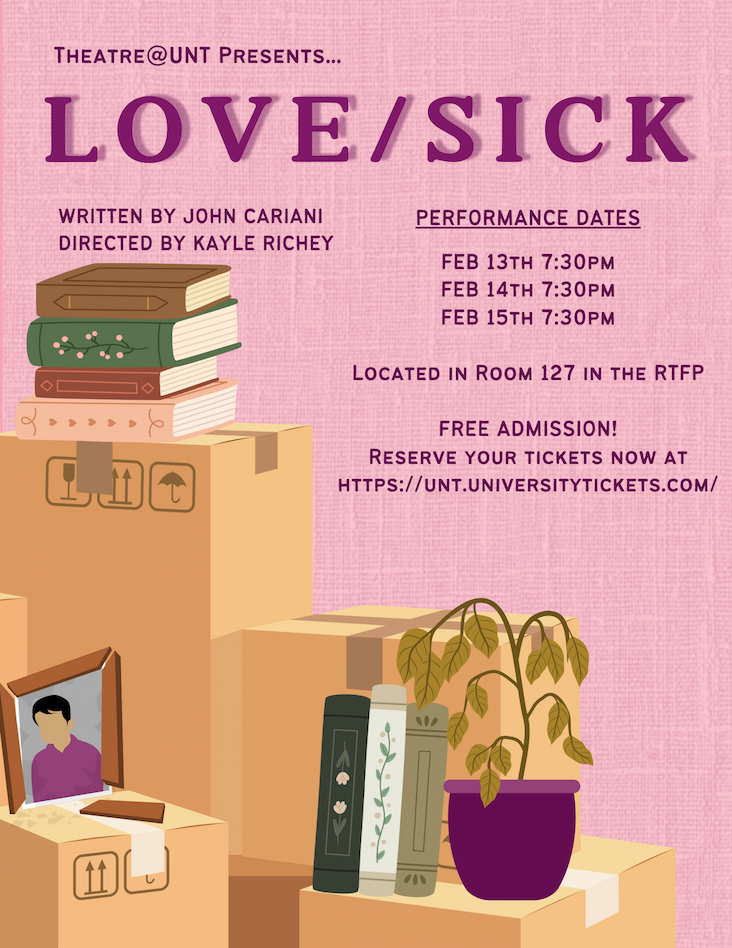
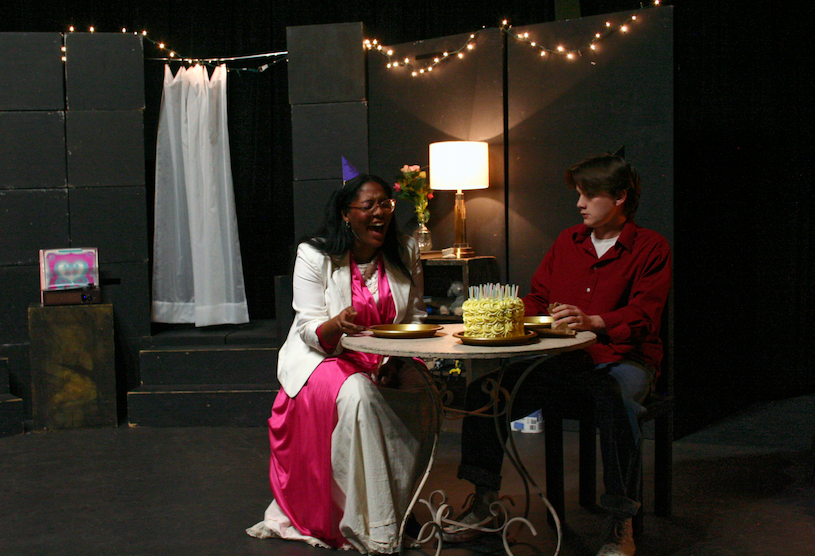
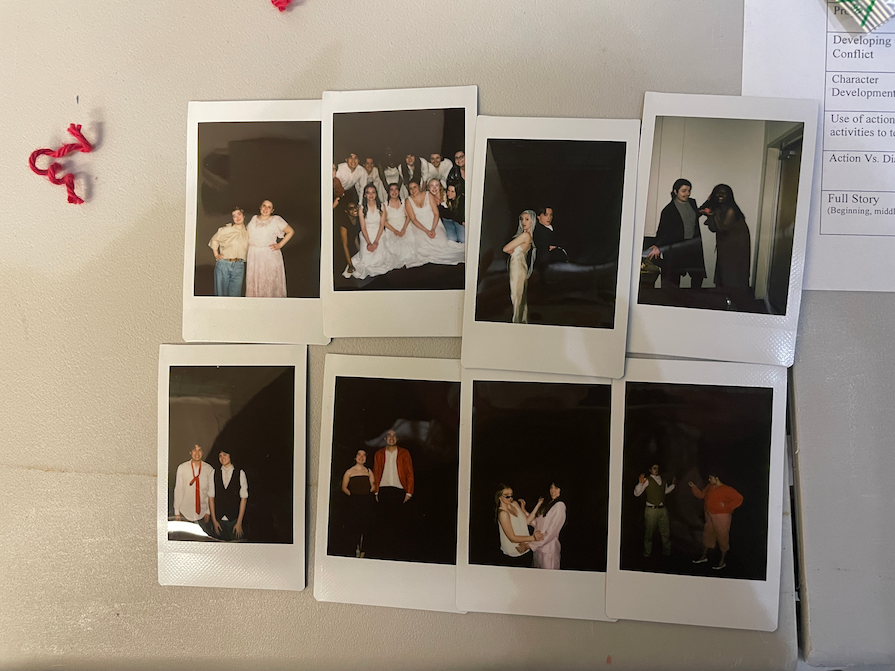
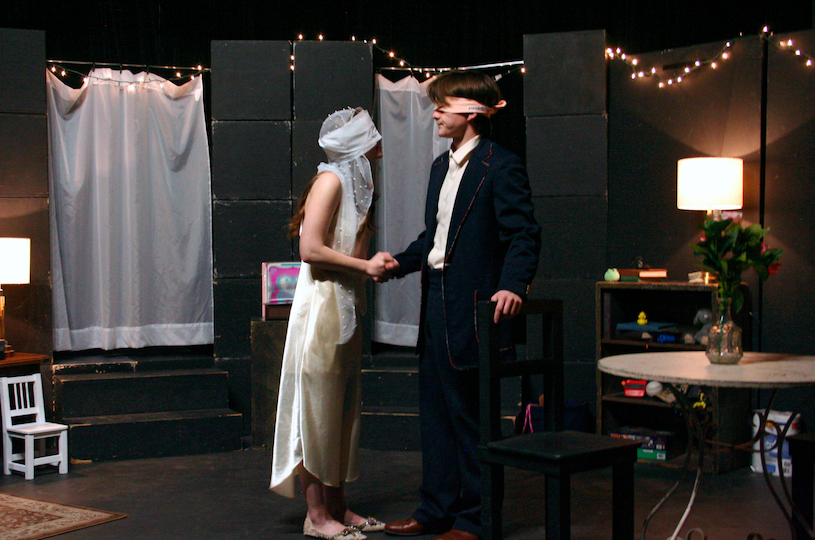
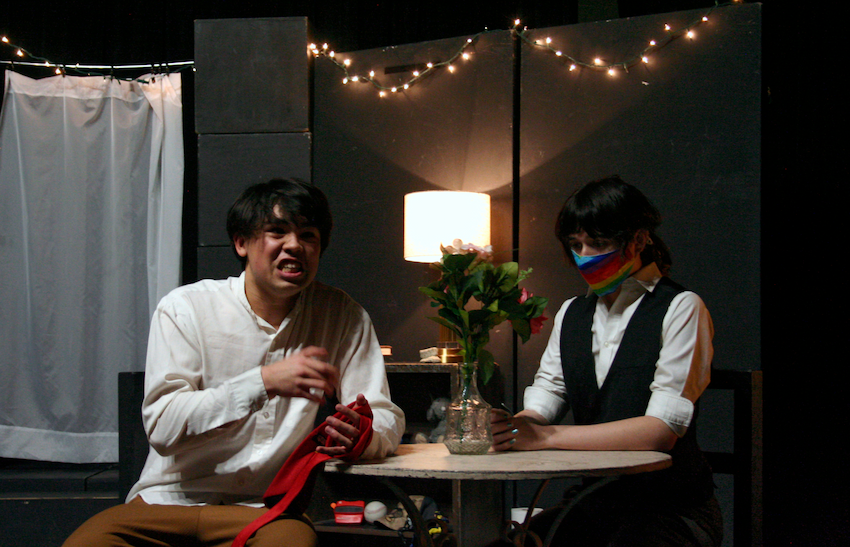
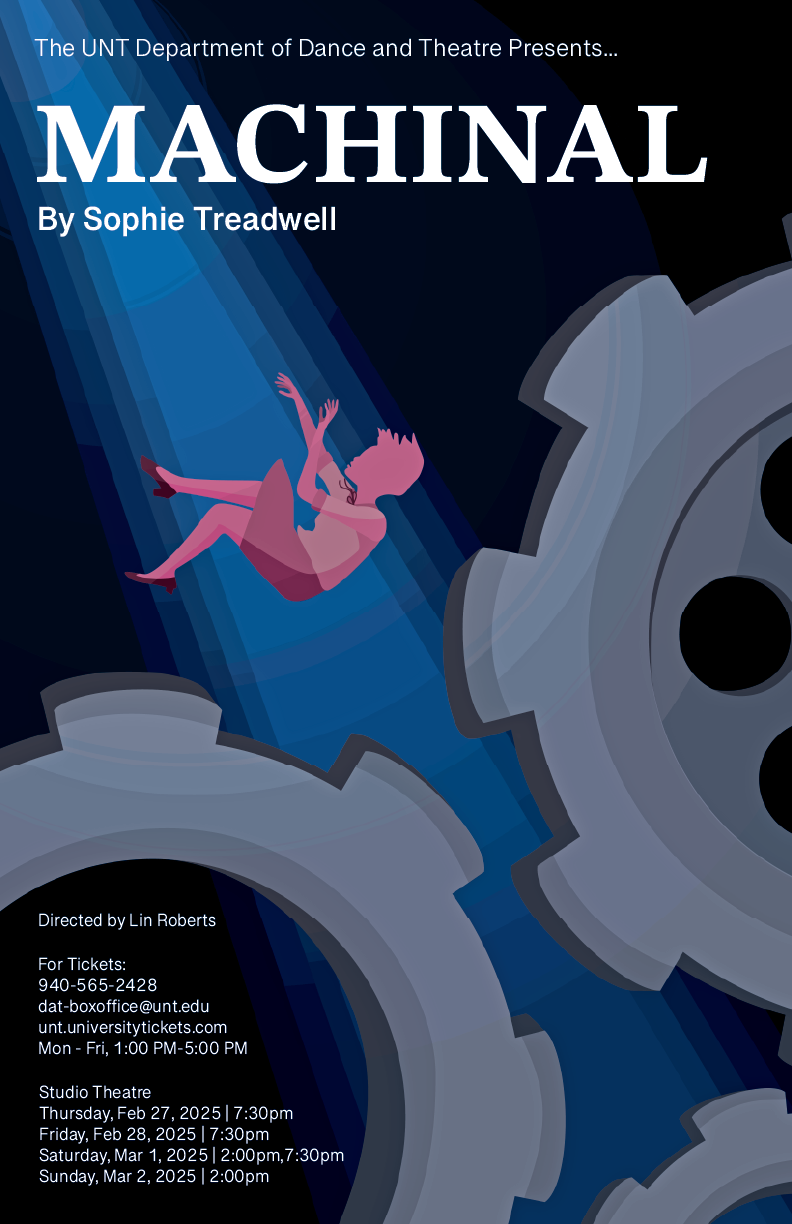
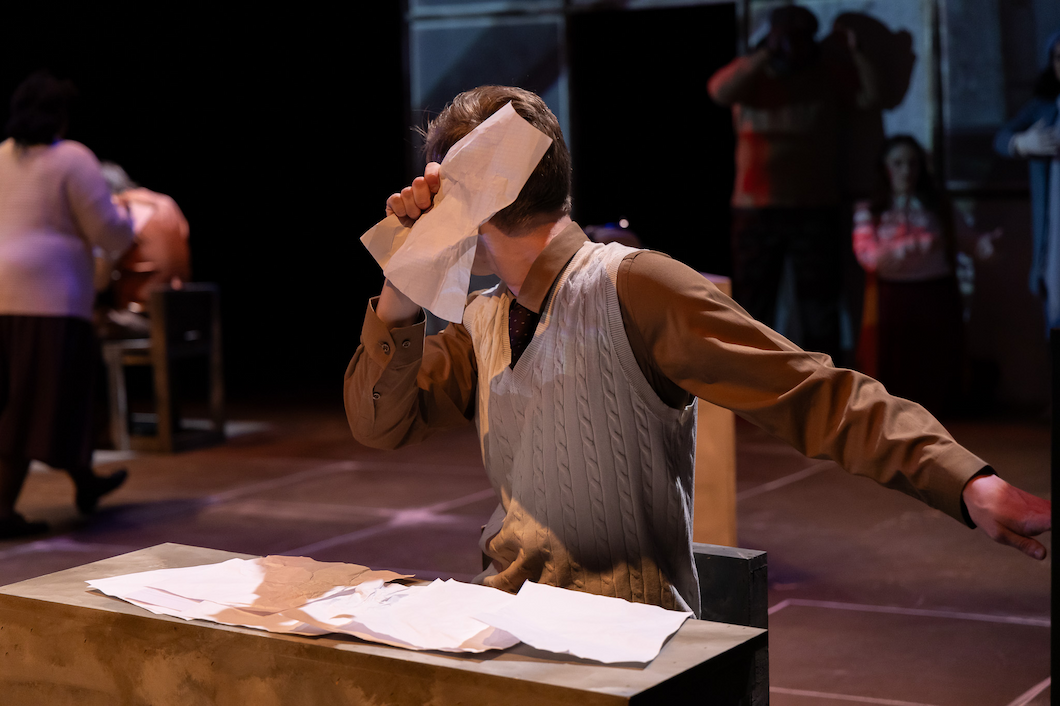
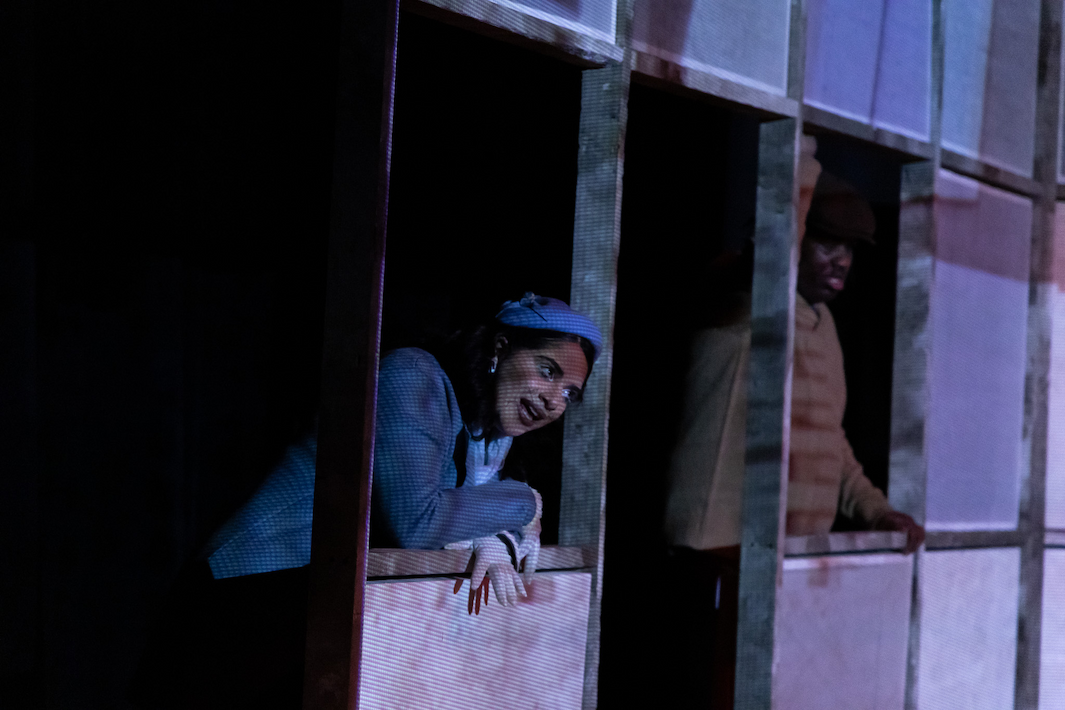
Love/Sick
Love/Sick, written by John Cariani, was performed on February 13th-15th. The show was directed by Kayle Richey, current Theatre Major, as part of the First Stage Series. First Stage Series gives students a chance to direct their own show for the department but with a very minimal budget. The process of proposing a First Stage show starts with having a show in mind, then you fill out a form with all the logistics, including the number of actors, where and when it takes place, as well as explaining the students’ concept for the show. The proposals are then reviewed by a committee of faculty members. Richey explains:
“[The committee] wanted to see that we weren’t just doing the play as it’s written [and] that we weren’t just putting bodies on stage and doing a show. They wanted to see that we had a creative idea and a story we wanted to tell. That we had a passion.”
This is Richey’s last semester at UNT, and she will graduate in May. She has performed in a production almost every semester since starting in the Theatre program, including Fiddler on the Roof, Book of Will, and Pride and Prejudice. Richey’s first experience with the First Stage shows was also through performance. In her junior year, Richey took part in First Stage’s Elephant’s Graveyard directed by Sam Jack, playing “Young Townsperson,” and in Black Snow, directed by Cade Roberti, playing “Ilchin” and “the Fat Man.” Apart from her directing class, Love/Sick will be Richey’s first full show she has ever directed.
Love/Sick features nine scenes, each showcasing a different couple dealing with their own unique struggles. “It shows real couples really struggling with life issues, along with a deep love for one another,” Richey comments. Having a full year to conceptualize her show, Richey went through many different concepts along the way. “Our original concept was going to be reincarnated lovers, as if each of the characters become the next characters. Two people in a lifetime destined to not be together, then it became two people in a lifetime who are destined to meet, teach each other something, and then not end up together,” she says. The final concept was portrayed by one of the characters in the final scene, Emily. Inspired by Richey’s love of romance novels growing up, she decided that Emily also grew up loving the same type of stories.
Throughout the show, each scene is a depiction of a novel Emily has read, leading up to their own story.
Each director has a unique creative process. With Richey, her creative ideas are cultivated and expressed through Pinterest. She uses the site to articulate ideas to her cast, especially since she prefers to see ideas visually. Pinterest also became useful when her advisor, adjunct faculty member Nathan Autrey, gave “direction of finding images and ideas that can represent the concept in the way of ‘How does this scene smell? How does it taste?’ and all those five sensory factors, which is something we touched on in Lisa [Devine]’s directing class.”
The creative process continues through rehearsals, as actors discover the characters for themselves. One of Richey’s main focuses for rehearsals are the characterizations as this show is about the deep connections between each couple. Through the show, the audience meets different couples who are all at different stages in their relationships. Richey comments:
“Some of the couples we’re meeting them the first time they meet each other, [and] some of them we’re meeting nine years into their relationship. [We discuss] what that history is like for them, so that way we are watching two people who deeply love each other and know each other, and not two actors just reciting lines at each other.”
Richey’s love for the show goes beyond the scope of romance and into her passion for theatre and storytelling. For Richey, Love/Sick was her love letter to the department. Being in her final semester and after performing in so many shows here, this final project of hers was an outlet to express her love for her previous shows. She says, “I’ve gotten to work with so many great people here, and I’ve gotten to tell so many cool stories, and I tried to include as many of those pieces of those stories to my set. There’s set pieces from Pride and Prejudice, Elephant’s Graveyard, Black Snow, on the set. I wear my Book of Will ring everyday when I’m at rehearsals.”
But ultimately, Richey had always felt a deep connection with this show. Love can be a complicated subject, and while facing her own struggles, Richey wants her audience to understand that maybe those struggles happen for a reason; she believes that even the difficult parts of relationships can teach us something, that “love always has its purpose.”
Machinal
Meanwhile, rehearsing a few doors down in the studio theater, another show is in the works. Running February 27th-March 1st is Machinal, written by Sophie Treadwell, and directed by Lin Roberts. Roberts is also a current senior graduating this May and was given the chance to direct as part of the Lab Series, a continuation of the First Stage Series. Previously, Roberts performed in UNT Theatre productions of Anatomies and Donner Party, as well as performing in various scenes from the directing classes.
Her directing experience came well before joining UNT, starting as an assistant to her high school director. She stated, “I kind of enjoyed it. I didn’t quite know what I was doing.” She continued directing scenes in high school, culminating in her senior showcase, which led to Roberts having doubts about herself:
“I did my best, and I tried. So for a long time I had imposter syndrome, but luckily I had a really good therapist who was able to talk to me about that, who was like ‘You saw the growth, and you were proud of the growth your actors were able to accomplish. Why does everything else matter?”
Moving into college, Roberts reluctantly continued her directing work through the Directing 1 class, taught by Professor Marjorie Hayes. “There was more direction in how to direct, and there are so many talented people here at the university, and they’re all willing to listen. But even then, I still didn’t think I was a good director,” Roberts continues.
But that didn’t stop her from continuing to direct. She was encouraged to apply to the First Stage Series by Professor Hayes, and though she was hesitant, she submitted a proposal. Roberts decided to pitch Eurydice as her show since she performed it in high school and had also worked on the show in directing class. In directing Eurydice, Roberts felt that her imposter syndrome weakened: “I can’t be an imposter if I actually did it. And that flung open the doors, and I marched right on in.”
Students who previously directed a First Stage show can continue directing as part of the Lab Series. With the First Stage Series, directors make their own designs for the set, props, lights, sound, and sometimes, costumes. The Lab Series, however, is a step up, where students get to run the show with a full production team behind them. Roberts is one of the first students to direct a Lab Series in a long time. She stated that after directing Eurydice, “I wanted more, I wanted to do the next thing. Nathan Autrey...talked about Lab Series quite a bit…so I [knew] that I had a whole year and a half left. I was like, why not?”
Machinal was quite a step for Roberts, compared to Eurydice. The pressure of directing a show with the same expectations that faculty and guest directors have was a challenge for Roberts to face. Though she created the set, sound, and light design for Eurydice, as well as acted as her own stage manager, she felt that she had a “safety net.” With Machinal, she feels grateful to have a cast that is not only talented but invested in the work. However, she feels as though the same safety nets are not there. She explains, “I am being treated as a professional, [and] I have the same authority and team and responsibilities of a director that’s been coming in here for ten plus years and says they want to do a show.”
While she feels that the bar is higher for her, Roberts is pushing past and feeling great about where she and her team are at. Roberts describes Machinal as “the story about an ordinary woman who murders her husband.” It is based on the true story of Ruth Snyder, who was the first person to be executed by electric chair after murdering her husband. Roberts explains:
“It’s expressionistic theatre, which is a lot different from what we’ve done. The only character that’s almost more than two-dimensional is the main character… You get into the inner workings and the inner thought process of the young women, which I find incredibly fascinating.
While the show has yet to come out, Roberts shares what she thinks the audience should get from the show: “When you are backed into a corner and oppressed past the points of words mattering, sometimes you’ve got to be radical.”
Congratulations to the cast and crew of Love/Sick for a wonderful show and get your tickets now for Machinal!
Written by Wendy Schwartz
Shining a Light on New Equipment in the RTFP
The UNT E-Shop staff was hard at work over the winter break installing new lighting systems into the RTFP 127 and 130 classrooms! The new system has implemented LEDs which allow for color washes and more complex looks with the lighting setup in the classrooms. This opens new opportunities for classes, student directors, and student designers.
Its intended purpose is educational usage and First Stage productions. Furthermore, it aims to expand opportunities for lighting designers in the department. With only three plays and two dance concerts per year, student lighting designers have previously had very few opportunities. With the addition of an LED lighting system into RTFP 127—one that isn’t just an archaic set of switches in the wall—new doors are opened for prospective lighting students to design for the First Stage season.
RTFP 127 and 130 still have the strip plates that we, as students, have become accustomed to using. The new LEDs will be usable through monitors set up in the classroom that involve a USB attachment. The attachment loads the same program that’s run in the main theatre spaces, just adapted for digital screen use rather than the average light board.
The development is very new, so many things are still a work in progress, such as who can use the programs, how students will use them, and how to educate on the use of lighting systems. The shop is currently working on an instructional guide to using the new system, as well as continuing to make improvements to the system itself. There will be a bit of a trial-and-error period as we settle into using our new resources.
Again, a huge thanks to our wonderful E-Shop staff, Oso Padilla and Taylor Post, who worked dutifully over the break to install the new fixtures. They were allotted a week to load in and hang new fixtures, and because of their work, Love/Sick directed by Kayle Richey was the first student directed production to use the new lights!
Written by Carver Olson

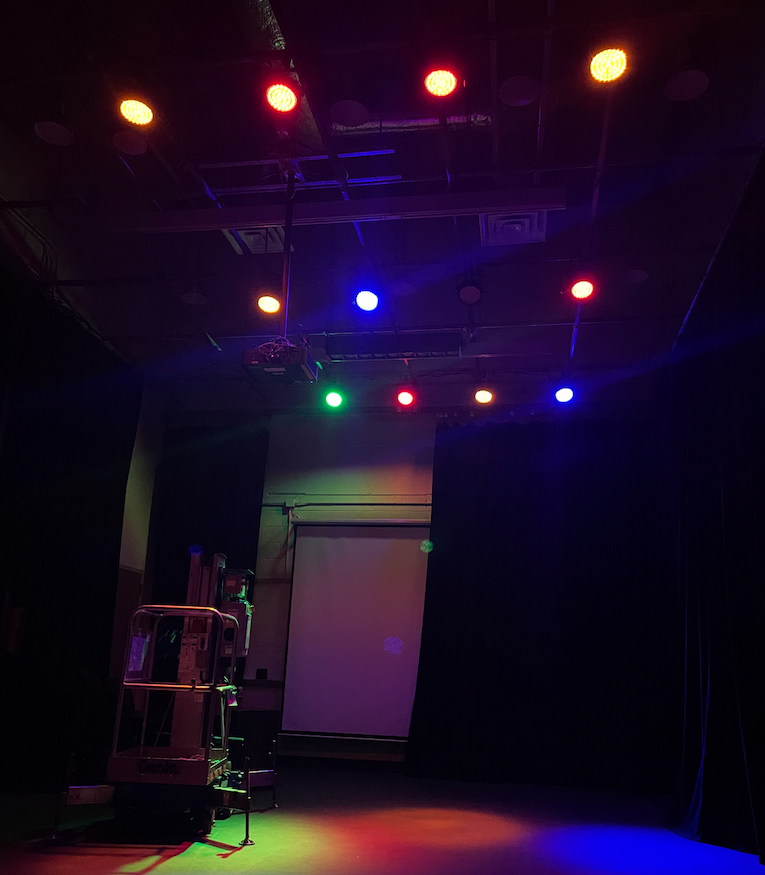
Heart and Sole: The Dedication and Craft of UNT Dance
The UNT Dance and Theatre Department presented their annual Spring Dance Concert (SDC) this past week, running February 6th-9th. SDC featured a variety of works choreographed by the department’s talented faculty and students, as well as featured guest artists. “The pieces are really strong,” comments Daniel Garcia, Dance Adjunct and Rehearsal Director for SDC. “There is use of props, different styles of dance like ballet, contemporary, hip-hop. There is an overall emotional story, where pieces build and fall in energy. Each audience member is able to get a different experience.”
Among the choreographers is Dance Adjunct and UNT Alumni, Jocelyn Schimpf. Teaching at UNT since Fall 2021, she has taught a wide variety of classes, this semester including Ballet 6, Laban Studies, and History of Dance. Schimpf is back choreographing for SDC for the third time, with a tap and contemporary fusion piece, titled Prisma. “It may seem very chaotic, but we want the audience to see the fun and community within it,” chimes Schimpf, “students putting their heart into each piece, how they move and interact through the stage, and how they share that love and passion with the audience.”
The student choreographers chosen for SDC are also chosen to participate in the American College Dance Association (ACDA) Conference. The ACDA Conference hosts students, faculty, and professionals from across the country to showcase their work and gain outside experience and feedback from their peers. “It is a platform to push student work,” describes Garcia. This year, the conference will take place at Texas State University on March 12th-15th. Through an adjudication process, students submit and present their work to a committee consisting of two faculty members and two student representatives, which get put to an anonymous vote in which dance students partake. The committee then comes together to select the submissions, taking account of votes as well as what they feel best represents the school.
At the beginning of the year, there is a formal audition for SDC that is open to all Dance Majors and Minors. Ava Townsley, a current senior graduating in December, is performing in three of the show’s pieces, including one as an understudy. She comments on the audition process:
“There is no preparation needed. You come in and warm up, and then there are two to three sections of the audition: there’s a ballet section, a contemporary section with partners, and then a more ‘worldly section’ with jazz and hip-hop. Then [faculty and guest artists] decide based on availability, and of course, who fits best for each piece. You pretty much come in blind-sided. It’s a very professional process. You learn and gain skills, even if you don’t make it in.
One student adjudicated for ACDA, and presenting her piece Imperceptus in SDC, is Camille Williams. Williams is a Senior, Majoring in Dance on the education track, and is currently a student teacher in Carrollton. “Growing up, my mom always thought I’d be a choreographer,” Williams comments.
For Imperceptus, Williams looked for dancers with a solid foundation of ballet. “My piece is very light and angelic. I wanted someone with soft qualities, but also someone who will come in at 7am and do the work and won’t flake.” Despite the early morning rehearsals, the process for her dancers is still enjoyable. “No one is in the building. We just sit and get to know each other.”
When asked about what this piece means to her, Williams explains,
“The meaning of my piece is very centered around the future and the unknown, which is inevitable for the human experience. Do you resist or surrender? It comes from personal experience. I transferred to UNT and switched to dance, which was a big unknown moment for me. I used that personal experience to create the piece.”
We congratulate all the choreographers, designers, and performers in SDC, and send
best wishes to those performing at ACDA!
-Written by Wendy Schwartz
- Photos by SkyeKats Photography
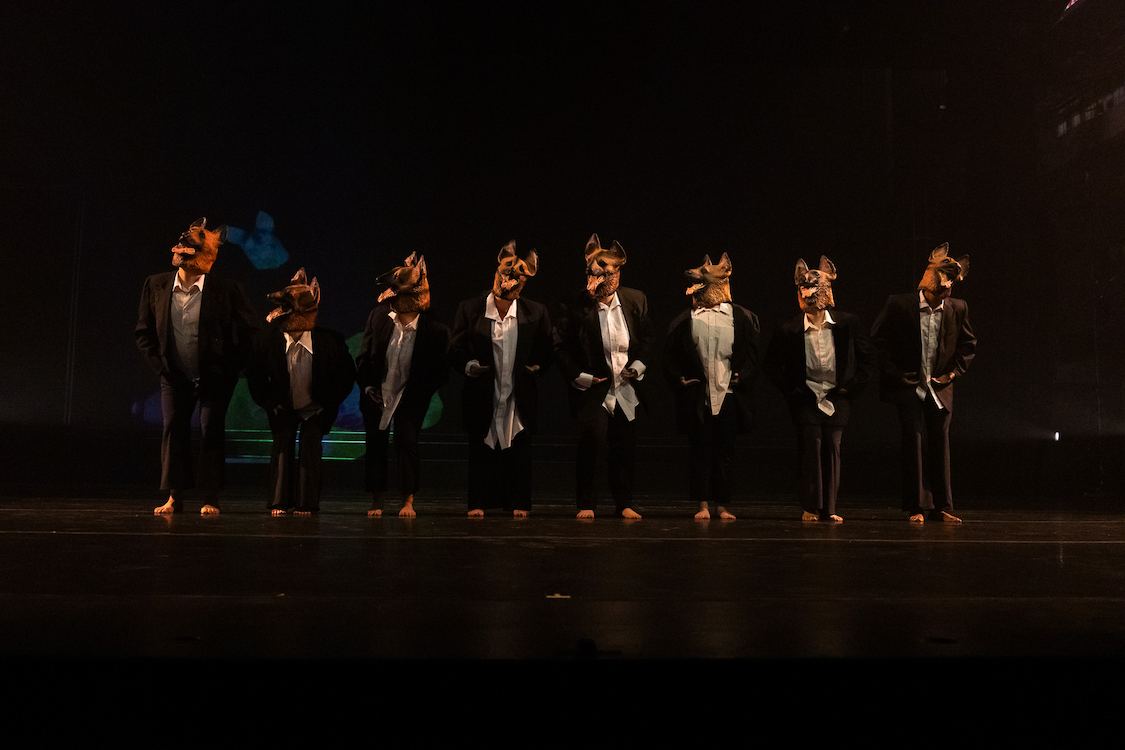
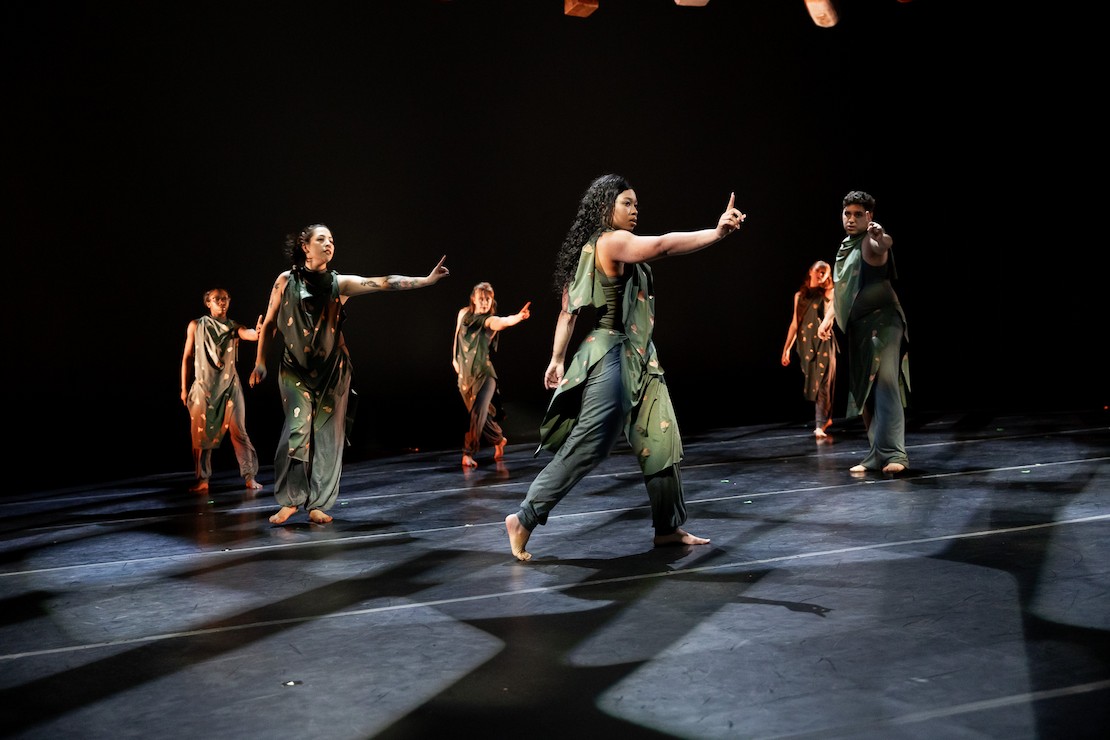
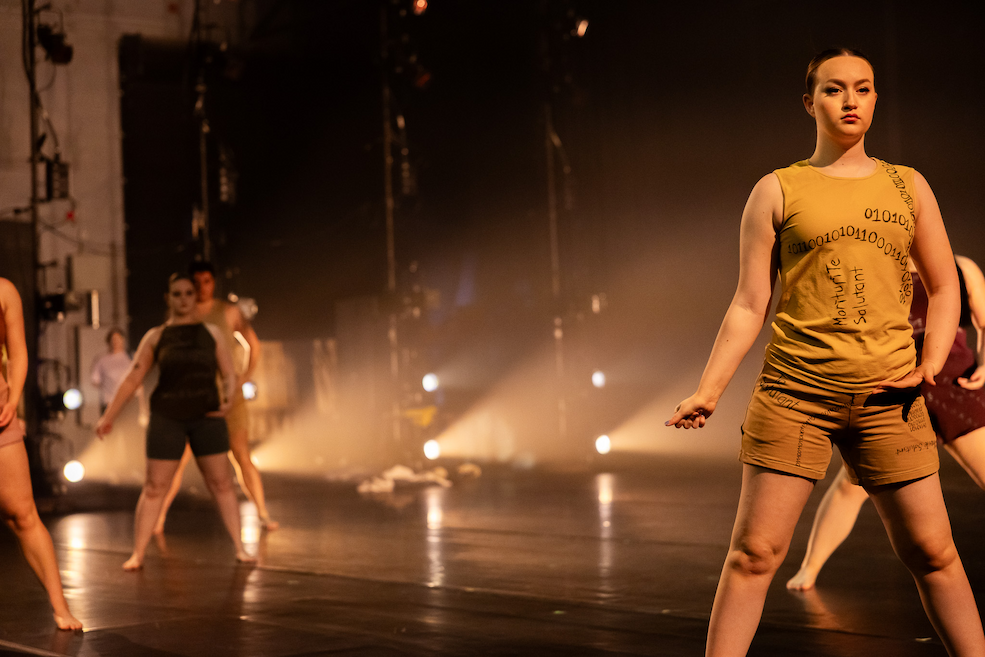
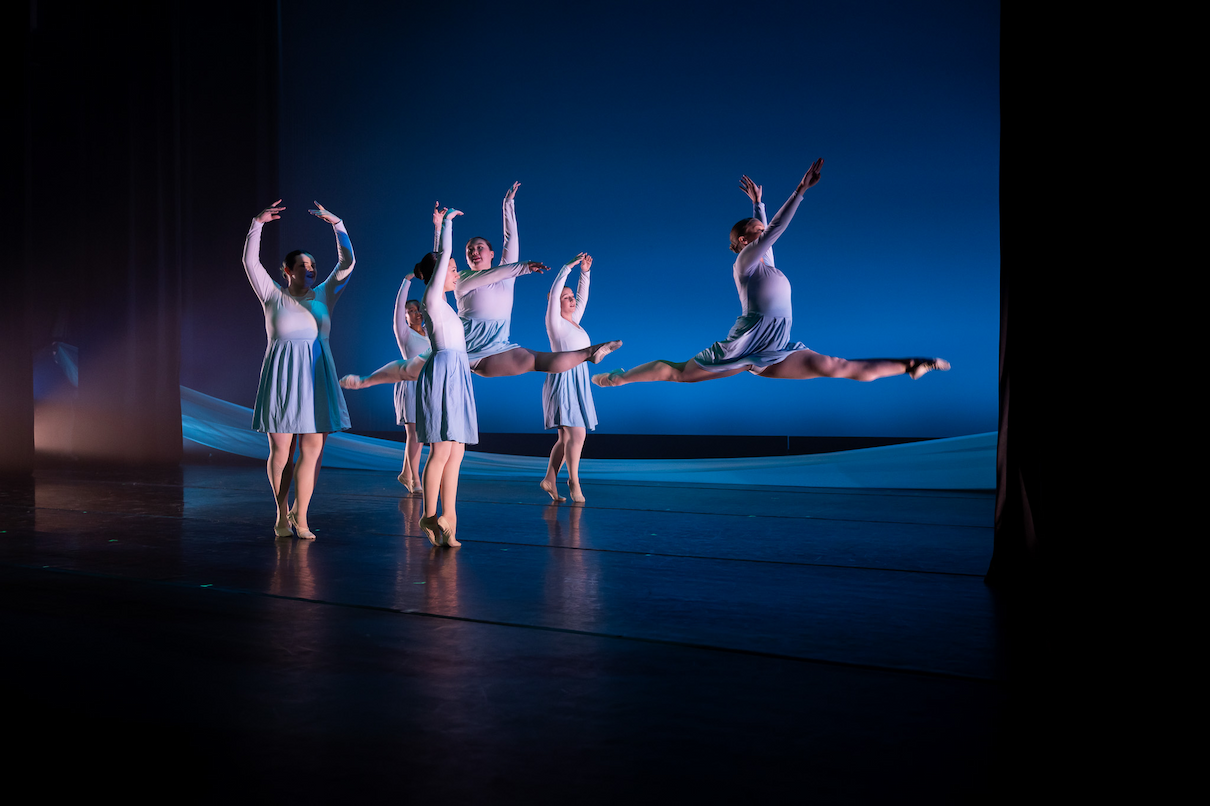
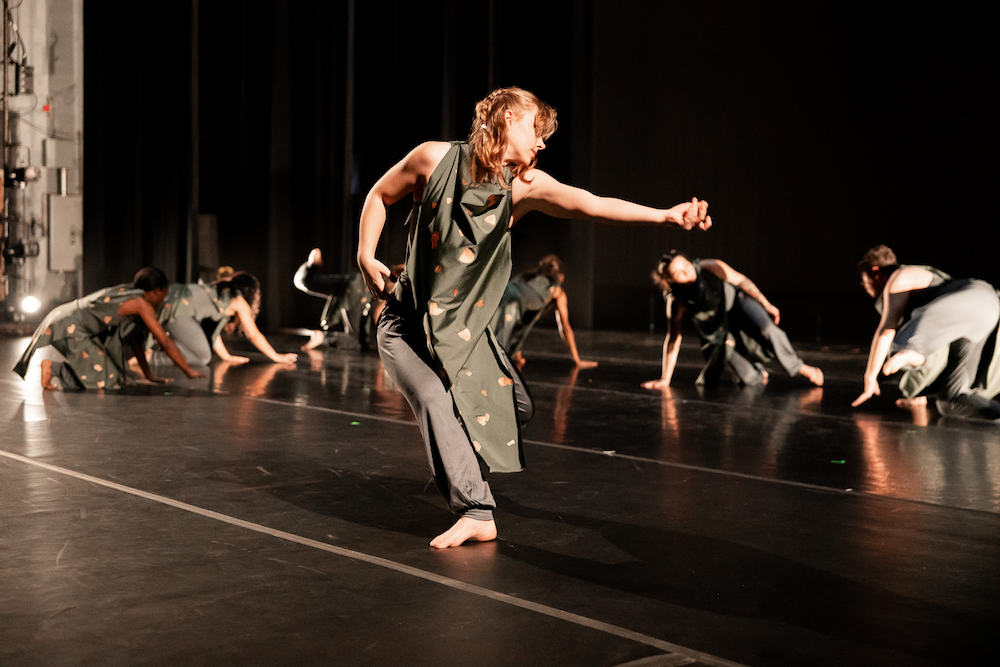

UNT Faculty and Alumni Take the Stage with Shane at Dallas Theatre Center
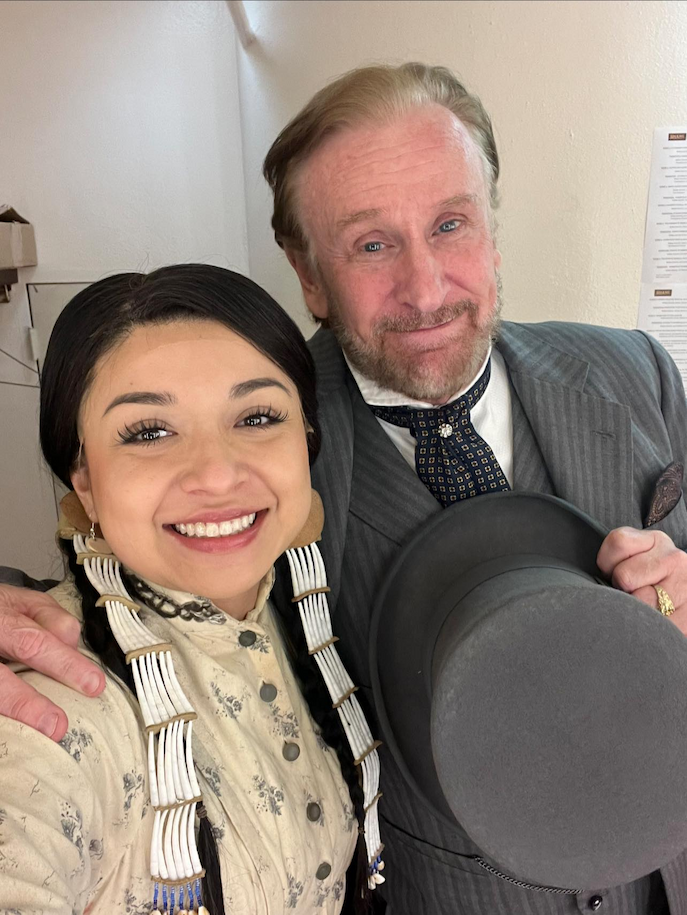
Dallas Theatre Center’s latest production, Shane, is an adaptation of the 1949 western novella of the same name about the Range Wars. The stage adaptation by Karen Zacharías had its premiere in August 2023 at the Guthrie in Minnesota. Zacharías’ adaptation reexamines the assumptions and allure of the Wild West—its fantasies, myths and values—and creates a new point of view of the classic story of Shane. It examines the forgotten voices of the true Wild West—the People of Color and Native Americans who shaped the American West—but are erased in the John Wanye-esque ideals of Hollywood and the American cowboy myth. The production and its themes are incredibly timely.
Running from Jan. 31st-Feb. 16th, you will find UNT faculty members and alumni as production members of Shane: Professor Bob Hess as Luke Fletcher, Professor Laura Berrios as Assistant Stage Manager, and UNT Alumni Stephanie Delgado as Winona Stephens. The production is receiving rave reviews. DFW Center Stage says to “forget all those western cliches and prepare yourself for a supremely entertaining evening of theater.” Dallas Weekly’s Aaron Zilbermann says the fresh perspective “leaves us walking out of the theater reminded of why we love these stories in the first place.”
Dallas Theatre Center is one of the very few theatres that works under the League of Regional Theatres (or LORT) in DFW and is the largest in North Texas. Dallas Theatre Center produces around five to six shows per season, as well as holds public works such as community workshops, a flagship education program, and master workshops. Shane is the third show of their current season.
I got the chance to speak with UNT Professor of Acting, Bob Hess, about his experiences with Shane. On top of being a full-time professor at UNT, Bob is one of the 10 resident actors with Dallas Theatre Center. He was Scrooge in A Christmas Carol earlier in the season, as well as Mina, Dr. Helsing, and others in Dracula: A Comedy of Terrors. When I asked him how he does it, he said that it is an exercise in time management. “It involves careful time management and a support system that understands that I can’t be two places at one time. Dr. Wolverton (the UNT Dance and Theatre Chair) … values the importance of what I do as an artist with my creative research and how it makes me a better teacher.” Prof. Hess takes on the role of Luke Fletcher, who he calls a “particularly greedy character who wants to own everything.” It’s hard to imagine him as anything other than the kind professor we know and love… But he’s a consummate professional at his craft.
Shane is an incredible story about caring for each other and the world we live in
and flips the narrative in a necessary way to tell the stories of our predecessors.
Our Theatre faculty and UNT Alumni are remarkable professionals and work incredibly
hard in pursuit of their artistry. Go out and see Shane and support live theatre and
our UNT Dance and Theatre community!
-Written by Carver Olson